+255 763 058 584 +255 682 784 150 [email protected]


What Is Safari?
What Is Safari? Everything To Know About An African Safari : What does the word “safari“ means, and where did it originate? In what ways do safaris from the past differ from contemporary African adventures? For the finest experience, where should I go?
Safari is…
When we hear the word “safari“, we picture a group of travelers traveling over the savannah of Africa in pursuit of big wild animals like elephants, buffalo, rhinoceros, and lions. Images from the past typically depict guys wearing pointed helmets and brandishing firearms, while images from the present day show individuals driving SUVs and clutching long-lens cameras. It’s a literal quest for animals, or more accurately, a hunt for photos in the immensity of the hottest continent. Fashion experts might also recall straight-cut, beige-colored garments with a wide belt and a wide-brimmed hat, which were a holdover from the British military’s time spent in Britain’s colonies in Africa. These are all the first things that come to mind when we hear the lovely word “safari“, which has the sound of an Arabic given name.
Today’s safari is a sightseeing trip to a national park in Africa with the primary goal of seeing wildlife. Safaris used to be planned with the intention of hunting big game. The traditional Big Five of Africa—the elephant, lion, rhino, African buffalo, and leopard—are connected to the continent’s hunting customs. These five creatures were regarded by hunters as the most dangerous and challenging to hunt, and their body parts were the most sought-after trophy.
These days, the majority of people in modern society adore safari hunting. It is still allowed in a very small number of reserves, though. There are tight legal restrictions on this extremely costly hobby. Hence, the great majority of safaris offered nowadays take place in off-road vehicles traveling along paths marked by national parks, where visitors can see wild creatures, get up close or through binoculars, take pictures, and watch how they behave in their natural habitat.
The primary language of the people of East Africa is Swahili, from which the word “safari” is derived. This word translates to “journey, trip“and has its roots in the Arabic word “safar.“ In nations where Swahili is spoken, the phrase can apply to any kind of trip. The expression “safari njema!“ is even more widely used! It’s a desire for safe and enjoyable travel.
THE HISTORY OF AFRICAN SAFARIS
The early African colonial period, which lasted from the late 1800s to the early 1900s, is when the modern safari idea originated. The first European colonists and explorers brought with them the first safari-style trips. Many of them were specifically sent out to hunt animals, while others had the goal of exploring new areas.
A small army of local tribespeople hunted and laboriously dragged enormous animals overland on these early European-led excursions.
Subsequently, the idea gained popularity in the US when US President Teddy Roosevelt went on a large safari, purportedly to fill the Smithsonian Institute with African specimens. 11,400 animals, including 512 big game animals like elephants, lions, leopards, buffaloes, hippos, and rhinos, including six rare white rhinos at the time, were killed by the party’s rifles.
In the modern era, the majority of safaris in Africa no longer include hunting. Fortunately, hunting as a primitive activity is largely extinct. The great majority of Africa has long since evolved past this colonial-era practice, and it is no longer the standard.
WHAT KINDS OF SAFARIS ARE THERE?
In modern East Africa, a traditional safari is traveling across a national park’s vast breadth in an off-road vehicle with a driver-guide to see wild animals in their native environments. Herds of elephants, buffalo, zebras, and several species of antelope traverse the savannas and woods, accompanied by solitary or small-group giraffes. Monkeys and birds frequently live in the trees, and warthogs lurk in the bushes’ shadows. Lion prides and lone carnivores like cheetahs and leopards hunt large herbivores. Hyenas and jackals select smaller prey. To avoid the heat, crocodiles and hippos seek refuge in waterways. Safari travelers have a really special chance to witness all those breathtaking scenes that are alive with life.
What are the advantages of driving around a national park in a car? This enables you to witness a multitude of creatures of various kinds in a little over two to three hours. Additionally, rangers use radio-communication to alert safari car drivers to noteworthy sightings, such as a large pride of lions or a rhinoceros, allowing you to promptly make your way to the area to witness those creatures. The most common safari style is the off-road vehicle ride, although there are other options as well.
You can go on a safari on foot in some places when the safety situation allows. This is typically set up in places devoid of large herds grazing and where assaults by large animals are rare. An armed ranger goes with tourists for added security. Through safari walks, you can discover nature by coming into direct contact with it, study the local plant life, and get as close to the park’s natural environment as possible.
Roaring over the savannah in a hot-air balloon is one of the most breathtaking and unique safari experiences in Africa. This will ensure that everyone visiting a national park has an exciting time. As you soar into the sky in a hot air balloon, you’ll be able to take in the immensity of the landscapes below and experience the genuine sense of adventure that was immortalized in travelogues and books written before the industrial revolution. A contemporary aerial safari is an exclusive kind of entertainment that is more expensive than vintage vehicle trips but ensures incredible feelings and unique perspectives from the air. Adding a hot air balloon ride as a highlight to a standard game-drive safari is common.
Floating on the surface of lakes, rivers, or even the ocean is an amazing opportunity to experience Africa’s breathtaking natural surroundings from a different perspective. While cruising down a river in Tanzania, your guide will be regaling you with a variety of fascinating anecdotes about hippos and crocodiles. You will, of course, get to see those amazing creatures up close and personal! You can take a maritime safari to see several islands or take a boat excursion close to the mainland. Getting up close to dolphins and watching them play is one of the joys of a sea safari.
WHERE CAN YOU GO ON SAFARI?
East Africa’s Serengeti National Park is arguably the most well-known location for safari-tour enthusiasts. Many believe that the Safari-Craze originated in the spectacular Serengeti-Sceneries. It is situated in Tanzania’s north. This national park has a natural expansion known as Maasai Mara National Reserve in neighboring Kenya.
Nearby is the Ngorongoro Conservation Area , another renowned protected area. It has the largest ancient caldera in the world, which is an incredibly rare and beautiful sight. In his book “Serengeti Shall Not Die“, renowned naturalist Bernard Grzimek referred to it as a vast natural zoo. The “Big Five“ (elephant, lion, leopard, buffalo, and rhino) as well as massive migratory herds of herbivorous animals call it home. The animals appear to be enclosed by a kind of natural barrier due to the sheer walls of the caldera.
Amboseli and the Laikipia Plateau in Kenya, the Okavango Delta and Chobe National Park in Botswana, the Kruger National Park in South Africa, and Queen Elizabeth National Park in Uganda are a few additional noteworthy parks and protected areas in Africa. We should also bring up the well-known national parks of Victoria Falls National Park in Zimbabwe and Mosi-Oa-Tunya in Zambia. Despite their small size, the primary benefit of these two national parks is that they are both close to the breathtaking Victoria Falls. The iconic Mt. Kilimanjaro Volcano is another amazing location that can rival Victoria Falls in popularity. Its widespread recognition contributed to the rise in popularity of several lesser-known Tanzanian national parks , such as Arusha and Tarangire.

In other nations on the continent, there are numerous other noteworthy national parks. Beyond East Africa, safaris have long been popular. Furthermore, visits conducted in Asian national parks—mostly in India, Nepal, Bhutan, and Sri Lanka—are commonly referred to as safaris. For instance, the national parks of Kanha, Gir Forest, and Ranthambore are well-known in India. The latter is regarded as the source of inspiration for Rudyard Kipling’s “Jungle Book“, a tale about a youngster named Mowgli, who is raised by animals. In general, safari has gained international attention in recent years. It is a common term for any wilderness adventure, including a few that take place in Australia.
As early as the 1960s, “safari parks“ began to spring up across several nations. In essence, such are outdoor zoos, where animals reside in sizable, open spaces. These are areas that people might drive into or even walk into. These experimental “zoos“, where visitors could ride past wandering lions, appeared initially in the United States and later in Japan.
Longleat Safari and Adventure Park in England was the first complete safari park. Today, ostriches, giraffes, antelopes, zebras, and other animals—not just those indigenous to Africa—can be found in that well-known location. Today, there are a ton of these safari parks all over the world in the twenty-first century. Better locations, like Longleat, frequently make investments in conservation, rescue, and rehabilitation of animals, including some who live their entire lives in circuses, like the previously mentioned Anne the elephant. In fact, many parks are far worse than the natural world, and they will never be the same. Many people believe that contact zoos are unethical and bad for the animals, although the animals maintained there are kept in captivity and often kept in isolation.
Where safari first began, in Eastern Africa, is still home to authentic safari experiences devoid of animal abuse. Without humans trying to take them to other continents or interfere with their lives, animals can live and prosper in their natural habitat here. Tanzania has made significant strides in creating national parks and reserves with explicit guidelines for visitors, which helps to safeguard the breathtaking conservation areas of the nation. Tanzania is one of the greatest countries in Africa for safari tourism, if not the best, because of this and its exceptional biodiversity and natural beauty.
Tanzania, South Africa, and Kenya are the three African nations that rank in the top 10 if we search Instagram for hashtags and geotags containing the phrase “safari“ and then examine the statistics. First place goes to Victoria Falls National Park, where the magnificent waterfalls are the primary draw. However, with over 160.000 photos tagged, images from Serengeti National Park are the most Instagrammed among real safari locations. All things considered, Tanzania seems to be the undisputed leader in terms of wildlife safari experiences.
Tanzania offers a plethora of different tourist activities, along with active tourism development, good security, and plenty of other attractions to make your trip enjoyable, safe, and genuinely unforgettable. In addition to going on safari, you can explore or unwind on the beaches of Zanzibar and other islands, take tours to lakes, waterfalls, and other stunning natural locations, and learn about the customs and culture of the indigenous people in their villages. Additionally, you might visit the diving spots in the Indian Ocean off the shore to see underwater life for yourself. Of course, there are also trips to climb Mount Kilimanjaro. You can plan the ideal African vacation while still being in the same nation by mixing safaris with a range of other activities.
WELCOME TO THE BIRTHPLACE OF SAFARI—TANZANIA, EAST AFRICA.
Tanzania’s most well-known protected areas are found in the north, halfway between Mount Kilimanjaro and Lake Victoria. The Serengeti, Ngorongoro, Tarangire, Arusha, and Kilimanjaro National Park itself—whose primary draw is the park’s name, the highest point in Africa—have already been mentioned. In addition to the Kilimanjaro journey, the north of Tanzania can provide visitors with two additional worthwhile climbs: Ol Doinyo Lengai, a mountain revered by the indigenous tribes, and Meru volcano, the smaller brother of Kilimanjaro. Lake Manyara National Park and the three large lakes of Manyara, Eyasi, and Natron are among the other well-known locations in the area.
We have extensive experience planning nature trips in Tanzania and are well versed in the customs of the region’s safaris. Because of this, we can declare with confidence that this African nation offers far more amazing vacation choices than just the aforementioned, well-known national parks. Tanzania contains several national parks and reserves that are worth visiting, including those in the west, center, and south. Among the national parks and reserves, we should particularly mention Ruaha, Nyerere as part of the Selous, Katavi, Gombe Stream, and Mahale Mountains.
HOW MUCH TIME DOES GOING ON SAFARI TAKE?
A well-planned trip to Tanzania can guarantee you a fantastic safari experience in a few days, taking you to places like the Great Wildebeest Migration , the crater of Ngorongoro, the Tarangire wilderness, where elephant herds roam among baobab trees, the Great Ruaha River, which is home to numerous crocodiles and hippos, and the densely forested parks along Tanganyika’s coast, where chimpanzees have been studied for decades.
A nice safari excursion would require multiple days. It would be ideal if you could commit to your adventure for a few weeks or longer! Spending a few days in a major national park is highly recommended, and staying in lodges located directly on the park’s grounds is a wonderful experience. If so, you will be able to go on safari early in the morning and late in the evening, right before dusk. The animals are at their most animated and lively during these times. Since they aren’t compelled to idly seek cover from the intense light in the morning and evening, the most fascinating moments of animals interacting with one another occur during these times.
Tanzania’s amazing biodiversity of plants and animals makes for a wide range of experiences. Don’t pass up the possibility of spending more than two weeks on Safari if it presents itself. Theodore Roosevelt traveled to Africa for over a year, and Ernest Hemingway made two lengthy trips there. At this point, returning to Africa was my only goal. Even though we hadn’t left yet, I would lie awake at night and listen, longing to be back there. Ernest Hemingway, “Africa’s Green Hills“.
WHAT CAN YOU EXPECT FROM YOUR SAFARI TRIP IN TANZANIA?
A safari excursion consists of three components: transfers from the hotel to the national park, rest at one of the neighboring hotels, and safari vehicle drives. With careful planning, you may cut down on transfer time and free up more time for relaxation or enjoyment of the major events.
Generally speaking, it’s a good idea to spend three or even five days in the same park. In this manner, you can take advantage of all a park has to offer, including the noteworthy locations that hurried travelers frequently overlook.
We highly advise you to focus more on the exact features you’re looking for in your lodging when selecting a hotel than on the number of stars or interior design. The hotel’s location is a crucial component. Even when pitted against an opulent hotel in the closest town, a lodge situated within a national park typically prevails. Minimize the amount of time you spend traveling so that you can take in more of Tanzania’s breathtaking scenery. Being in the middle of a park early in the morning is an incredible opportunity! And these discrete incidents add up to the overall impression at the conclusion of the safari.
A perfect safari day would start with the visitors waking up early, getting a shower, and riding in a safari vehicle to the park while carrying their lunchboxes. In this manner, before dozens of other safari cars come, you can witness the morning predator hunt and numerous animals standing or lying down directly on the road or close. Soon after, guests are welcome to have breakfast al fresco at one of the park’s picnic areas. They return to the lodge for lunch after taking a few more rides around the park. It’s hot outside after lunch, so the visitors take a nap in the air-conditioned accommodations before returning for another safari in the afternoon. Once more, they witness a wide variety of animals, capture stunning images, and head back to the resort as night falls. They take pleasure in a delectable dinner, warm outdoor get-togethers, and a relaxing evening before turning in for the night.
WHEN IS THE BEST TIME TO GO ON SAFARI?
Tanzania is a remarkable country with multiple geographical areas and an equatorial location. This implies that you can visit this place any time of year, provided you don’t have any particular objectives, like witnessing the Great Migration, which occurs from June to August and involves antelopes forcing the Serengeti Rivers. However, you may see wildlife practically year-round in Tanzania, due to its environment and weather.
Let us reassure you if you are concerned about the rainy season: In Tanzania these days, the distinction between rainy and dry seasons is largely arbitrary. Rain, in any case, almost never keeps our guests from having a great safari experience. The so-called rainy season also offers a number of benefits, the most significant of which are reduced accommodation rates and the absence of visitor throngs on famous park routes.
Check out the safari programs offered by Focus East Africa Tours if you are eager to begin organizing your journey to the heart of Africa for a safari. Even though we provide a wide variety of tours, a personalized itinerary may be preferable. Simply get in touch with our management and request that they create a program that is best suited for you. A few quick articles with useful advice on what to pack for your vacation and how to be ready for a Tanzanian safari might also be beneficial. Tanzania has a lot to offer, so don’t be afraid to ask questions or request that your safari tour itinerary be expanded. Some of the best African safari destination to think about when planning your African safari tour includes:
Southern Africa Safari & Travel Highlights:
- Botswana Safari: Chobe Park, Okavango Delta, Moremi, Kalahari, and Makgadikgadi
- Namibia Safari: Etosha Park, Namib Desert, Swakopmund, Fish River Canyon, and Windhoek
- South Africa Safari: Kruger Park, Cape Town, Garden Route, Addo Elephant Park, and KwaZulu-Natal
- Zimbabwe Safari: Hwange Park, Victoria Falls, Matobo National Park, and Great Zimbabwe Ruins
- Zambia Safari: Victoria Falls, South Luangwa Park, Kafue National Park, and Livingstone
East African Safari & Travel Highlights:
- Tanzania Safari: Serengeti Park, Ngorongoro Crater, Kilimanjaro, Lake Manyara, Selous Reserve, and Zanzibar Islands
- Kenya Safari: Masai Mara, Amboseli Park, Lake Nakuru, Samburu Reserve, Tsavo National Park, and Lake Naivasha
- Uganda Safari: Bwindi National Park, Kibale Park, Murchison Falls, Jinja, and Queen Elizabeth National Park
- Madagascar Tours: Nosy Be Island, Andasibe Park, Montagne d’Ambre National Park, and Masoala Peninsula
- Malawi Safari: Lake Malawi, Dzalanyama Forest, Liwonde Park, and Nyika National Park
Too many African safari options? Get in touch with us for up-to-date advice from one of our African Safaris experts.

- More from M-W
- To save this word, you'll need to log in. Log In
Definition of safari
Examples of safari in a sentence.
These examples are programmatically compiled from various online sources to illustrate current usage of the word 'safari.' Any opinions expressed in the examples do not represent those of Merriam-Webster or its editors. Send us feedback about these examples.
Word History
Swahili, journey, from Arabic safarī of a journey
1859, in the meaning defined at sense 1
Phrases Containing safari
- safari jacket
- safari park
- safari suit
Dictionary Entries Near safari
Cite this entry.
“Safari.” Merriam-Webster.com Dictionary , Merriam-Webster, https://www.merriam-webster.com/dictionary/safari. Accessed 7 Jun. 2024.
Kids Definition
Kids definition of safari, more from merriam-webster on safari.
Thesaurus: All synonyms and antonyms for safari
Nglish: Translation of safari for Spanish Speakers
Britannica.com: Encyclopedia article about safari
Subscribe to America's largest dictionary and get thousands more definitions and advanced search—ad free!

Can you solve 4 words at once?
Word of the day.
See Definitions and Examples »
Get Word of the Day daily email!
Popular in Grammar & Usage
What's the difference between 'fascism' and 'socialism', more commonly misspelled words, commonly misspelled words, how to use em dashes (—), en dashes (–) , and hyphens (-), absent letters that are heard anyway, popular in wordplay, the words of the week - june 7, 8 words for lesser-known musical instruments, 9 superb owl words, 10 words for lesser-known games and sports, etymologies for every day of the week, games & quizzes.


What is safari?
Where did the word "safari" come from and what does it mean? How are safaris of the past different from the modern adventuring in Africa? Where to go for the best experience? All about this type of nature vacation - by safari fans and experts.
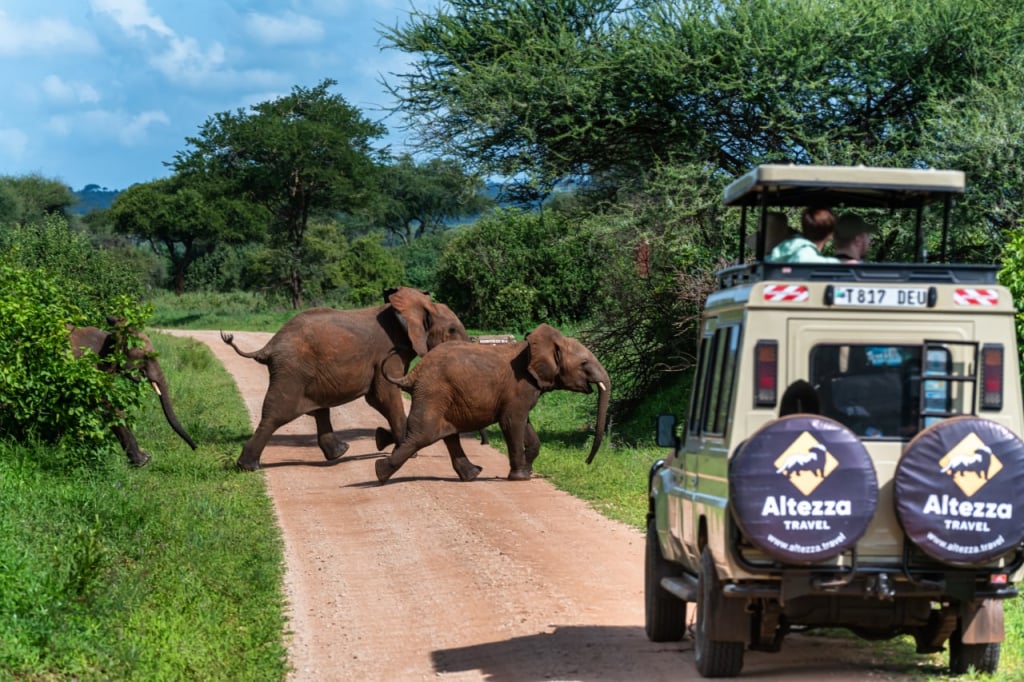
When we hear the word "safari," we imagine a group of tourists moving through an African savannah in search of large wild animals: lions, rhinos, buffalo, and elephants. In historical pictures, we often see men in pith helmets with guns in their hands, while modern pictures show people in SUVs holding long lens cameras. It is an animal hunt - hunting in the literal sense, or just observing and photo-hunting - in the vastness of the hottest continent. Fashion connoisseurs may also think of beige-colored clothing with a straight cut, the obligatory wide belt, and a wide brimmed hat, inherited from the British military who served in Britain's African colonies. All these are our first associations with the beautiful word "safari," which sounds like it could be an Arabic given name.
A modern-day safari is a sightseeing trip to an African national park, the main purpose of which is to observe wild animals. In the past, safaris were organized with the objective of hunting large animals. Africa's canonical Big Five: the elephant, lion, rhino, African buffalo, and leopard are associated with the hunting traditions of Africa. Among hunters, these five mammals were considered to be the most dangerous and difficult to pursue, and their body parts made the most coveted trophies.
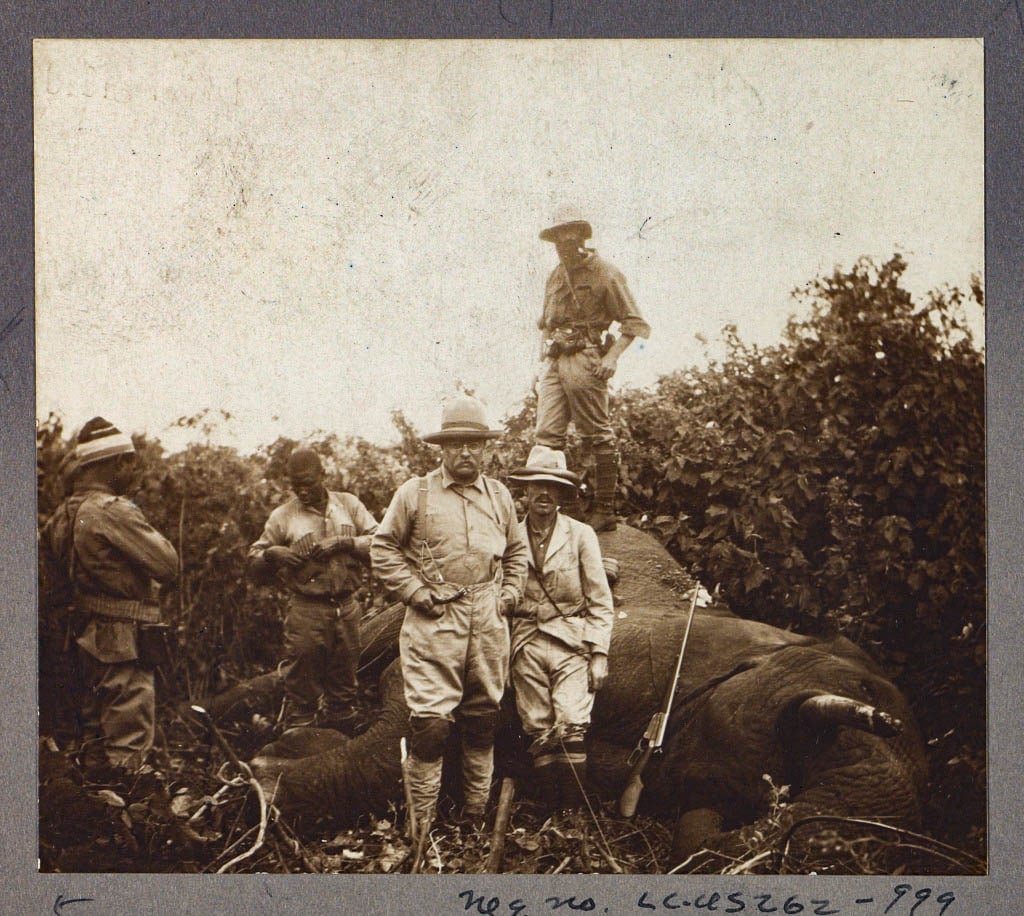
Nowadays, hunting on safari is generally condemned by modern society. Altezza Travel advocates for ethical treatment of animals, participates in projects to rescue and rehabilitate animals, strongly condemns hunting, poaching, commercial exploitation and other unacceptable forms of interaction with animals and nature, which humiliate, first of all, the human dignity. We do not organize hunting safaris, do not work in hunting reserves, do not cooperate with companies that exploit animals, and we urge our guests not to finance such organizations and not to participate in activities involving violence and unethical treatment of animals. However, it is still permitted in a very limited number of reserves. This very expensive pastime is strictly regulated by law. So, the vast majority of safaris today are rides on off-road vehicles that go along the routes designated by national parks, where you can meet wild animals, gaze at them up close or through binoculars, take pictures and observe their behavior in the natural environment.
The word "safari" itself comes from Swahili - the main language of the people of East Africa. It means "journey, trip" and goes back to the Arabic word “safar” with the same meaning. In Swahili-speaking countries, the term refers to any journey. There is even a common phrase, safari njema! It is a wish for a good and pleasant journey.
How has safari become a popular pastime?
The Oxford Dictionary defines “safari” as “a trip to see or hunt wild animals, especially in east or southern Africa”. In the West, this word was popularized by the British traveler Richard Francis Burton, who explored East Africa in the 19th century with John Henning Speke and took great pleasure in learning the languages and customs of the peoples he met. Gradually the word “safari” spread into other languages and was used to refer to travel in the wilds of East Africa.
By the way, Richard Burton became famous not only as a linguist and ethnographer but also as a person who translated into English the ancient Indian Kamasutra as well as the Arabic and Persian tales of the Thousand and One Nights. Moreover, he was a rare non-Muslim pilgrim to Mecca and had to disguise himself as a sheikh or a dervish to secretly make those pilgrimages. Burton is also famous as the first European to discover the great African Lake Tanganyika, which stunned him with its beauty.
One of the most well-known historical African safari trips was the long expedition embarked upon by the 26th U.S. President Theodore Roosevelt. In 1909 he went to Africa The Smithsonian–Roosevelt African Expedition took Roosevelt from 1909 to 1910 through what is now the territories of Kenya, Uganda, the Democratic Republic of Congo, and Sudan. with his son and a large escort team for almost a year, just after his presidential term ended. Photos of Roosevelt on the hunt were printed in the newspapers, and a documentary about the trip was shown immediately upon his return. There is a book report of African Game Trails written by Roosevelt himself. We may be struck today by the list of animals killed on that safari, which is scrupulously given in the book. But the expedition was equipped by the Smithsonian Institution and allegedly had scientific motivations behind it.

The expedition brought back from Africa more than 23,000 specimens of plants and animals. It is recorded that 512 large animals have been shot personally by the president and his son, and a total of about 11,400 animals were killed or captured. It took the Institute eight years to catalog all the specimens. They became the basis of today's National Museum of Natural History in Washington. Therein lay the contradiction in Theodore Roosevelt's personality: his passion for hunting was joined with his desire to champion the interests of conservationists and scientists. It was he who founded the U.S. Forest Service. Roosevelt was also the first president to establish national parks and numerous protected areas in the United States.
"Roosevelt in Africa" documentary. Filmed in 1909. Library of Congress archives
Safari as a popular cultural phenomenon was heavily influenced by the American journalist and writer Ernest Hemingway. In the 1930s he traveled through Kenya and Tanganyika (as the mainland territory of present-day Tanzania used to be called). It is known that Hemingway was impressed by Africa’s stunning nature as well as by the magnificent Mount Kilimanjaro. Hunting was one of his passions - he hunted a lot in the Serengeti, as well as near Lake Manyara and today's Tarangire National Park. His love of nature and hunting influenced Patrick, the writer's son, who had been traveling with his parents since childhood. Patrick Hemingway eventually moved to Tanzania and lived there for 25 years. He also worked in Uganda and Kenya and even started his own safari business.
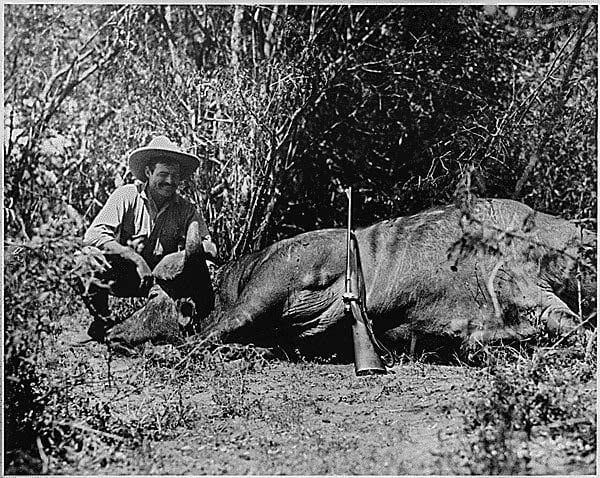
Ernest Hemingway's best-known "African" works are the short story "The Snows of Kilimanjaro '', and the "Green Hills of Africa" novella, which essentially is an autobiographical report of his family’s safari travels. His other drafts about Africa were compiled into the “True at First Light” book and published after the writer’s death by Patrick Hemingway.
Adventure novels on the topic of safari started to appear as early as the 19th century. We can remember the classic Jules Verne’s first novel, “Five Weeks in a Balloon”, which was about a journey in the air over Africa. We may also think of a popular novel by Henry Haggard, called “King Solomon's Mines”, about adventures in South Africa, or of the “World Voyage of a Young Parisian” by Louis Boussenard.
Another genre of literature that has preserved many early safari stories was adventure diary entries. Here one may think of William Kingston's “Adventures in Africa by an African Trader”. Allegedly those entries were written by a real but unidentified ivory trader and Kingston used those writings to compile a book. Another notable work of this genre was “Trader Horn: A Young Man's Astounding Adventures in 19th Century Equatorial Africa”, written by another ivory trader, Alfred Horne. Back then many parts of Africa remained unknown to Europeans, and such books fuelled the public interest in the exploration of the African continent with its incredibly rich geographical, cultural, and biological diversity.
The age of cinematography began in the early 20th century, and there were many popular adventure films set in Africa (most often in East or Central Africa) that also added interest to the topic of safari. The above-mentioned “Trader Horn” was adapted in 1931, although greatly augmented by fictional events. In the mid-20th century, the theme of jungle adventure was popular, and on cinema screens, you could see the African expanses being added alongside such locations as the jungles of Southeast Asia and the Amazon. Later, the 1985 film "Out of Africa'' starring Robert Redford and Meryl Streep had a major influence on the return to fashion of the safari style in clothing and interior design. It was based on the autobiographical book by Karen Blixen, who lived for many years in Kenya, and won seven Academy Awards and three Golden Globes, among other honors.
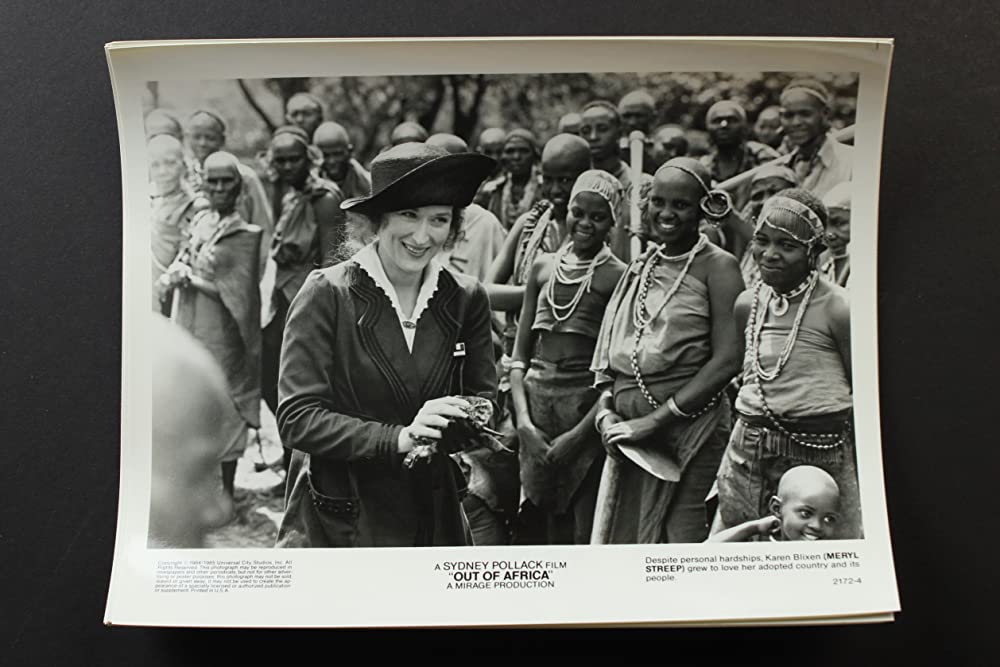
The growing interest in the modern type of safari travel was promoted even further by numerous documentaries, such as those from the National Geographic and Discovery channels, filmed in East African national parks, most notably in the Serengeti. Scenes of people driving through the savannah in an open car and observing various wild animals in their natural habitats while taking photos have encouraged many to plan their personal adventure - a trip to the great natural reserves of East Africa. Many travelers are also pleasantly surprised to find out that apart from driving in a car, there are numerous other ways of visiting the wild places of Africa.
What kinds of safaris are there?
A classic safari in today’s East Africa is a trip in an off-road vehicle with a driver-guide through the expanse of a national park where wild animals live in their natural habitats. The forests and savannas are roamed by herds of elephants, buffalo, zebras, and antelope of different species, as well as by giraffes which wander alone or in small groups. The trees are often occupied by monkeys and birds, while warthogs hide in the shade of bushes. Large herbivores are hunted by lion prides and solitary carnivores such as leopards and cheetahs. Jackals and hyenas choose smaller victims. Hippos and crocodiles hide in rivers from the heat. Travellers who go on safari have a unique opportunity to observe all those spectacular environments that are teeming with life.
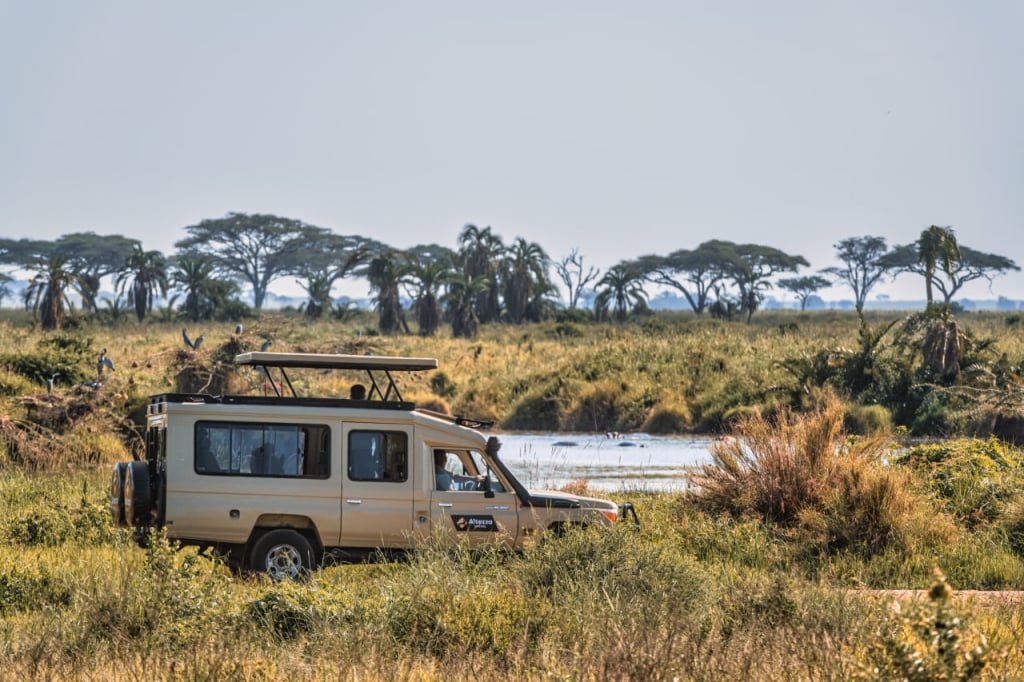
What are the advantages of driving around a national park in a car? This allows you to see a large number of animals of different species in just 2-3 hours. Also, when rangers find an interesting sighting such as a large pride of lions or a rhinoceros, they report it to the safari car driver by radio, so that you can quickly go there and see those animals. The off-road vehicle ride is the most popular safari format, but it is not the only one.
In some parks, where safety conditions allow, you can go on safari afoot. This is usually arranged in the areas where attacks by large animals are unlikely and there are no large herds grazing. For further safety, visitors are accompanied by an armed ranger. Safari walks allow you to get as close as possible to the natural environment of the park, observe the local plant world, and explore nature by encountering it directly.
One of the most beautiful and unusual ways to go on safari in Africa is to fly over the savannah in a hot air balloon. This will guarantee a thrilling experience for any visitors to a national park. Flying in the basket of a hot air balloon will allow you to marvel at the vastness of the landscapes below, and feel the true spirit of adventure captured in the pre-industrial era novels and travel diaries. Modern aerial safari is a premium type of recreation, which costs more than the classic car tours but guarantees amazing emotions and unusual angles from the bird's-eye view. A hot air balloon experience is often added as a "highlight" to a regular game-drive safari.
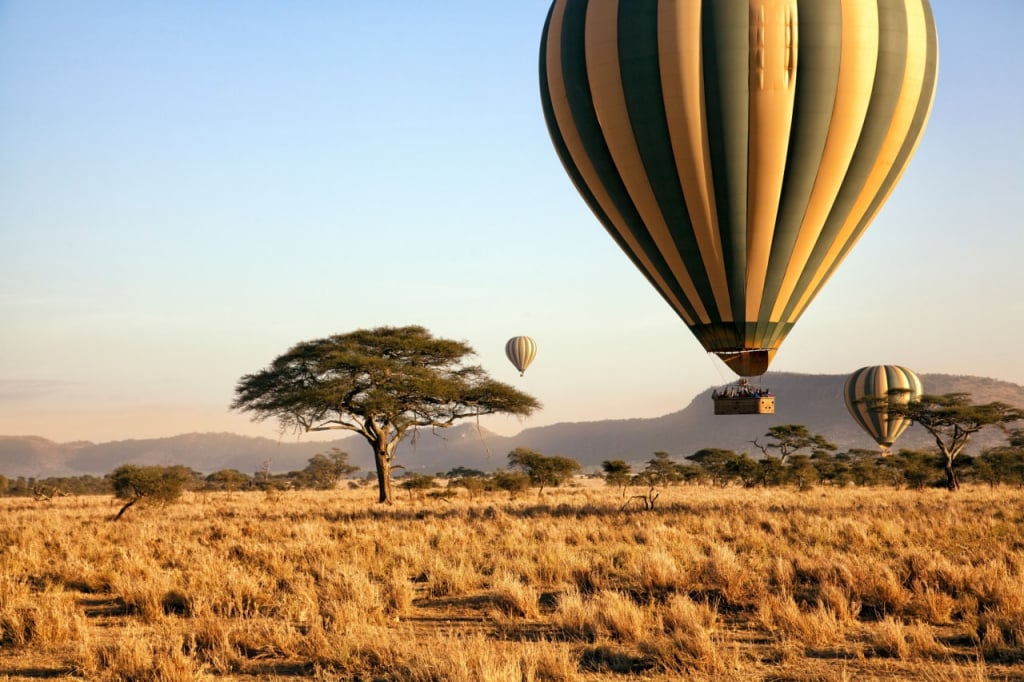
Another fantastic way to look at Africa’s stunning nature from an unfamiliar angle is by traveling on a boat over the surface of lakes, rivers, or even in the ocean. Riding a boat along one of the Tanzanian rivers, you will hear the guide telling you all sorts of interesting facts about crocodiles and hippos. And, of course, you’ll have a chance to observe those magnificent animals in close proximity! On a sea safari, you can go to various islands or ride a boat near the mainland. One of the highlights of a sea safari is getting close to dolphins and observing how those aquatic mammals play.
Where can you go on safari?
Perhaps the most famous destination for those wishing to go on a safari tour is the Serengeti National Park in East Africa. Many consider the iconic landscapes of the Serengeti to be the birthplace of the safari phenomenon. It is located in northern Tanzania. A natural extension of this national park can be found in neighboring Kenya, where it is called Maasai Mara National Reserve.
Another world-famous protected area can be found nearby: the Ngorongoro Conservation Area. It contains the world's largest ancient caldera which is truly a unique and breathtaking site. The famous zoologist Bernard Grzimek in his book “Serengeti Shall Not Die” called it a huge natural zoo. It is home to the “Big Five” game (elephant, lion, leopard, buffalo, rhino) and huge migrating herds of herbivore animals. The caldera’s steep walls make it seem like the animals are surrounded by a sort of natural enclosure.
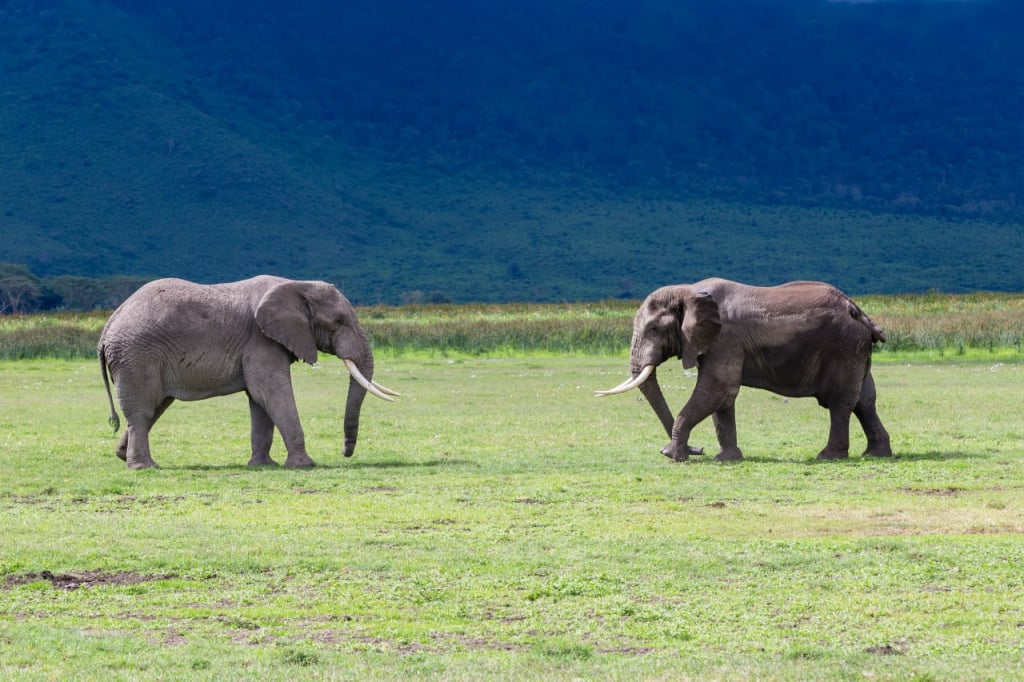
Other notable parks and protected areas include Kenya's Amboseli and the Laikipia Plateau, Kruger National Park in South Africa, the Okavango Delta and Chobe National Park in Botswana, as well as Queen Elizabeth National Park in Uganda, among others. And we can also mention the famous national park in Zambia, Mosi-Oa-Tunya, and Zimbabwe's Victoria Falls National Park. While these two national parks aren’t large, their main advantage is that both are adjacent to the spectacular Victoria Falls. Another remarkable place that can compete with Victoria Falls in popularity is the renowned Mt. Kilimanjaro volcano, whose international fame helped to bring popularity to some less well-known Tanzanian national parks such as Arusha and Tarangire.
There are many more notable national parks in other countries of the continent. Safari has long spread beyond East Africa. Moreover, the name “safari” is frequently attached to tours in national parks of Asia, primarily in India, Nepal, Bhutan, and Sri Lanka. In India, for example, Ranthambore, Gir forest, and Kanha national parks are popular. The latter is considered to be the inspiration behind the Rudyard Kipling's “Jungle Book”, which is a story about an animal-raised boy named Mowgli. Generally, these days safari has become a global phenomenon. It is often used to name a journey into the wilderness anywhere in the world, even if it is in Australia.
Starting from the 1960s, so-called “safari parks” started to appear in different countries. Those are basically open-air zoos, where animals live in relatively large open areas. Visitors could enter such territories in their own cars or even on foot. Such experimental “zoos” first began in the U.S. and then in Japan, where you could ride past walking lions.
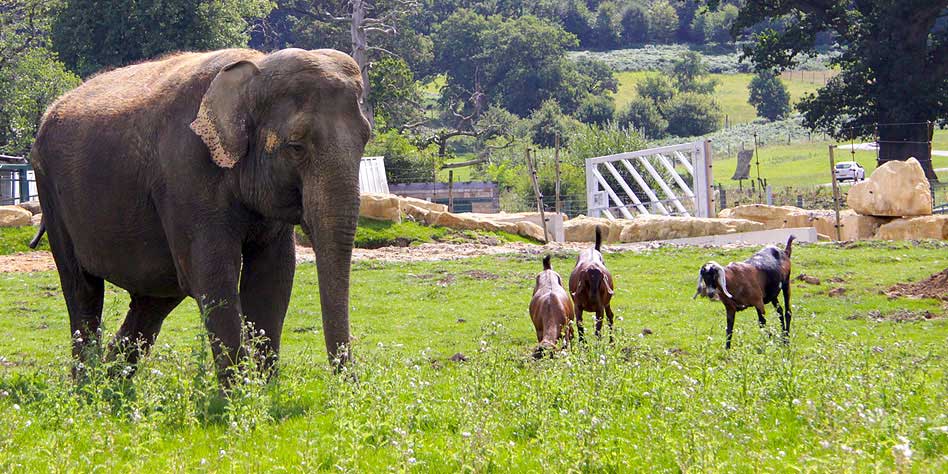
The first full-fledged safari park was Longleat Safari and Adventure Park in England. Today in that well-known place you can find ostriches, giraffes, antelopes, zebras, and other animals, not only those native to Africa. In the 21st century, there is a huge number of such safari parks around the world. The better places, such as Longleat, often invest in conservation, as well as rescue and rehabilitate animals, for example, those who spend their lives in the circus, like Anne the elephant mentioned above. But, of course, many parks are much worse and they can never be the same as the natural environment. The animals there are kept in captivity and frequently isolated, and some of those parks adopt the practices of contact zoos, which many consider unethical and harmful for the animals.
Real safari without violence towards animals can be found where it once originated - in Eastern Africa. Here animals live and thrive in their native environment without people trying to move them to other continents and intrude on their lives. Tanzania has made great progress in establishing national parks and reserves with clear rules and regulations for the visits into those protected areas, which helps to protect the country’s spectacular conservation areas. This, coupled with Tanzania’s outstanding biodiversity and natural beauty, makes it one of the best countries for safari tourism, if not the best in all of Africa.
If we search Instagram for hashtags and geotags with the word "safari" and then analyze the stats, we’ll see that there are three African countries in the top 10: Tanzania, South Africa, and Kenya. The first place is taken by the Victoria Falls National Park, where the main attraction is, of course, the spectacular waterfalls. But among true safari destinations, pictures from the Serengeti National Park are the most “Instagrammed” with over 160.000 photos tagged. All in all, Tanzania appears to be the clear leader when it comes to wildlife safari adventures.
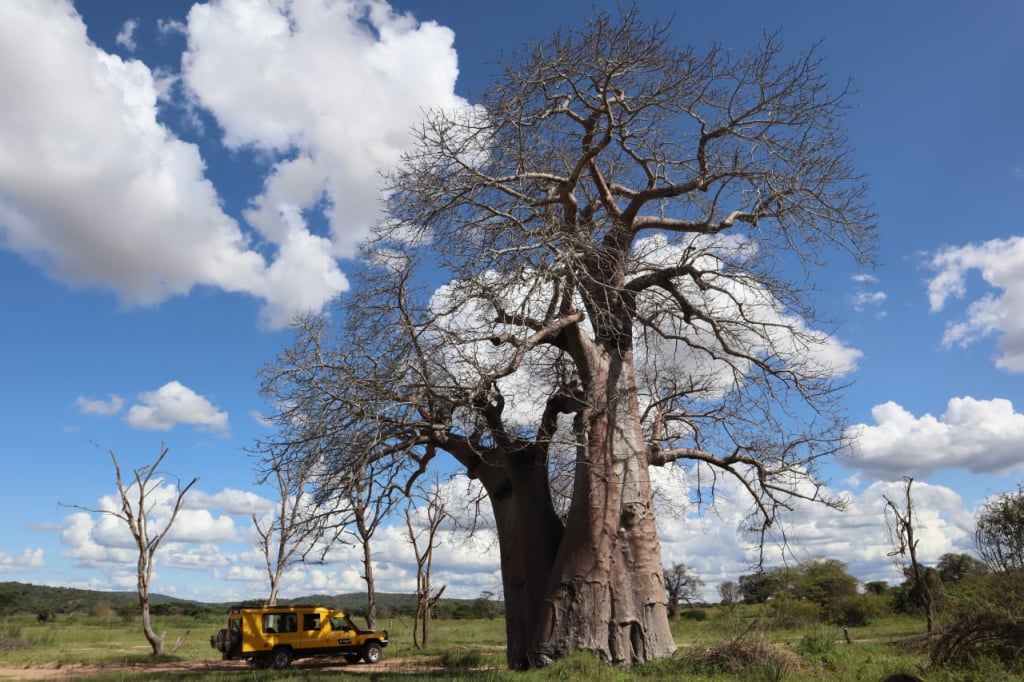
Active development of tourism in the country, high level of security, as well as availability of many other tourist activities can make your trip to Tanzania delightful, safe, and truly memorable. In addition to going on safari, you can learn about the folk traditions and culture of the local tribes in their villages, take tours to lakes, waterfalls, and other places of natural beauty, as well as explore or relax on the beaches of Zanzibar and other islands. Also, you could go to the diving sites off the coast in the Indian Ocean and observe underwater life with your own eyes. And, of course, there are expeditions to Mt. Kilimanjaro. By combining safaris with a variety of other activities, you can build a plan for the perfect African vacation while staying in the same country.
Welcome to the birthplace of safari - Tanzania, East Africa
The most popular protected areas in Tanzania are located in the north of the country, between Lake Victoria and Mount Kilimanjaro. We have already named them: Serengeti, Ngorongoro, Tarangire, Arusha, and Kilimanjaro National Park itself, whose main attraction is the eponymous peak, the highest in Africa. In addition to the Kilimanjaro trek, the north of Tanzania can offer guests two more interesting climbs - to the top of Kilimanjaro’s little brother, Meru volcano, and to Ol Doinyo Lengai, which is considered to be a sacred mountain among the local tribes. Among famous sites nearby there are also Lake Manyara National Park and three major lakes: Manyara, Eyasi, and Natron.
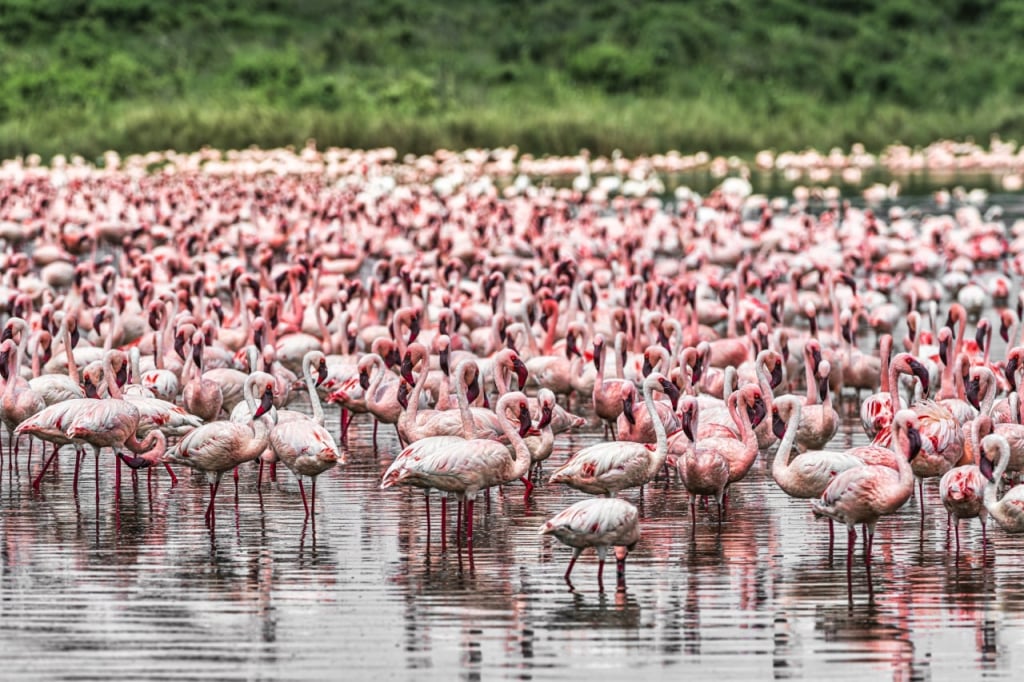
We have long specialized in the organization of nature tours in Tanzania and know all about local safaris. This is why we can confidently say that the incredibly rich travel opportunities of this African country are not limited to the most famous national parks we mentioned above. In the west of Tanzania, as well as in its central and southern parts, there are national parks and reserves that deserve attention. We can especially note Ruaha, Nyerere as part of the Selous, Katavi, as well as Gombe Stream, and Mahale Mountains, among other national parks and reserves.
How much time does going on safari take?
If you plan your trip to Tanzania well, you can ensure a great safari experience in several days, visiting the savannah expanse of the Serengeti with its Great Animal Migration, the famous Ngorongoro crater, as well as the wilderness of Tarangire, where herds of elephants roam among baobabs, the Great Ruaha River, in the waters of which many crocodiles and hippos hide, and the dense forest parks on the coast of Tanganyika, where researchers have spent decades observing chimpanzees.
A good safari trip would take several days. If you can dedicate a couple of weeks or more to your adventure - even better! Every major national park is absolutely worth spending a few days in, and sleeping in lodges A lodge is a hotel in Africa usually located in a wildlife area. Staying in such a place, you can feel closer to nature, and have much more convenient access to safari trips. Most often it is a complex of several houses for guests, which can either be solid buildings or comfortable structures with tent walls. As a rule, at the centre of this complex there is a restaurant which will provide excellent meals for you. The most comfortable lodges are located inside national parks, or nearby. Essentially, lodges are eco-hotels that always have high standards of service and of accommodation facilities. Some of them reach the level of 5 stars. right on the park’s grounds is a great experience. In that case, you’ll have the opportunity to go on safari in the early morning, and in the evening just before sunset. During these periods, the animals are the most active and playful. The majority of interesting scenes of animals interacting with each other usually take place in the morning and evening hours, when they aren’t forced to lazily seek shelter in the shade to avoid the scorching sun.
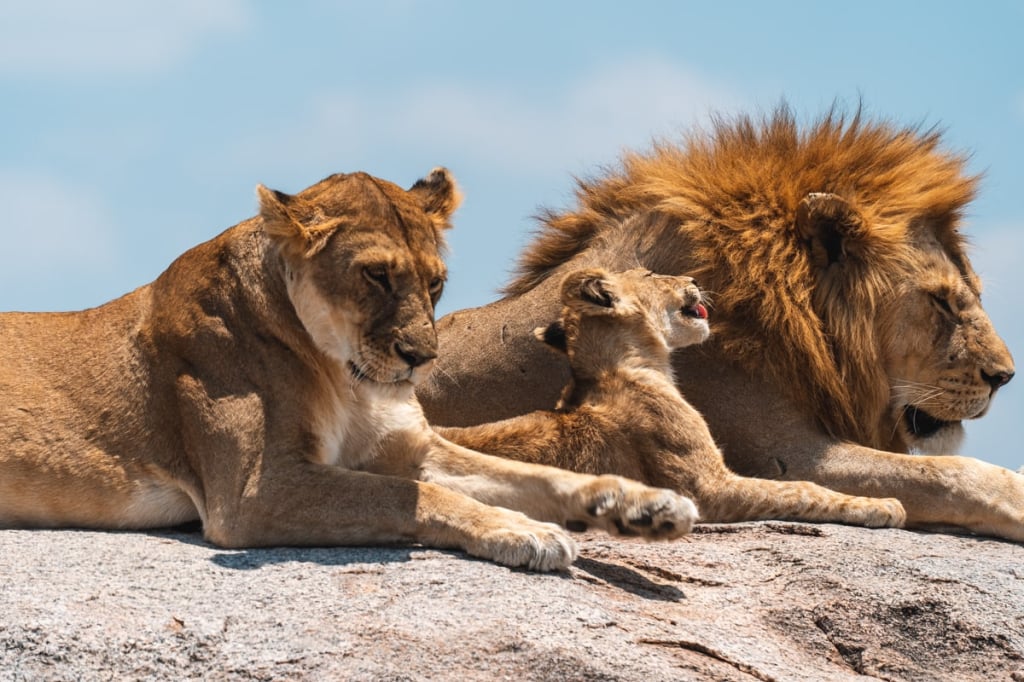
The incredible diversity of Tanzania’s flora and fauna allows for a variety of experiences. If you have the opportunity to stay on safari for longer than two weeks, don't miss that chance. Theodore Roosevelt spent almost a year in Africa, Ernest Hemingway came twice, and each time it was an extended trip.
All I wanted to do now was get back to Africa. We had not left it yet, but when I would wake in the night, I would lie, listening, homesick for it already.
Ernest Hemingway, “Green Hills of Africa”
What to expect from your safari trip in Tanzania?
There are three elements to a safari trip: safari vehicle rides, rest at one of the nearby hotels, and transfers between the hotel and the national park. Good planning allows you to minimize transfer time so that you will have more time to enjoy the main activities or rest.
Typically, it’s a good idea to stay within the same park for at least three days, ideally five days. This way you can experience the best things a park has to offer, visiting the interesting places that are often missed by hurried tourists.
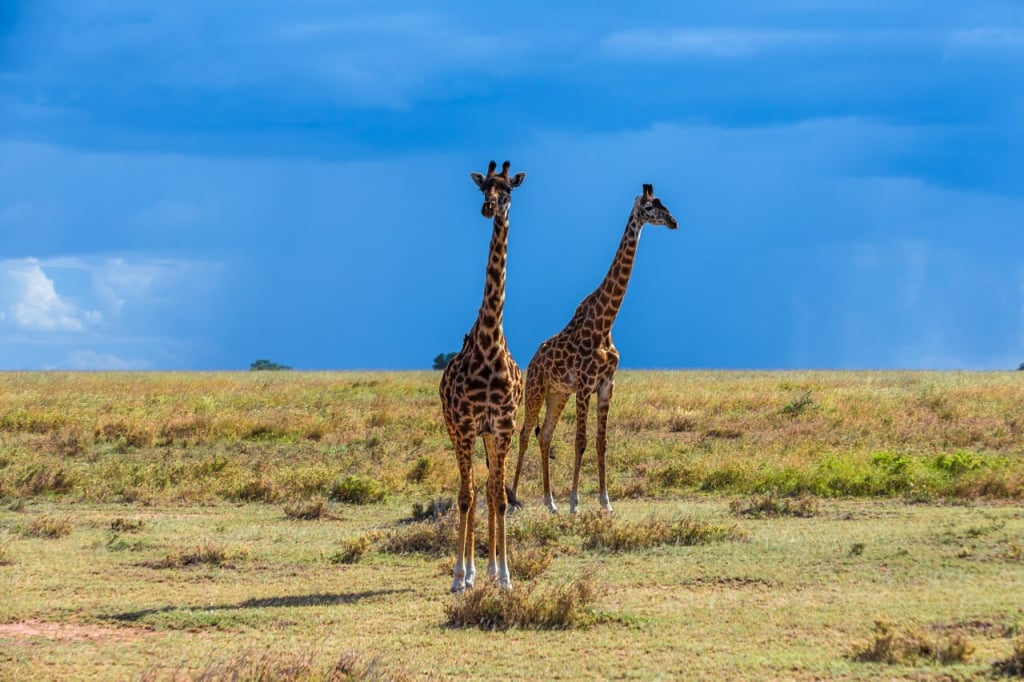
When choosing hotels, we strongly recommend that you pay attention not so much to the number of stars or interior details, but to the specific conditions you’re looking for in your accommodation. A very important factor is the hotel’s location. A lodge located within a national park often wins even against a luxury hotel in the nearest town. Time spent in transfer should be kept to a minimum, this will allow you to experience more of Tanzania’s spectacular nature. The opportunity to be deep in the park in the hours of the early morning is priceless! And the overall impression at the end of the safari is made up of these individual episodes.
An ideal safari day can be described as follows: the guests wake up early, shower, and take a safari vehicle to the park, taking their lunchboxes with them. This way it’s possible to see the morning predator hunt and lots of animals standing or laying down right on the road or nearby (before dozens of other safari vehicles have arrived). Shortly after that visitors can enjoy an outdoor breakfast at one of the park's picnic sites. Later, they ride some more around the park and return to the lodge for lunch. After lunch, the guests rest in the cool rooms while it is hot outside, and in the afternoon they go on safari again. Again they see many different animals, take beautiful pictures and return to the lodge as it is getting dark. In the evening they enjoy a delicious dinner, cozy outdoor gatherings, and a nice rest before going to bed.
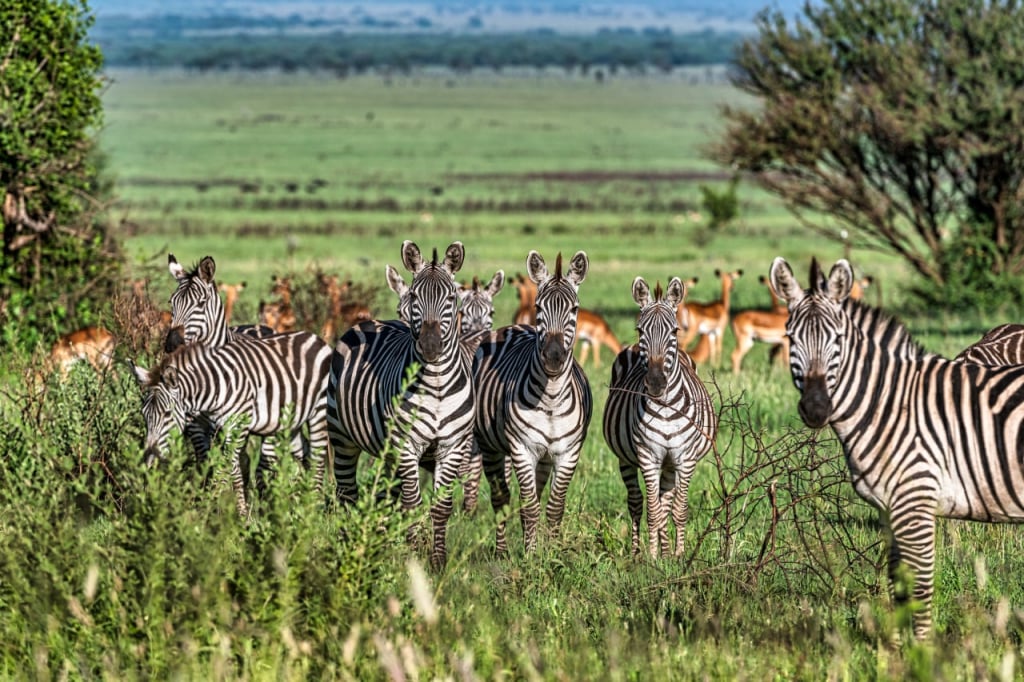
When is the best time to go on safari?
Tanzania is amazing because it is located near the equator and has several geographic regions. This means that you can travel here at any time of the year, as long as you don't set a specific goal, such as seeing antelopes forcing the rivers of Serengeti, which falls on June-August, during the Great Migration. However, Tanzania’s climate and weather conditions allow you to observe animal life almost all year round.
If you are worried about the rainy seasons, let us reassure you - the seasonality of rainy and dry periods in Tanzania these days is rather arbitrary. In any case, some rain very rarely prevents our guests from enjoying a safari. In addition, the so-called rainy season has many advantages, the key ones being the absence of crowds of tourists on popular trails in the parks, and lower hotel prices.
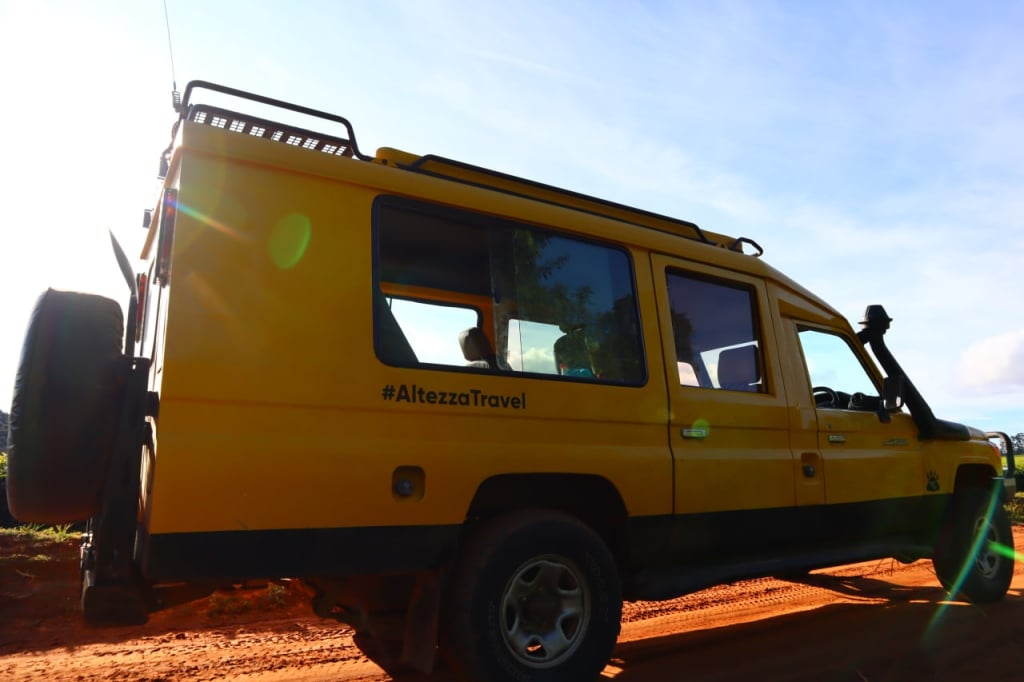
If you can't wait to start planning your safari trip to the heart of Africa, check out Altezza Travel's safari programs. While we offer numerous different tours, a customized program can be even better. Just contact our managers and ask them to put together a program that will be the most suitable for you. A couple of short articles with practical tips may also be helpful: on how to prepare for a safari in Tanzania, and what to bring with you on your trip.
Don't hesitate to ask questions, and feel free to ask us to expand your safari tour program - Tanzania has a lot to offer. We look forward to seeing you on safari!

Valentina, a creative artist with Altezza Travel, draws inspiration from Africa's natural wonders, dividing her time between Tanzania and South Africa. With over 8 years of living across various African regions, she offers invaluable insights and practical travel tips on our blog for those eager to explore this remarkable continent. Having immersed herself in numerous cities, towns, and villages, Valentina has a rich knowledge of African culture, community, and life.

Is there any age limit on safari? My son will be 6 this year
Hi Sandi! You question has inspired us to write a detailed article about it!
To give you a short answer:
1.There are no age limits set by the National Parks.
2. Some lodges and camps have age restrictions, some not accepting children under 5 years old.
3. Ultimately, it depends on your child. Even 3-year-olds can enjoy a safari, while a 14-year-old teenager might be bored and spend all their time on their smartphone. It all depends on the child's behavior. There are even a lot of adults who aren't interested in wildlife. However, we believe that taking kids on an African safari can really spark their interest in wildlife and exploration. Just keep in mind that safaris involve dust, rough roads, and hot sun.
We've had many families go on safari with their kids and they've enjoyed every single day in Tanzania. It's really like the Lion King movie - kids will see elephants, giraffes, zebras from a very short distance from the car - they will definitely fall in love.
Home / What is a Safari? Everything you need to know
What is a Safari? Everything you need to know
Many tourists who are not familiar with africa ask the question – what is a safari .
A SAFARI is an exciting and adventurous way of seeing the ‘real Africa’ because it enables you to view a variety of wildlife in their natural habitat. As a result, going on a safari gives you an authentic experience of Africa.
Safaris can involve walking through the wilderness, driving in 4×4 vehicles or by flying in light air craft. The purpose of a safari tour is to allow you to get intimate with the landscape and scenery.
While overland tours are mostly challenging, you need to be young at heart and open-minded to get the best out of an overland safari trip. All safari vehicles are custom-built to travel to remote parts of Africa often on long, bumpy roads, while allowing you to view wildlife from a safe distance in comfort.
Why go on a Safari?
- Slow down and get in touch with the earth
- Experience wildlife in their natural environment
- Engage with local cultures and learn about their traditions
- Take part in adventurous outdoor activities
The accommodation on safaris vary depending on your trip. Anything from basic two man tents through to tented camps and luxury lodges with en suite bathrooms. Certainly there is something to suit everyone!

What types of Safari Trips can you go on?
The term SAFARI is a type of experience where you have the opportunity to observe and photograph wildlife. An African safari in an overland truck is an adventure with lots of sightseeing and activities. Specialist forms of safaris cater for a variety of needs and budgets.
Some examples include migratory safaris, birding, medical safaris, hiking, culinary, family, horse back and photographic safaris. A safari tour can range is length from a couple of days to longer overland trips . While the longer safari tours traverse over numerous countries and include 1-2 months of travel.
Let travellers Konrad and Brooke tell you all about an Overland Tour in Africa:
What is a Camping Overland Safari Trip?
A camping overland safari is for travelers who want a hands-on experience of Mother Nature. Either setting up your campsite or helping build a campfire whilst surrounded by breathtaking landscapes and scenery. During an African camping safari you will stay in large dome canvas tents which are spacious enough for two adults and your luggage.
Most camping safaris include a sleeping mat and you only need to bring your own sleeping bag, pillow and towel. The African campsites are basic and comfortable. Most have warm showers and flushing ablutions, while others may have natural ablutions.
What are Accommodated or Comfort Overland Safari Trip?
Accommodated safaris are designed for travelers who prefer extra comforts. Most importantly, it is comfort without the price tag! Our accommodated safaris make use of a combination of lodges, hostels, bungalows, chalets, permanent safari camps, hotels and traditional huts.
Our properties are ideally located at each destination for an authentic experience with incredible views. The standard of the properties varies along the trip. While Southern Africa properties are much more established than the East Africa accommodation. They vary from basic comfortable accommodation to breathtaking properties.
What is a Lodge Safari Tour?
Lodge safaris allow travelers to access wildlife over a shorter period of time. Therefore the lodges are located close to the wildlife and allow you more comfort. Most lodges can be accessed by air or by land transfers thus allowing you to maximize your time and experience. Also the quality of lodges vary for budgets and level of comfort.
What is a Mobile Tented Safari Tour?
Mobile tented Safaris are designed to allow for less impact on the environment. Tents are set up for your accommodation and then dismantled when you leave to ensure only footprints are left behind. Guides will drive the support vehicles ahead of the travelers and set up the camp. As a result the entire camp is all set up before your arrival.
By the time you arrive all you have to do is unpack, sit back relax and wait for dinner to be served. You will sleep on stretcher beds with a sleeping bag and a pillow provided. Bucket showers are provided with heated water for you to freshen up.
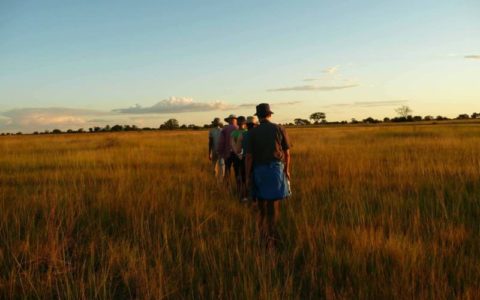
R 163,450
Cape Town to Nairobi Tour (Comfort) (42 Days)
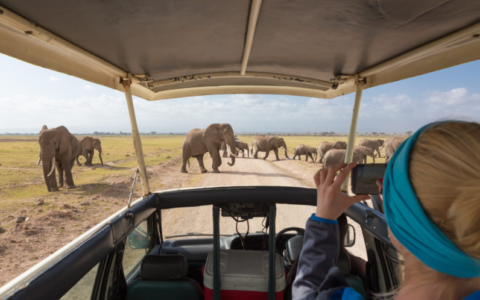
R 102,355
+ Local Payment USD 1185 (Jan - June) - USD 1365 (Jul - Dec)
East Africa Migration Safari – 15 Days
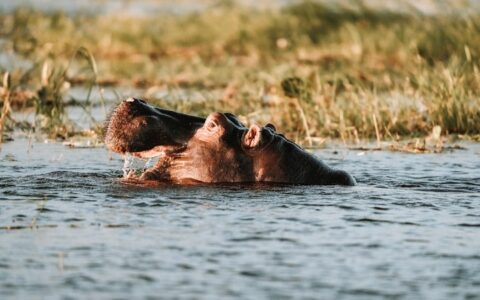
R 40,710
11 Day Botswana Adventure Semi Camping Tour
Luxury tented camps.
Some of the camps are luxury camps which are spacious tents with beds and crisp good quality linen. Resident chefs will prepare all your meals and there is a designated guide to organise and maintain the campsite.
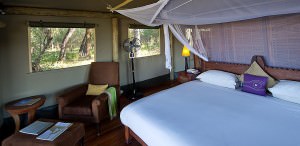
There are a few permanent tented camps which are erected seasonally in wildlife-dense areas for the best game viewing experience. Once the season is over these tents are dismantled and moved to another area for optimum game viewing.
What is a typical day on a Safari Trip?
Early mornings are frequent so that you can enjoy a hot beverage and a light breakfast before heading out on a game drive. The mornings can be crisp and cold while refreshing, with the reward of watching nature awaken.
The morning game drives can be between 2 to 3 hours long. Allowing you plenty of time to explore the area before returning to the campsite for lunch or enjoying a picnic in the bush. You might go on another game drive in the afternoon or take part in an activity such as canoeing, birdwatching or white water rafting.
Dinner will be prepared for you to sit back, relax and chat to your fellow companions over sundowners while a crackling fire is ready to keep the chill off. Early nights are usually encouraged so that you wake up refreshed and ready for a another adventurous safari.
When is the best time to go on a Safari Tour?
The Winter months of June to October offer the best game viewing throughout East and Southern Africa. The best wildlife viewing is when the herds of game graze on the dry Savannah during the day. Whilst watering holes and riverbeds are the main attraction at sunset.
Winter is also the best time to see and experience the wildebeest migration in the Masai Mara Game Reserve. The migration is definitely one of Africa’s greatest phenomena and well worth the trip.
It is ideal for a beach vacation on the East coast of Africa with moderate daily temperatures. Naturally these conditions are perfect to soak up the sun.
In the Summer months of November to March the bush transforms with lush green vegetation. The African sky offers up a dramatic backdrop of dark thunderstorm clouds. It is therefore the ideal playing field for energetic young grazers, with intensified predator action. Also the most popular season for birding enthusiasts with big flocks of migratory birds returning south.
Get a feel for what a Overland Safari in Africa is like from Cape Town to Victoria Falls:
Nonsense – Africa from Little Bear Films on Vimeo . Filmed while travelling on Cape to Vic Falls Tour
Is East Africa Safari or Southern Africa Safari better?
The big question when people consider a safari holiday in Africa is where is a safari tour possible and how to choose between East Africa and Southern Africa .
Southern Africa includes the countries of South Africa , Botswana , Zambia, Zimbabwe , Namibia , Malawi and Mozambique. While East Africa includes the countries of Kenya , Tanzania , Uganda and Rwanda. These are the two main regions for safari holidays in Africa. Each region offers different landscapes, wildlife experiences and attractions.
Therefore lets dive into the pros and cons of a safari in each region to help you decide on your African safari tour .
East Africa Safari

The East African Landscape
When people think of images of an African safari, they usually have scenes from an East African safari in mind. Countless nature documentaries are set on the vast savanna of Kenya and Tanzania. These two countries boast postcard-perfect landscapes of rolling savanna dotted with acacia trees and are home to the wildebeest migration . The annual migration of millions of animals that takes place between the Masai Mara and the Serengeti . This is truly one of the greatest wildlife spectacles on Earth.
Both East Africa tours and Southern Africa tours have the Big Five wildlife and an amazing diversity of other animals. However East Africa has a higher concentration of game than in Southern Africa. Wildlife are also easier to spot on the open savanna plains. Due to East African national parks not being fenced the wildlife move freely in their migratory patterns.
Here’s a taste of an African Safari in the Ngorongoro Crater of Tanzania:
The East African Wildlife Safari
While Kenya and Tanzania are the top countries in East Africa Wildlife Safari tours, Uganda and Rwanda have their own attractions as they are known for wild mountain gorillas. Along with the Democratic Republic of Congo, Uganda and Rwanda are the only places where you can see mountain gorillas in their natural habitat.
Tracking mountain gorillas is thrilling and hugely rewarding. Undoubtedly a bucket-list wildlife experience to try and tick off your ever growing list. The experience of coming face to face with a huge silver-back gorilla is truly unforgettable! You can also go chimpanzee tracking in Uganda and Rwanda, which doesn’t get you as close as you do to the gorillas, but it’s still an amazing wildlife encounter.
Another main attraction of a safari tour in East Africa is a hike up Africa’s highest mountain in Tanzania, Mount Kilimanjaro . Tanzania and Kenya have beautiful coastlines and idyllic islands for some relaxing beach time, snorkelling and diving.
A few downsides of east African safaris are the number of vehicles at sightings in the popular parks, such as the Masai Mara and the Serengeti . With no limit to the number of cars, you will likely be sharing the view with 10 other vehicles.
Ready to plan an East Africa tour?
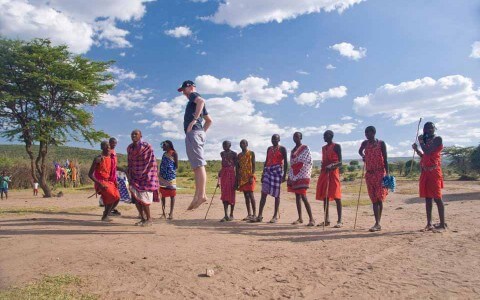
R 75,100
13 Day East Africa Game Parks and Zanzibar Safari
Southern africa safari.
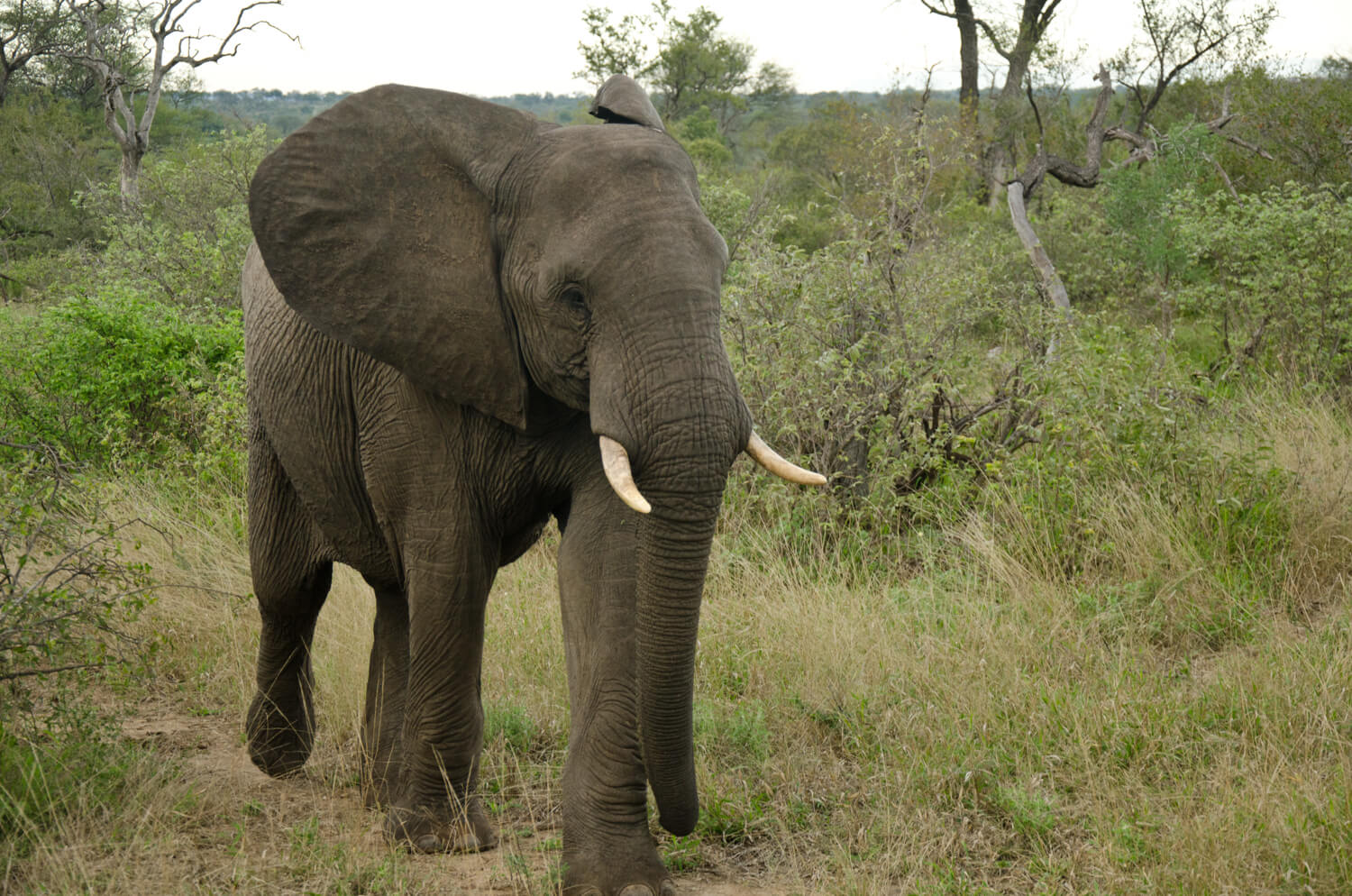
The Southern African Landscape
While Southern Africa doesn’t have the same concentration of wildlife as East Africa, it offers greater diversity of landscapes. Southern Africa highlights include the vast wetland of the Okavango Delta in Botswana as well as the beautiful Kalahari Desert in Botswana and South Africa. In addition, the tallest sand dunes in the world in the Namib Desert in Namibia and Africa’s largest waterfall, Victoria Falls , which straddles Zambia and Zimbabwe.
No forgetting Mozambique ’s long and beautiful coastline with its beautiful palm lined archipelagos. Mozambique safaris are popular for their picturesque scenery and rich cultural experiences.
With incredibly varied landscapes and climates, South Africa is the most popular safari destination in southern Africa for good reason. Not forgetting an amazing Big Five safari holiday visiting the country’s flagship park, Kruger National Park allows you to experience a wide diversity in a short time. Certainly South Africa offers so much from city sightseeing in beautiful Cape Town to a beach holiday on the Garden Route. Mountaineering in the Drakensberg or wine tasting in the Cape Winelands are also popular attractions.
The Southern African Wildlife
Apart from Etosha National Park in Namibia , many of the national parks and reserves in Southern Africa have dense bushveld unlike in East Africa, making game viewing a little bit more challenging. An advantage is you can often get much closer to the wildlife in Southern Africa. Therefore you’ll get to see those elephants or lions up close.
Private reserves or concessions in Southern Africa have strict rules about how many vehicles can be at a viewing. This means that you get more of an intimate experience at a sighting than you might do in East Africa.
If you’re looking for a malaria-free safari destination then east Africa is unfortunately not an option. Africa’s only malaria-free safaris are in South Africa and Namibia (here is our list of the best malaria-free safaris in southern Africa ).
Inspired to go on a Safari Tour in Southern Africa?
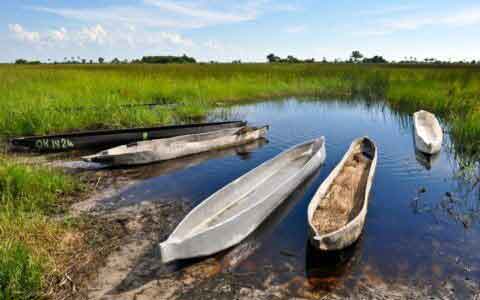
R 105,200
Cape To Cape Southern Explorer Overland (41 Days)
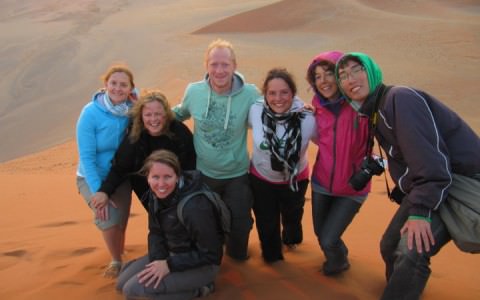
R 78,900
Southern Africa Adventure (25 Days)
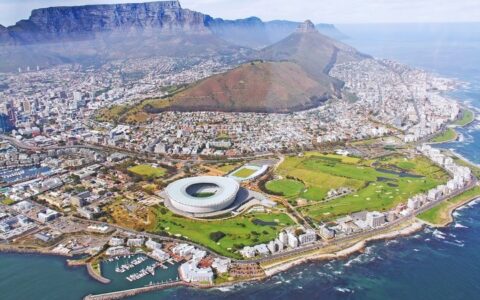
R 80,700
Cape Town to Victoria Falls Ultimate Tour (Comfort) *Our Most Popular*
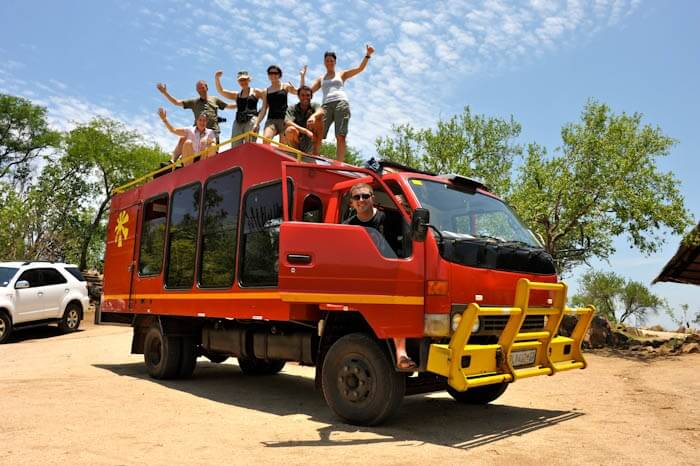
If you can’t possibly choose between East Africa and Southern Africa for a safari tour then explore both regions on one of our long overlanding tours ?
Our 55 day Nairobi to Cape Town overlanding tour starts in Kenya and takes you through Uganda, Tanzania, Malawi, Zambia, Zimbabwe, Botswana and Namibia before coming to an end in Cape Town, South Africa. Along the way you will visit most of the best national parks and reserves in both East and Southern Africa.

Some of the best Safari tours travelling to Africa:
- Cape Town Tours
- Johannesburg Tours
- Nairobi Tours
- Victoria Falls Tours
- Zanzibar Tours
- Swakopmund Tours
- Garden Route Tours
- Southern Africa Tours
Our Top Safari Game Reserves:
- Kruger Park Safaris
- Etosha Safaris
- Chobe Safaris
- Okavango Delta Safaris
- Serengeti Safaris
- Masai Mara Safaris
- Ngorongoro Crater Safaris
- Moremi Safaris
Choose Safari tours by Country:
- Namibia Safaris
- Uganda Safaris
- Mozambique Safaris
- Zimbabwe Safaris
- Kenya Safaris
- Tanzania Safaris
- Malawi Safaris
- Lesotho Safaris
Search by length of Safari Tours:
- 1 – 7 Days Tours
- 8 – 14 Days Tours
- 15 – 25 Days Tours
- 26 – 40 Days Tours
- 41 + Days Tours
Enquire Now
- Hidden Tour Title Hidden
- Hidden Tour Length Hidden
- Hidden Tour URL Hidden
- Hidden Tour Price Hidden
- Hidden Tour Style Hidden
- Hidden Compared Tours Hidden URLs
- Your name * First Last
- Your email address *
- Hidden Alternative Email (deprecated)
- The tour you're intested in
- The tours you're interested in Please do not edit these tour names so we can assist you with your choices.
Please enter your number below.
- When would you like to travel? Jun 2024 July 2024 Aug 2024 Sep 2024 Oct 2024 Nov 2024 Dec 2024 Jan 2025 Feb 2025 Mar 2025 Apr 2025 May 2025 May 2025 Jun 2025 Jul 2025 Aug 2025 Sep 2025 Oct 2025 Nov 2025 Dec 2025
- 26 - 40 Days
- 15 - 25 Days
- 8 - 14 Days
- How many travelers? * Select... 1 2 3 4 5 6 7 8 9 10
- 12 - 17 years
- 18 - 39 years
- 0 - 11 years
- 0 - 7 years
- 8 - 9 years
- 10 - 11 years
- South Africa
- What travel style in Africa would you prefer? * Not Sure Accommodated Tour Camping Adventure Small Group Safari
- Your question or query Feel free to ask us anything! We can advise on breathtaking scenery, colourful cultures, local cuisine and of course, amazing wildlife!
- By submitting your enquiry you agree to our terms of service .
- Email This field is for validation purposes and should be left unchanged.

- First-hand experience
- Advice and guidance
- We're passionate travelers
Popular Routes
- Cape Town to Victoria Falls
- Cape Town to Kenya
- Southern Africa
- East Africa Tours
- South Africa Tours
Tours Departing / Finishing
- Tours from Cape Town
- Tours from Johannesburg
- Tours from Nairobi
- Tours from Victoria Falls
- Tours from Zanzibar
Popular Countries
- Botswana Tours
- Namibia Tours
- Mozambique Tours
- Kenya Tours
- Tanzania Tours
- Uganda Tours
- Zimbabwe Tours
- Zambia Tours
- Lesotho Tours
Popular Game Reserves
- Kruger National Park Tours
- Chobe National Park Tours
- Okavango Delta Tours
- Etosha National Park Tours
- Serengeti National Park Tours
- Masai Mara Tours
- Moremi Game Reserve Tours
- Tarangire National Park Tours
- Ngorongoro Crater Tours
- Hwange National Park Tours
Blog Categories
- Accommodation (17)
- Adventure Activities (35)
- Africa Blog (559)
- Ask Gerry (12)
- Botswana (33)
- Destinations (125)
- Feedback (39)
- Malawi (16)
- Mozambique (20)
- Namibia (41)
- Only in Africa (65)
- South Africa (112)
- Tanzania (54)
- Travel Articles (120)
- Uganda (22)
- Victoria Falls (4)
- Videos showing life on the road (3)
- What to do (68)
- Wildlife (19)
- Zambia (18)
- Zimbabwe (22)
What is an African Safari?
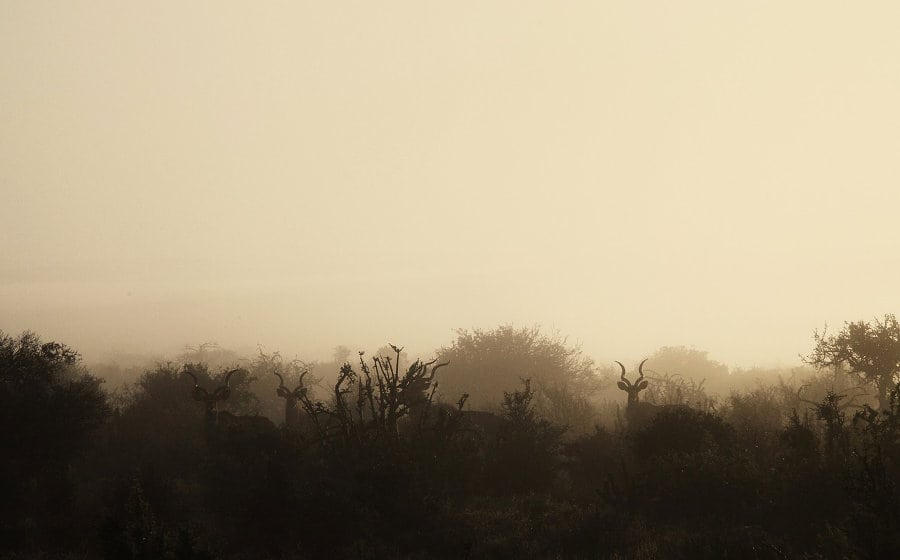
Africa is untouched and untamed .
Safari is raw and unscripted .
You’ll be centerstage in the greatest wildlife theatre on earth, face to face with the wonderful mammals that walk our planet.
It’s the ultimate adventure and there’s no predicting what will happen next.
Lions? Elephants? Wildebeest herds and yawning hippos? Spotted cats on the prowl?
An African safari is all this and so much more . You’ll be immersed in the wilderness , connecting with all your senses.
The journey has already started. Keep reading as this page provides all the essential information about a safari . Hint: it’s nothing like a zoo. In Africa, you’re going into the wild.
- An introduction to safari
- Safari activities
- Safari accommodation
- Food on safari
- The cost of a safari
Holding Hands Nature
- National Parks
- Coastal Destinations
- Mountain Escapes
- Rainforests
- Wildlife Safari
- Hiking Trails
- Scuba Diving
- Adventure Sports
- Hot Springs
- Natural Wonders of the World
- Sustainable Travel
- Local Cuisine
- Photography tips
- Travel Planning
Exploring the Meaning of Safari in Africa: A Journey Through the Heart of the Wild

Embark on a thrilling journey through the heart of the wild as we explore the meaning of the term ‘safari’ in Africa. Often associated with adventure, excitement and the great outdoors, the word ‘safari’ conjures up images of vast open spaces, majestic wildlife and breathtaking landscapes. But what does it really mean? Join us as we delve into the rich history and cultural significance of this fascinating word, and discover how it has come to represent the very essence of African travel. Get ready to be transported to a world of wonders, where the magic of the African safari awaits.
Understanding the Origins of the Word “Safari”
The swahili roots of safari.
The word “safari” has its roots in the Swahili language, which is widely spoken in East Africa. The word “safari” itself is derived from the Swahili word “safarī,” which means “to journey” or “to travel.” This term was initially used to describe the journey that hunters and explorers would embark on in search of big game, such as elephants, lions, and buffaloes.
In the early 20th century, European hunters and explorers ventured into Africa, and the concept of safari gained popularity among them. They used the term to describe their expeditions into the African wilderness, where they hunted big game for sport and scientific purposes. The term “safari” eventually became synonymous with adventure, exploration, and the pursuit of wild animals.
Today, the word “safari” has evolved to encompass a broader range of activities, including wildlife viewing, photography, and eco-tourism. It has become a symbol of the connection between humans and the natural world, representing a desire to explore and appreciate the beauty and diversity of Africa’s wild places.
The Evolution of Safari in Africa
The word “safari” has its roots in the Swahili language, which is widely spoken in East Africa. The word “safari” in Swahili means “journey” or “travel.” The term has evolved over time, and today, it is synonymous with the concept of exploring the African wilderness.
The earliest recorded safaris in Africa were undertaken by European explorers in the late 19th and early 20th centuries. These explorers traveled deep into the African continent in search of new territories, resources, and knowledge. They were often accompanied by local guides and porters who were familiar with the terrain and the wildlife.
As time passed, safaris became more popular among wealthy hunters and adventurers who sought to test their skills against the fierce animals of the African wilderness. This period saw the emergence of hunting safaris, which involved shooting and killing a variety of wild animals, including elephants, lions, and buffaloes.
In the mid-20th century, the concept of safari began to evolve once again. This time, it was driven by the growth of ecotourism and conservation efforts in Africa. Safari operators began to offer guided tours and expeditions to tourists who wanted to experience the African wilderness without harming the wildlife.
Today, safaris in Africa are conducted in a sustainable and responsible manner, with a focus on preserving the environment and promoting the conservation of wildlife. Safari operators offer a range of activities, including game drives, walking safaris, and birdwatching expeditions, all of which are designed to promote a deeper understanding and appreciation of the African wilderness.
In conclusion, the evolution of safari in Africa has been shaped by a variety of factors, including exploration, hunting, and ecotourism. Today, safaris are conducted in a responsible and sustainable manner, with a focus on preserving the environment and promoting the conservation of wildlife.
Safari as a Journey Through the Heart of the Wild
Exploring the natural wonders of africa, discovering the majestic landscapes of africa.
Africa is home to some of the most breathtaking landscapes in the world, from the towering mountains to the vast deserts and the sprawling savannas. On a safari, you’ll have the opportunity to witness these landscapes up close and personal, allowing you to fully appreciate their grandeur and majesty.
Observing the Rich Biodiversity of Africa
Africa is also home to an incredible variety of wildlife, from the iconic African elephant and lion to the lesser-known species that call the continent home. On a safari, you’ll have the chance to observe these animals in their natural habitats, learning about their behaviors and habitats and gaining a deeper appreciation for the intricate web of life in Africa.
Immersing Yourself in the Culture of Africa
Finally, a safari is also an opportunity to immerse yourself in the rich culture of Africa. From the vibrant markets to the ancient traditions and customs, there is no shortage of ways to experience the diversity and depth of African culture. Whether you’re learning about the local cuisine, trying your hand at traditional crafts, or simply soaking up the sights and sounds of everyday life, a safari is a truly immersive experience that will leave you with a newfound appreciation for this remarkable continent.
The Thrill of Encountering the Big Five
Encountering the Big Five on a safari in Africa is a thrilling experience that every adventure seeker should try at least once in their lifetime. The Big Five refers to the five most dangerous and sought-after animals to hunt, which include the lion, leopard, elephant, rhino, and buffalo.
The thrill of encountering these majestic creatures in their natural habitat is unmatched. These animals are powerful and awe-inspiring, and seeing them up close is a once-in-a-lifetime experience. It is not just about the thrill of the hunt, but also about appreciating the beauty and power of these animals in their natural environment.
When on a safari, it is important to follow the guidelines set by the guides and rangers to ensure the safety of both the tourists and the animals. The guides are experienced and knowledgeable about the behavior of the animals, and they will ensure that the encounter is safe and respectful of the animals’ space.
It is important to remember that the Big Five are wild animals, and they should be treated with respect and caution. Encountering them in their natural habitat is a privilege, and it is our responsibility to ensure that we do not disturb or harm them in any way. By following the guidelines and respecting the animals, we can ensure that the experience of encountering the Big Five on a safari in Africa is a positive one for both the tourists and the animals.
The Role of Safari in African Culture and Tourism
The impact of safari on african economies.
The growth of the safari industry in Africa has had a significant impact on the economies of many countries. In particular, it has provided opportunities for economic development and poverty reduction in rural areas.
Job Creation
One of the most significant impacts of the safari industry on African economies is the creation of jobs. The industry provides employment opportunities for local people in a range of roles, from guides and drivers to hotel staff and restaurant workers. This has helped to reduce poverty and improve the standard of living in many rural communities.
Infrastructure Development
The growth of the safari industry has also led to the development of infrastructure in many areas. This has included the construction of roads, bridges, and other transportation infrastructure, as well as the development of hotels, lodges, and other tourist facilities. This infrastructure has helped to make it easier for tourists to access remote areas, which has in turn helped to promote economic development and growth.
Revenue Generation
The safari industry is a significant source of revenue for many African countries. In 2018, tourism contributed an estimated $169 billion to the African economy, with the majority of this revenue coming from wildlife tourism. This revenue has helped to support a range of public services, including healthcare, education, and infrastructure development.
Conservation Efforts
The safari industry has also played a key role in conservation efforts in Africa. Many safari operators work closely with local conservation organizations to protect wildlife and habitats. This has helped to promote sustainable tourism and ensure that the natural environment is protected for future generations.
Overall, the impact of the safari industry on African economies has been positive. It has provided opportunities for economic development and poverty reduction, while also contributing to conservation efforts and promoting sustainable tourism.
The Cultural Significance of Safari in African Communities
- Hunting as a Rite of Passage
- Celebrating Traditional Customs
- Contributing to Local Economies
- Supporting Conservation Efforts
- Building Cross-Cultural Understanding
- Preserving Indigenous Knowledge
- Bridging Generational Gaps
- Promoting Unity and Collaboration
Safari as a Tool for Conservation
The importance of eco-tourism in africa.
Eco-tourism has emerged as a crucial component of conservation efforts in Africa. By promoting sustainable travel practices, eco-tourism aims to protect the environment while also providing economic benefits to local communities . In the context of safari, eco-tourism plays a vital role in ensuring the preservation of Africa’s wildlife and wilderness areas .
Benefits of Eco-tourism in Africa
- Economic Benefits: Eco-tourism provides an alternative source of income for local communities, which can help reduce the reliance on resource extraction and hunting. By investing in eco-tourism, communities can benefit from the revenue generated by wildlife-based tourism without causing harm to the environment.
- Conservation Incentives: Eco-tourism creates incentives for local communities to protect wildlife and their habitats. By participating in eco-tourism, communities can directly benefit from the presence of wildlife, which provides a financial incentive to conserve these species.
- Environmental Education: Eco-tourism can promote environmental education and awareness among local communities and visitors. By engaging with nature and learning about the importance of conservation, participants can develop a deeper appreciation for the environment and the need to protect it.
Challenges of Eco-tourism in Africa
- Balancing Economic and Conservation Interests: While eco-tourism can provide economic benefits, it can also place pressure on wildlife and their habitats. Balancing the economic interests of local communities with the conservation needs of wildlife is a critical challenge that must be addressed to ensure the long-term sustainability of eco-tourism in Africa.
- Ensuring Sustainable Tourism Practices: To minimize the negative impact of tourism on the environment, it is essential to promote sustainable tourism practices. This includes minimizing waste, supporting local businesses, and respecting the natural environment.
- Managing Tourism Pressure: Eco-tourism can attract large numbers of visitors, which can lead to overcrowding and negative impacts on wildlife and their habitats. Managing tourism pressure requires careful planning and regulation to ensure that tourism does not negatively impact the environment or the experience of visitors.
In conclusion, eco-tourism plays a crucial role in promoting conservation efforts in Africa. By providing economic benefits to local communities , creating incentives for conservation, and promoting environmental education, eco-tourism can help ensure the long-term survival of Africa’s wildlife and wilderness areas . However, it is essential to address the challenges of balancing economic and conservation interests, ensuring sustainable tourism practices, and managing tourism pressure to ensure the sustainability of eco-tourism in Africa.
The Role of Safari in Protecting Endangered Species
The concept of safari in Africa has evolved over time, and one of its primary objectives is now to protect endangered species. By taking part in a safari, tourists contribute to conservation efforts and help to ensure the survival of these animals for future generations. Here are some ways in which safaris play a crucial role in protecting endangered species:
Collaboration with Conservation Organizations
Many safari operators collaborate with conservation organizations to support projects aimed at protecting endangered species. These organizations often focus on research, habitat restoration, and anti-poaching efforts. By working together, they can pool resources and expertise to make a greater impact. For example, some safari companies donate a portion of their revenue to fund anti-poaching units in national parks, where rangers work to protect animals from illegal hunting.
Education and Awareness
Safari operators also play an important role in educating tourists about the importance of conservation and the plight of endangered species. By raising awareness, tourists can become advocates for conservation and make a difference in their communities. In addition, many safari companies provide information about the impact of human activity on wildlife and the environment, encouraging tourists to adopt sustainable practices during their trip.
Economic Incentives
Finally, by contributing to the economy of local communities, safaris can provide economic incentives for people to protect rather than exploit wildlife. In many African countries, wildlife is a valuable resource that can provide income through tourism, rather than through hunting or poaching. By supporting local communities through tourism, safaris can help to create a sense of ownership and stewardship over the environment and its inhabitants.
In conclusion, the role of safari in protecting endangered species is multifaceted and complex. By collaborating with conservation organizations, educating tourists, and providing economic incentives, safaris can play a critical role in ensuring the survival of these magnificent animals for generations to come.
Preparing for Your Own African Safari Adventure
Planning your safari trip.
Before embarking on your African safari adventure, it is important to plan your trip carefully. This section will provide you with some useful tips to help you plan your safari trip to Africa.
Firstly, you need to decide on the destination of your safari. Africa is a vast continent with many countries offering amazing wildlife experiences. Some of the most popular safari destinations in Africa include Kenya, Tanzania, Botswana, and South Africa. Each of these countries has its unique attractions and activities, so it is essential to research and choose the one that best suits your interests and budget.
Once you have decided on your destination, the next step is to choose the right safari tour operator. There are many tour operators offering safari packages in Africa, and it is important to choose a reputable and reliable one. Look for an operator with experience, positive reviews, and a good reputation for providing high-quality services.
Next, you need to consider the type of safari experience you want to have. Do you want to go on a guided safari tour or do you prefer a self-drive safari? Would you rather stay in luxury lodges or camp in the wilderness? There are many different types of safari experiences available in Africa, so it is important to choose the one that best suits your preferences and budget.
Another important consideration when planning your safari trip is your budget. Africa is a relatively expensive destination, and safari trips can be costly. It is essential to budget accordingly and ensure that you have enough funds to cover all the expenses associated with your safari trip, including accommodation, transport, food, and activities.
Finally, it is important to research the safari regulations and requirements for the destination you are visiting. Each country in Africa has its own set of rules and regulations regarding safari activities, and it is essential to familiarize yourself with these before you go. For example, some countries require visitors to have a valid visa, while others do not. Additionally, some national parks have specific rules regarding behavior and activity, so it is important to be aware of these before you arrive.
By following these tips, you can ensure that you are well-prepared for your African safari adventure and have a safe and enjoyable trip.
Essential Tips for an Unforgettable Safari Experience
Africa is a land of breathtaking beauty, teeming with an abundance of wildlife, diverse cultures, and a wealth of natural wonders. Embarking on a safari adventure in Africa is a once-in-a-lifetime experience that promises to leave an indelible mark on your soul. However, to ensure that your safari journey is an unforgettable one, it is crucial to plan ahead and prepare adequately. Here are some essential tips to consider when planning your African safari adventure:
1. Choose the Right Destination
The first step in planning your African safari adventure is to choose the right destination. There are numerous national parks and game reserves in Africa that offer unparalleled wildlife viewing experiences. Consider factors such as the availability of your desired wildlife species, the best time to visit, and the type of safari experience you desire, such as a walking safari or a luxury safari.
2. Book with a Reputable Safari Operator
Booking with a reputable safari operator is crucial to ensure a seamless and enjoyable safari experience. Research different operators, read reviews, and ask for recommendations from trusted sources. A good safari operator will provide you with a customized itinerary, expert guides, and comfortable accommodations.
3. Pack Appropriate Clothing and Gear
African safaris can be hot and humid, or cool and dry, depending on the region you visit. Pack clothing that is appropriate for the climate and the activities you will be engaging in. Additionally, bring comfortable walking shoes, sunscreen, insect repellent, and a good camera to capture those unforgettable moments.
4. Follow Safety Protocols
Safety should always be a top priority when embarking on a safari adventure in Africa. Listen to your guide’s instructions at all times, do not wander off alone, and avoid getting too close to wild animals. Always carry a first-aid kit, and be aware of the risks associated with certain activities, such as walking safaris.
5. Respect the Environment and Local Communities
African safaris offer a unique opportunity to connect with nature and appreciate the cultural diversity of the region. Always respect the environment by avoiding littering and not disturbing wildlife habitats. Additionally, support local communities by visiting local markets, engaging in cultural activities, and leaving a positive impact on the places you visit.
By following these essential tips, you can ensure that your African safari adventure is an unforgettable one, filled with memorable experiences and a deep appreciation for the beauty and wonder of Africa’s wild lands.
Reflecting on the Beauty and Majesty of Africa
Before embarking on your African safari adventure, it is essential to reflect on the beauty and majesty of Africa. This is the perfect opportunity to immerse yourself in the diverse landscapes, rich cultures, and breathtaking wildlife that make this continent so unique. By reflecting on the beauty and majesty of Africa, you will gain a deeper appreciation for the natural world and develop a stronger connection to the land.
To begin, take some time to learn about the history and culture of the countries you will be visiting. Understanding the complex social and political dynamics of the region will help you appreciate the richness of the African experience. Additionally, familiarize yourself with the various languages and customs to ensure a smooth and respectful journey.
Next, research the different types of wildlife you may encounter on your safari. From the iconic lion and elephant to the lesser-known antelope and bird species, Africa is home to an incredible array of creatures. By studying their habitats, behaviors, and conservation status, you will develop a deeper appreciation for the interconnectedness of all living things.
It is also important to reflect on the impact of tourism on the local communities and environment. By choosing responsible tour operators and lodges, you can help support sustainable development and conservation efforts. Additionally, engaging with local guides and communities will give you a more authentic and meaningful experience.
By reflecting on the beauty and majesty of Africa, you will be better prepared to embark on your own African safari adventure . With an open mind and a deep respect for the land and its inhabitants, you will be able to fully immerse yourself in this extraordinary journey.
The Lasting Impact of Safari on the African Continent
While safari in Africa is an incredible adventure for tourists, it also has a lasting impact on the African continent. Here are some ways in which safari has a lasting impact on the African continent:
Safari tourism plays a significant role in conservation efforts in Africa. The revenue generated from tourism is used to fund conservation programs, protect wildlife, and support local communities. In addition, tour operators and travel companies work closely with local communities to ensure that their activities are sustainable and do not harm the environment.
Economic Benefits
Safari tourism provides economic benefits to local communities in Africa. The industry creates jobs and generates income, which helps to improve the standard of living for local people. Tour operators and travel companies also work with local communities to ensure that they benefit from tourism. For example, they provide training and support to local guides and small businesses, which helps to promote sustainable development.
Cultural Exchange
Safari tourism provides an opportunity for cultural exchange between tourists and local communities in Africa. Tourists have the opportunity to learn about the culture, traditions, and customs of local people. In addition, local communities have the opportunity to learn about the culture and traditions of tourists. This cultural exchange helps to promote understanding and respect between different cultures.
Safari tourism also helps to raise awareness about conservation and environmental issues in Africa. Tour operators and travel companies educate tourists about the importance of conservation and the impact of human activity on the environment. In addition, they work with local communities to raise awareness about these issues and promote sustainable practices.
Overall, safari tourism has a lasting impact on the African continent. It supports conservation efforts, provides economic benefits, promotes cultural exchange, and raises awareness about environmental issues.
1. What is a safari?
A safari is a journey or adventure into the wilderness, typically in Africa, to observe and experience the diverse wildlife and natural landscapes. It involves traveling to remote locations, often in protected areas, to explore and learn about the local flora and fauna, as well as the cultural heritage of the region.
2. What is the origin of the word “safari”?
The word “safari” comes from the Swahili language, which is widely spoken in East Africa. In Swahili, “safari” means “journey” or “travel.” The term gained popularity in the late 19th and early 20th centuries when European explorers and hunters ventured into the African wilderness, and it has since become synonymous with adventure and exploration in the continent.
3. Why is safari popular in Africa?
Africa is home to some of the world’s most stunning and diverse landscapes, as well as an incredible array of wildlife. From the vast savannas teeming with herbivores and predators to the dense forests filled with primates and other creatures, Africa offers a unique and thrilling experience for nature lovers and adventure seekers alike. Additionally, many African countries have established national parks and conservation areas that provide safe havens for wildlife and offer visitors the opportunity to witness these magnificent creatures in their natural habitats.
4. What activities can one engage in during a safari?
During a safari, travelers can participate in a variety of activities, depending on their interests and the location they are visiting. Common activities include game drives, where visitors can observe and learn about various animal species in their natural habitats; guided walks or hikes, which allow travelers to explore the landscape on foot and discover hidden wildlife; birdwatching, which involves identifying and observing different bird species; and cultural visits, where travelers can learn about the local customs and traditions of the region.
5. What are the best places to go on a safari in Africa?
Africa offers numerous destinations for a memorable safari experience. Some of the most popular locations include the Serengeti and Maasai Mara national parks in Tanzania and Kenya, where travelers can witness the great migration of wildebeests and zebras; the Okavango Delta in Botswana, known for its diverse wildlife and stunning landscapes; and the Kruger National Park in South Africa, which offers a chance to see the Big Five (lion, elephant, buffalo, leopard, and rhinoceros). Other notable destinations include the Sahara Desert, the Nile River, and the Victoria Falls.
6. What are the best times to go on a safari in Africa?
The best time to go on a safari in Africa depends on the region and the specific wildlife species one wishes to observe. Generally, the dry season (June to October) is considered the best time for viewing animals, as the vegetation is sparse, and the animals are more likely to gather around water sources. However, the wet season (November to May) can also be an excellent time for birdwatching and observing baby animals. It is essential to research the specific location and the species one is interested in before planning a safari to determine the optimal time to visit.
7. What should one pack for a safari in Africa?
When packing for a safari in Africa, it is essential to consider the climate, activities, and practicalities of the trip. Essential items include comfortable and weather-appropriate clothing, sturdy hiking shoes or boots, sunscreen, insect repellent, a hat or cap, sunglasses, and a camera or smartphone for capturing memories. For those participating in outdoor activities, it is advisable to bring additional gear such as binoculars, a flashlight or headlamp, and a water bottle. It is also important to consider any necessary medications or
African Safaris – What NOT to Do on a Safari
Leave a Reply Cancel reply
Your email address will not be published. Required fields are marked *
Save my name, email, and website in this browser for the next time I comment.
National Geographic content straight to your inbox—sign up for our popular newsletters here

Everything you need to know before booking your first African safari
For many, a safari represents the optimal escape and lifelong travel dream. If you’re going to invest in turning this dream into reality, there are some things worth considering. Plus, we recommend five incredible wildlife itineraries for 2023.
From the first waft of dewy morning air to the gentle owl hoots that drift into camp after dark, there’s a satisfying natural rhythm to a day on safari in Africa. Even if you’re not normally an early riser, you’ll quickly fall into the routine of pre-dawn starts, lazy lunchtimes, active afternoons and mellow evenings, making the most of the best hours both for wildlife-watching and for chilling out. Deep at night, if you’re lucky, you may hear the distant whoop of a hyena, the rasping call of a leopard or the bassy roar of a lion.
But more often than not, you’ll sleep soundly, drunk on fresh air. Soon after you wake, you’ll head out into the wild, eager to discover what the day will deliver. Perhaps you’ll find yourself inching up on some rhinos, watching boisterous elephants bathe in a waterhole or spotting the youngest, cutest members of a mighty big cat dynasty.
If this sounds like the kind of escape you’ve been craving, but you’re puzzling over possible itineraries, what’s the best way to choose?
Green means go
While every luxury safari offers unforgettable wildlife encounters, there are plenty of options to consider. High-end African trips and settings vary hugely in their atmosphere and style.
Some itineraries, for example, are much greener than others. If you’re passionate about nature, you’ll want to make ethical choices, mindful of climate change and biodiversity, perhaps by minimising your time in the air. While every long-haul trip has a high carbon footprint, you can limit your safari’s impact by choosing a destination near an international airport and sharing a vehicle rather than continuing by taking domestic flights.
With superb wildlife-watching opportunities within driving distance, Nairobi makes an excellent starting point for a low-airmiles luxury safari. “You could head for the stunning mountains and waterfalls of the Aberdare range, where lions hunt giant forest hogs”, says Kenya specialist Richard Trillo of Expert Africa. “The tree-dotted plains of the Maasai Mara, which host East Africa’s annual Great Migration, are also within reach,” Richard adds.
There are other ways to dial down the net impact of your trip without compromising on quality, however. While carbon offset schemes can help compensate for your emissions, for a more targeted approach, you could book your trip through a specialist safari operator that has established working partnerships with African conservation charities.
“We’re proud to support South Africa’s all-female Black Mamba Anti-Poaching Unit, and Greenpop, a non-profit Sub-Saharan forest restoration and urban greening organisation,” says Marcelo Novais of luxury operator Ker and Downey Africa.
“We give all our clients the opportunity to donate to these worthy causes, since leaving a positive legacy is one of our core values,” he adds. Other deserving organisations include African Parks, the African Wildlife Foundation, Tusk and the World Land Trust.
Another effective way of maximising the benefits of your trip is to choose lodges that go the extra mile in their vicinity, doing more for environmental protection, community partnerships and rural development than merely covering park fees and basic wages. In Tanzania, the Elewana Arusha Coffee Lodge invites guests to visit the craft project they support, Shanga, where locals with disabilities upcycle glass, textiles and fishing wire into cute elephant cushions, jewellery and clothing.
When it comes to shortlisting properties, membership of Ecotourism Kenya, Responsible Tourism Tanzania, Fair Trade Tourism and the Global Sustainable Tourism Council are generally useful indicators.
Settling in
Once you’ve arrived in the bush, what will your surroundings feel like? Anyone who’s cautious about camping in the wilderness will be relieved to discover that most top-end operators put their guests at ease by focusing on creature comforts: cool drinks, gourmet dining, indulgently appointed private bathrooms and sumptuous beds, for example. As a rule, their staff — from the head guide to the housekeepers — are superb at their jobs.
That said, there are significant differences between, on the one hand, intimate, minimalist camps with just a handful of canvas tents and, at the other extreme, sizeable lodges featuring swimming pools, gyms and perhaps even a spa, photography hide, editing suite, research centre, library and observatory. It’s a matter of weighing up how close to nature you’d like to feel — hearing all those thrilling sounds in the night, for example — against the range of facilities and creature comforts you’d like to enjoy.
When deciding, honest opinions from people who know the properties well can be invaluable. “Our safari specialists always have detailed conversations with our clients to understand their preferences and offer advice”, says Liberty Gilmour of Audley Travel. “Conventional aircon, for example, is rarely essential: Zambia in May and high-altitude destinations such as Ngorongoro can be quite cool, particularly at night. If it’s hot, natural ventilation may be sufficient, but many camps also have solar-powered cooling systems.”
Whether opulent, nostalgic or quirky, surroundings that suit your aesthetic aspirations can elevate your experience. The family heirlooms that decorate Camp Jabulani in South Africa’s Kapama Reserve, for example, create a uniquely cosy atmosphere, while Xigera Safari Lodge in Botswana’s Okavango Delta is so proud of its collection of original pieces by contemporary African artists and artisans that staff offer art and design tours of the premises. To strike a contemporary note, Loisaba Lodo Springs in Kenya’s Loisaba Conservancy has rooms dotted with hand-stitched West African textiles and elegant upcycled Edwardian furniture.

Peaceful days
Almost every safari programme revolves around guided excursions called game drives, a name dating back to the days of Big Five hunting trips, but the style of the vehicles you ride in isn’t discussed as much as perhaps it should be. While some outfits settle for basic open-sided 4x4s, others invest in supremely comfortable, easy-access vehicles with charging points, dustproof storage space and a fridge. If you’re a keen photographer, top quality private vehicles are a must. Electric safari vehicles offer a particularly smooth ride; while still rare, they’re the future, and are starting to catch on.
Ila Safari Lodge in Zambia’s Kafue National Park offers the rare luxury of total peace and quiet. Founder Vincent Kouwenhoven, who has pioneered electric transport at Ila and its sister lodges in Zambia and Malawi, explains: “Our love for Africa led us to develop technologies that enable guests to experience the bush in near-silent, pollution-free vehicles, charged by our own solar panels. It’s an ecologically conscious way to watch wildlife and very calming, too. Instead of the engine, you hear birdsong.”
Some safaris also promise near-solitude in a vast natural landscape — an intoxicating feeling. One way to dodge the crowds is to travel during low season, the dates of which vary from location to location; alternatively, you could choose private reserves where the only vehicles you’ll see will be those of your fellow guests. As well as providing daytime activities, guides may offer night drives, using spotlights to search for nocturnal activity, such as birds roosting or lions stalking their prey.
For the ultimate in exclusivity, it’s possible to book an entire camp or lodge, with the staff handcrafting everything to your precise specifications, from wake-up times to the cocktails and canapes. According to Ash Jarvis of Best of South Africa Travel, exclusive-use properties work particularly well for mixed-generation families: “With their private game drives, multiple living areas, private pool and the undivided attention of the whole staff, including the chefs (fussy eaters welcome), they eliminate stress and ensure that nobody has to compromise. That’s what good family holidays are all about.”
The ultimate adventure
If serenity is your scene, you may be dreaming of floating over herds of zebras and wildebeest in a hot-air balloon, or wandering across the savannah on a bushwalk or cycle ride. The most interesting safaris offer a mixed programme of imaginative guided activities such as these, enlivening the days with little surprises: picnics in beauty spots, perhaps, or lantern-lit barbecues.
The possibilities depend, to a large extent, on your choice of location. In Kenya’s northern conservancies, for example, you could explore the semi-desert by camel, while in Rwanda or Uganda, the activity you probably won’t want to miss is venturing into the depths of the rainforest on foot for a precious one-hour audience with mountain gorillas.
On a gorilla trek, you’ll be guided by rangers at the top of their game — a hallmark of an excellent safari. A knowledgeable, communicative guide can transform any trip, keeping you safe, entertained and intrigued.
“The inside track is what you really want, whether that’s in guiding, photography or conservation”, says Will Bolsover of Natural World Safaris. “In-depth knowledge leads you beneath the surface, for true insights into how conservation works, how wildlife benefits and how you can contribute.”
Since quality time with experts is one of the ultimate luxuries you can enjoy on safari, some top-end safaris, particularly in Kenya and South Africa, include a philanthropic element, whereby in exchange for a substantial donation to a conservation fund, you gain access to specialists in the field, perhaps even helping collar predators or collecting DNA samples from juvenile rhinos. Conservation safari companies such as Great Plains and AWF Safaris can assist with this. There’s no better way to start unlocking the mysteries of the African wilderness.

Five luxury safari trips in Africa to try in 2023 and beyond
1. low-carbon luxury in kenya.
After a night at Nairobi’s fabled Giraffe Manor, travel overland to Solio Lodge in the Central Highlands to explore Kenya’s oldest rhino conservation sanctuary, then continue to Sala’s Camp, in one of the least-visited corners of the Maasai Mara. Eight days from £8,400 with Expert Africa. expertafrica.com
2. Take to the skies in Tanzania
Flip from park to park in style on a SkySafari, travelling by private plane and touching down at luxurious Elewana Collection properties. This classic circuit takes in Arusha, Tarangire, Ngorongoro and the Serengeti, for blockbuster wildlife-watching. Ten days from £8,300 with Sky Safari. skysafari.com
3. Family adventures in South Africa
South Africa has a host of prospects to suit muti-generational families. Delightful safari properties such as Morukuru River House team well with Cape Town, the Cape Winelands and the Garden Route. Fourteen days from £4,500 with Best of South Africa Travel. bestofsouthafricatravel.com
4. Clock the Big Five in the safari heartlands
To experience some of southern Africa’s most exclusive wilderness retreats, string together Bushmans Kloof in South Africa’s Cederberg region, Sossusvlei Desert Lodge in Namibia, DumaTau in Linyanti and Xigera in the Okavango Delta. Twelve days from £24,797 with Beyond Green. staybeyondgreen.com
5. Meet mountain gorillas in Rwanda
Nothing can prepare you for the surge of emotions you’ll feel when, after an exhilarating trek, you first encounter a family of gorillas in the rainforest. Combine your hike with game drives in Rwanda’s Big Five national park, Akagera. Eight days from £7,493 with Jacada Travel. jacadatravel.com
Published in the 2022 edition of National Geographic Traveller (UK) The Luxury Collection
Follow us on social media
Facebook | Twitter | Instagram
Related Topics
- ADVENTURE TRAVEL
You May Also Like

Affordable gorilla encounters in Uganda's Bwindi Impenetrable Forest

How I got the shot: Ben Pipe on coming face to face with a lion
Introducing nat geo kids book bundle.

Free roam safari: a self-guided campervanning trip through South Africa & Eswatini

5 game drive alternatives, from cycling to horse-riding

Are South Africa’s captive lions inbred?

Who buys lion bones? Inside South Africa’s skeleton trade

4 incredible places in urgent need of conservation
- Environment
- Paid Content
- Photography
History & Culture
- History & Culture
- History Magazine
- Mind, Body, Wonder
- Destination Guide
- Terms of Use
- Privacy Policy
- Your US State Privacy Rights
- Children's Online Privacy Policy
- Interest-Based Ads
- About Nielsen Measurement
- Do Not Sell or Share My Personal Information
- Nat Geo Home
- Attend a Live Event
- Book a Trip
- Inspire Your Kids
- Shop Nat Geo
- Visit the D.C. Museum
- Learn About Our Impact
- Support Our Mission
- Advertise With Us
- Customer Service
- Renew Subscription
- Manage Your Subscription
- Work at Nat Geo
- Sign Up for Our Newsletters
- Contribute to Protect the Planet
Copyright © 1996-2015 National Geographic Society Copyright © 2015-2024 National Geographic Partners, LLC. All rights reserved
- Daily Crossword
- Word Puzzle
- Word Finder
- Word of the Day
- Synonym of the Day
- Word of the Year
- Language stories
- All featured
- Gender and sexuality
- All pop culture
- Writing hub
- Grammar essentials
- Commonly confused
- All writing tips
- Pop culture
- Writing tips
Advertisement
[ s uh - fahr -ee ]
- a journey or expedition, for hunting, exploration, or investigation, especially in eastern Africa.
- the hunters, guides, vehicles, equipment, etc., forming such an expedition.
- any long or adventurous journey or expedition.
verb (used without object)
- to go on a safari.
/ səˈfɑːrɪ /
- an overland journey or hunting expedition, esp in Africa
- any recreational journey or expedition
- the people, animals, etc, that go on the expedition
Discover More
Word history and origins.
Origin of safari 1
Example Sentences
If you want to see Saturn’s rings and distant galaxies, the Jackson-based nonprofit Wyoming Stargazing offers stargazing safaris.
Snorkelers can take a guided snorkel safari with Reef Magic Cruises and survey a coral stabilization project installed over a cyclone-damaged coral rubble field.
Recent gems include a $119,000 one bedroom, one bathroom apartment filled with large safari animal statues—including a giraffe peering into the shower.
One day, while the others were out on a safari, Ramani and I got talking.
She was fascinated by his stories about the safari he just took in South Africa.
One of the earliest ticker-tape parades was for Teddy Roosevelt when he returned from an African safari in 1910.
But he fell out of favour when it was revealed he had been on a big-game hunting safari.
A mere 800 travelers are allowed to visit the northern area of the park each year through safari tours, and prices are steep.
Would William support a hunting safari in Africa, whose supporters often make the very same arguments?
Earlier this month the two truly got away from it all when they went on an African safari with Eugenie and her boyfriend.
You start on safari to the railway as soon as possible, or sooner.
They set out on a leisurely return to the little safari, accompanied for a few miles by the soldierly Zulus.
A little after noon as they neared the safari they came upon a village which was in great excitement.
The next morning the safari filed out from the camp, the Masai greeting the inspanning with huge delight.
"Safari" is itself a Swahili word of Arabic origin, meaning an expedition and all that pertains to it.
Related Words

- South Africa
Polar Regions
- Bwindi National Park
- Kruger National Park
- Lofoten Islands
- Okavango Delta
- Ranthambore NP
NATURE TOURS
- Archipelagos Tours
- Deserts & Shrubland
- Northern Lights
- Polar Scapes
Leisure Tours
- Beach Resorts
- Diving & snorkelling Tours
- Heritage Resorts
- Mountain Resorts
- Snow Activities
- Snow Resorts
- Water Activities
- Wellness Tours
- Wildlife Resorts
Wildlife Tours
- Bear Tracking
- Big Cat Safaris
- Birding Tours
- Elephant Safaris
- Leopard Safaris
- Lion Safaris
- Tiger Safaris
- Unique Wildlife
- Wildlife Cruises
- Wildlife Safaris
Cultural Tours
- Architecture
- Art & Crafts
- City Trails
- Culinary Tours
- Fairs & Festivals
- Fort & Palaces
- Monuments & Museums
- Palaces of Worship
- Tribals Interactions
- Village Visits

Type of Journey
- Deep ocean Adventures
- Exploration Journeys
- Luxury Tours
- Friends & family Tours
- Rares species Tours
- Romance Tours
- Photography Tours
- Trekking Expeditions
TOP EXPERIENCES
- Big Cat Journeys
- Fairs & Festivals
- Heritage Stays
- Polar Journeys
- View all Itineraries
- View all Fixed Departure
- +1-646-583-2666
- Guest Login
- Agent Login
- Type of journeys
- Refer a friend
- Be an agent
- Holiday finder
- Image Gallery
- Video Gallery
- Guest Reviews
- In the media
Top Experiences
Top destinations.
- Kruger national park
- Ranthambore
- Serengeti National Park
Type Of Journey
- Rare species Tours
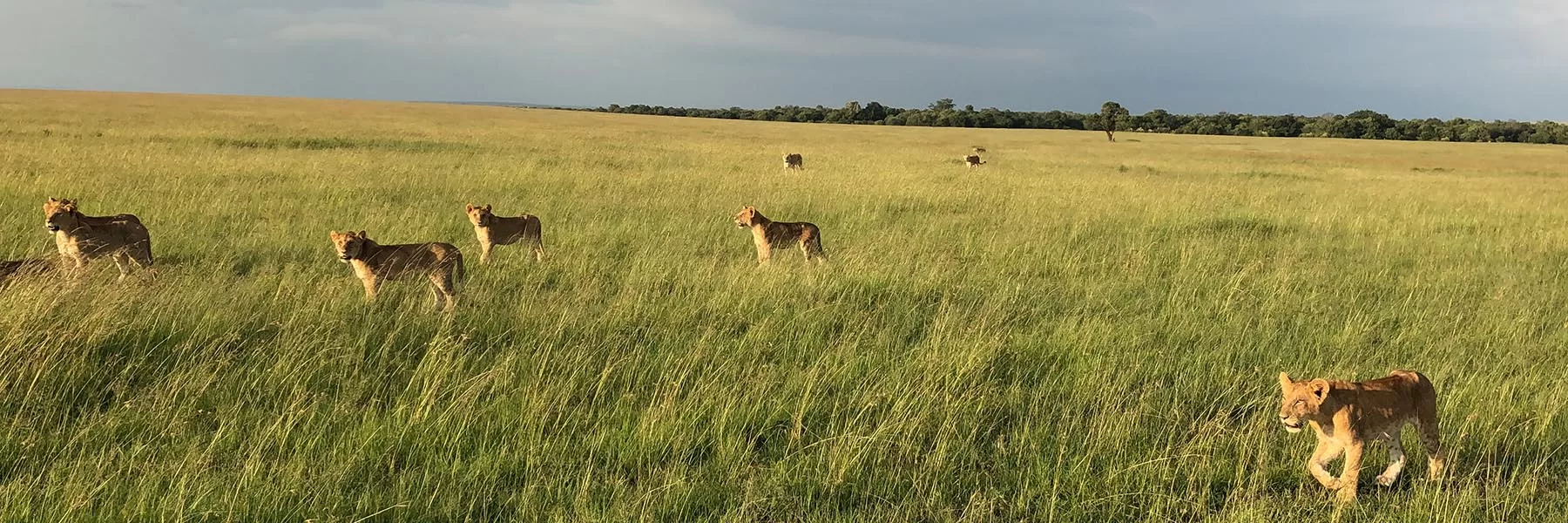
- Origins of African Safari
Out of all the places, Africa is chosen as the number one destination to enjoy genuine safaris due to its richness in flora and fauna. African safaris have a huge impact on the continent’s tourism industry. Millions of tourists from all around the globe visit Africa to witness the beautiful wildlife species in the wilderness. Whether it is the animated movie ‘The Lion King’, released in 1994, or the documentary safari movies such as ‘BBC Africa’ released in 2013, people are aware of the African continent’s overflowing beauty.

Giraffes in Tanzania
During earlier times, African safaris were captured in films and photographs. Only the privileged were allowed to travel to Africa and embark on safaris. However, the African safaris of the past were entirely different from what we see today. Having an understanding of the origins of African safaris is helpful in enhancing your next trip to the continent. Here is a brief history of safaris in Africa :
The meaning of ‘Safari’
Safari is a Swahili word that means ‘journey’. It originally emerged from the Arabic noun ‘safar’, which means travel, journey, or trip. The verb ‘to travel’, when translated in Swahili, is ‘Kusafiri’. In its original context, safari referred to the long travel distances people would undertake for trade or any type of migration. Presently, safari is often connected with luxury lodges, tents, game drives, backpacking, and more.
The origin of African safaris
Today, people undertake African Safaris as overland journeys to observe diverse animals residing in their natural habitats in different parts of Africa. However, this was not the case hundreds of years ago.
The earliest record, or primary interest, focused on the trade or trading routes of safaris. The African and Arabic cultures were closely intertwined, indicating that people or traders travelled long distances across different cities to spread their cultures. It was during the 18th century that trading flourished and became a successful business. Unfortunately, along with commodities, people were also traded and sold. During the colonial period, European safari caravans entered the scene, involving large-scale operations, such as substantial crews, supplies, and weapons.
Fortunately, this safari, synonymous with the slave trade, ended before the 20th century and changed its focus from business to exploration. Missionaries, adventurers, and explorers wandered throughout Africa and marvelled at the richness of the continent. Early naturalists redefined the purpose of safari and helped in discovering, identifying, and studying various species of animals, birds, and plant life.
Hunting safaris
With the new change in safaris, however, came hunting expeditions born in East Africa. The word ‘safari’ carried a negative connotation: a journey enjoyed for hunting or the hunting of animals. Instead of the elaborate safaris seen in the present, Europeans embarked on wildlife safaris not just to witness animals up close but also to hunt them. So, hunters came along with naturalists, and ‘hunting’ became a common association with safari. These hunters collected animals like trophies and boasted about conquering them. In many cases, there were year-long expeditions where wealthy Western travellers explored Africa with a rifle strapped to their backs.

Ernest Hemmingway during one of his hunts in Africa
During the years 1837-1901 (the Victorian era), people greatly witnessed the event of hunting safaris or trophy hunting. Explorers, traders, and aristocratic sportsmen generally told back stories about the epic adventures of hunting animals in Africa, which fascinated the common people. Hunters such as William Cornwallis Harris not only targeted the big game, which is Lion, Leopard, Elephant, Black Rhinoceros, and African Buffalo but also documented their killings to showcase them to the public.
Similarly, writer Ernest Hemmingway hunted different animals and described his experiences in the novel ‘Green Hills of Africa’. The members of the privileged classes in America and Europe greatly enjoyed these instances that romanticized hunting on the African continent.
A shift to modern safari
While Harris was famed for his infamous hunting, he was also responsible for introducing the movement of conservation. Which helped save pillaged areas of Africa and the local wildlife. Protecting the wildlife also meant changing the customs of the local cultures in East Africa. Few indigenous groups hunted the lion as a tradition to perform rituals. As animal species became endangered, the local government started cooperating with local tribes to put an end to such hunting practices.

African safaris in the present times
Going on safari today has a different connotation. Modern-day safari in the present means actively participating in sustaining African economies, supporting wildlife conservation, and supporting the local communities. In the African savannah, safaris continue to occur with the aim of wildlife viewing, but instead of using weapons, the participants capture animals through cameras.

A modern day African safari
Safari companies actively contribute to conservation projects or generate tourist revenue, which they use to manage game reserves and wildlife schemes in Africa. The emergence of eco-tourism has led to the development of environmentally friendly safari travel. In addition to game drives, visitors can enjoy experiencing local African cultures, exploring natural wonders, sightseeing, and participating in various outdoor activities.

A ranger observes elephants at Djuma Game Reserve, South Africa
The African safaris of today are all about conservation and strengthening the local communities. There are several positive trends that are transforming traditional safaris for the better. Some of them involve empowering local women, stronger community action, anti-poaching innovations, the emergence of lesser-known safari destinations in Africa, and sustainable sightings.
The 21st-century African safari offers unforgettable memories in the African bush, once-in-a-lifetime animal encounters, and authentic cultural interactions. As Jonathan Safran Foer aptly remarks, ‘If the thrill of hunting were in the hunt, or even in the marksmanship, a camera would do just as well.’
If you loved reading this story, then subscribe to our blog here (it will ask to verify your email) to get inspiring travel stories and trivia delivered to your email. Stories about wildlife trivia, cultural experiences, curated luxury hotel lists, underrated places to travel, polar journeys and much more.

The content team at Wild Voyager. We are passionate to bring you travel stories and unique experiences from around the world. Spread the love and feel free to share these stories.
Similar Posts
Leopard hills of bera, best places to spot brown bears, date with desert cat, authentic foods of rajasthan, top hotels in masai mara, enquire now.
Our travel experience designers will reach out for consultation. By submitting, you confirm that you agree to our privacy policy .
Follow us on social media

Subscribe to newsletter and stay updated
Read about our travel expeditions, new destinations, new pictures, latest trip schedules

© Copyright 2024 Wild Voyager Pvt Ltd.
Terms | Privacy | Contact

- South Africa
- The Ultimate Safari Planning Guide
- Safari Packing List
- Safari Luggage
- Safari Budget Guide
- Safari Reading List
- First-Timer’s Tips
- A Typical Day on Safari
Africa , Asia , Australia , Botswana , Canada , Europe , India , Kenya , North America , South Africa , Sri Lanka , UK
What is a safari.

When we think of safaris, we often picture vast open savannahs, majestic wild animals, and rugged four-wheel drive vehicles. But what exactly is a safari?
The word “safari” is derived from the Swahili word “safar,” which means journey or travel. Originally used by hunters, a safari now refers to a guided trip or expedition to observe and appreciate wildlife in their natural habitats. Safaris can take many forms, from walking safaris to hot air balloon safaris, and can be tailored to suit a variety of interests and budgets.
This blog post shares each of the different safaris available to wildlife lovers, in order to help you understand exactly what a safari is and the type that works best for you.
One of the most popular types of safari is the game drive safari. This involves travelling through a wildlife reserve or national park in a specially adapted vehicle, typically a four-wheel drive. These vehicles are designed to provide maximum visibility for passengers and can accommodate a range of group sizes. Game drives are led by experienced guides who are trained to spot wildlife and provide interesting facts and information about the animals and their behaviours.
Game drives are a quintessential part of a safari experience, offering an exciting and immersive way to explore the wilderness and witness wildlife up close. Riding in a specially designed safari vehicle with an experienced guide, participants can venture into national parks, game reserves, or other remote areas to search for a diverse array of wildlife. Game drives offer the opportunity to encounter iconic species like lions, elephants, giraffes, and more, in their natural habitats.
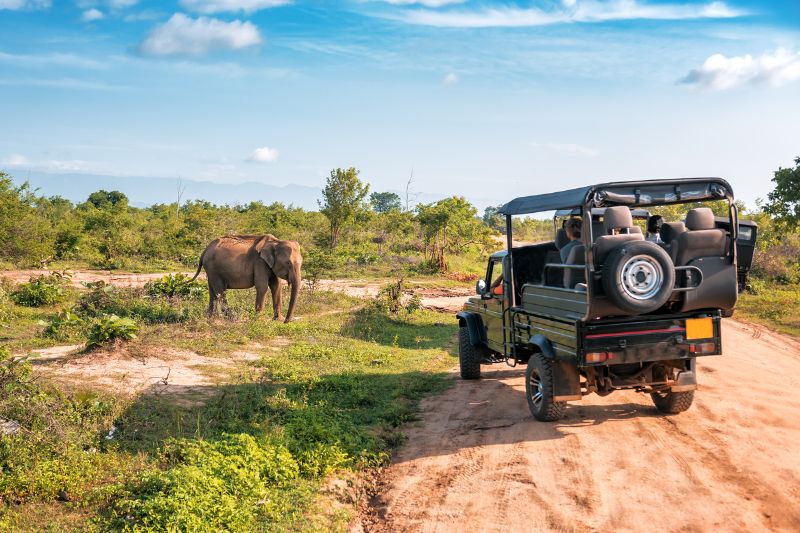
With keen eyes and deep knowledge of the area, guides can track and interpret animal behaviour, providing fascinating insights into the natural world. Game drives also offer the chance to witness the breathtaking beauty of the landscape, from sweeping savannahs to lush forests, and capture stunning photographs of the wild scenery. The thrill of the chase, the anticipation of a wildlife sighting, and the raw connection with nature make game drives an exhilarating and unforgettable safari experience.
Walking Safari
Walking safaris offer an unparalleled opportunity to intimately explore and connect with the natural world. Instead of observing wildlife from a vehicle, walking safaris allow travellers to step into the wild and experience the sights, sounds, and scents of the wilderness up close. Led by experienced and knowledgeable guides, walkers can learn about the intricacies of the ecosystem, from identifying animal tracks and signs to understanding the complex relationships between different species.
These safaris typically take place in smaller groups and are led by a guide who is well-versed in the local flora and fauna. Walking safaris can be tailored to suit different fitness levels, and participants can expect to encounter a variety of wildlife, from insects and birds to larger mammals such as elephants and lions.

Walking safaris also provide a deeper cultural immersion, as participants can interact with local communities and gain insights into their way of life. With every step, walkers can encounter unexpected moments of wonder, from spotting a hidden bird’s nest to encountering a herd of elephants at a waterhole. Walking safaris offer a truly authentic and immersive experience, allowing travellers to appreciate the beauty and diversity of nature in a more intimate and mindful way.
Hot Air Balloon Safari
For those looking for a truly unique experience, a hot air balloon safari may be just the thing. These safaris offer a bird’s-eye view of the landscape and wildlife below, providing a different perspective than a ground-based safari.
Hot air balloon safaris are typically conducted early in the morning when the air is calm and the wildlife is most active. As the balloon gently glides through the sky, adventurers can marvel at panoramic views of vast savannahs, rolling hills, or serene landscapes below. The elevated vantage point provides an unparalleled opportunity to capture breathtaking aerial photographs and witness the beauty of the wilderness from a completely different angle. The serene and peaceful experience of floating in a hot air balloon allows for a tranquil and immersive encounter with nature, devoid of the noise and disturbance of vehicles.

Wildlife sightings from the balloon are often unexpected and awe-inspiring, with the chance to spot animals from a distance without disturbing their natural behaviour. Hot air balloon safaris provide an unforgettable adventure that combines the thrill of soaring through the sky with the unparalleled beauty of the natural world, creating memories that will last a lifetime.
Photography Safari
Photography safaris offer a thrilling and immersive experience for nature and wildlife enthusiasts who want to capture the beauty of the natural world through their lenses. Embarking on a photography safari allows photographers to venture into stunning landscapes and remote wilderness areas, where they can capture unique and awe-inspiring shots of wildlife, landscapes, and cultural elements. With the guidance of expert wildlife guides and professional photographers, participants can learn valuable photography techniques, such as composition, lighting, and wildlife behaviour, to enhance their skills and capture stunning images.
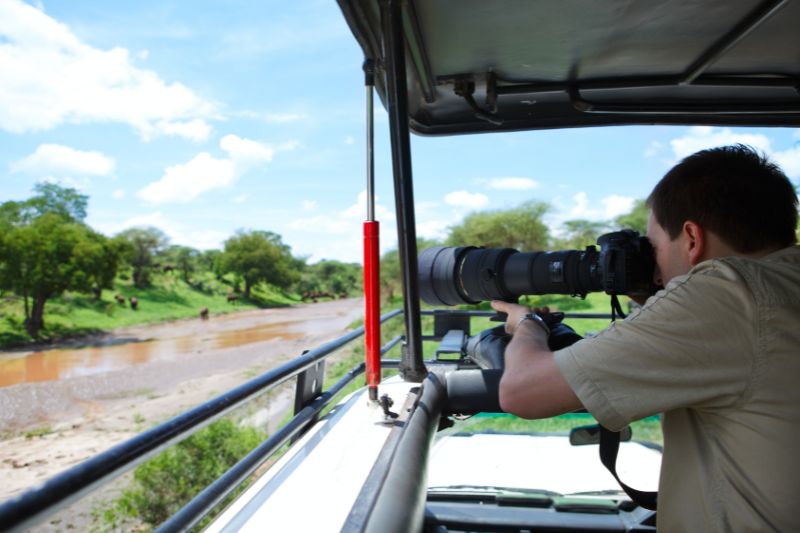
Photography safaris also provide opportunities to observe and photograph rare and elusive species in their natural habitats, creating unforgettable memories and remarkable photographs. Whether it’s tracking lions on the African savannah, photographing polar bears in the Arctic, or capturing the vibrant colours of a tropical rainforest, a photography safari is an extraordinary adventure that combines the thrill of wildlife encounters with the art of photography.
Boat Safari
Boat safaris offer a unique and immersive way to explore the diverse ecosystems and wildlife of rivers, lakes, and waterways. Cruising on a boat allows participants to access remote and untouched areas that may not be reachable by land, providing a different perspective and vantage point for wildlife viewing.
Boats make it possible to spot a wide range of wildlife, such as crocodiles, hippos, water birds, and even elephants and other animals that come to the water’s edge to drink. Guides with specialised knowledge about the local flora and fauna can provide insights and interesting facts about the ecosystem and its inhabitants. The tranquil rhythm of the boat and the serene surroundings create a calming and peaceful experience, perfect for enjoying the beauty of nature and capturing stunning photographs.
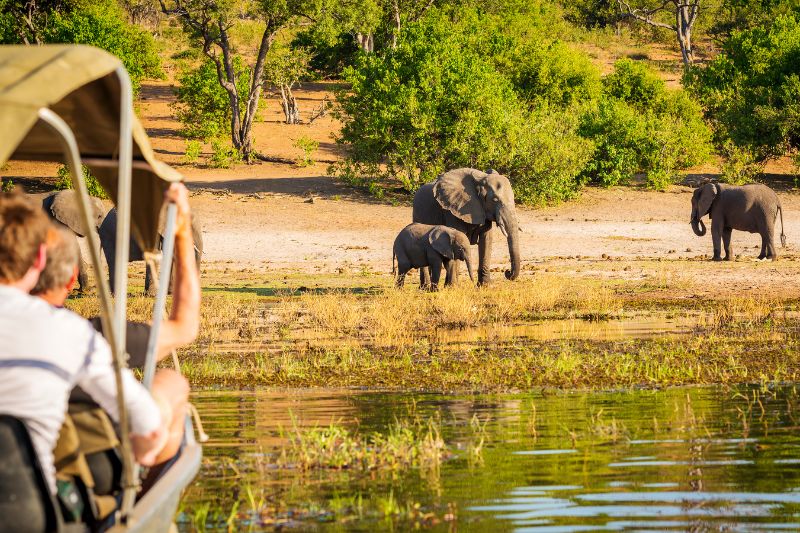
Whether it’s gliding through the winding channels of the Okavango Delta, exploring the mighty Amazon River, or cruising along the serene backwaters of Kerala, boat safaris offer a unique and unforgettable adventure for wildlife and nature enthusiasts alike.
No matter what type of safari you choose, it’s important to remember that these experiences are about more than just seeing animals. They are an opportunity to connect with nature, appreciate the beauty and diversity of our planet, and learn about the importance of conservation and sustainability.
Whether you’re a seasoned traveller or a first-time adventurer, a safari is an experience you won’t soon forget.
Anna is the founder of Really Wildlife. She's a 30-something lover of wildlife travel, vegetables and listening to the Lion King soundtrack on full blast.

- Find Your Tour
- Heavy Discount
- Enquire / Contact Us
- Send an Inquiry
- Map of Africa
- Contact Details
- African Safari Cost
- Travel Insurance
- Custom Safaris
- All Budget Safaris
- Africa Camping Safaris
- African Safaris for Seniors
- Exclusive Small Group Camping Safaris
- Gorilla Trekking Safaris & Tours
- Lodge Safaris
- Short Stay Tours
- All Overland Tours
- Camping Overland Tours
- Exclusive Overland Safaris
- Lodge Africa Overland Tours
- All Family Safaris
- Family Camping Safaris
- Family Lodge Safaris
- Family Safaris in East Africa
- Family Safaris in Southern Africa
- All Adventure Travel
- Great White Shark Diving
- Walking Safaris & Hiking Tours
- Chobe National Park
- Etosha National Park
- Garden Route
- Kilimanjaro
- Kruger National Park
- Ngorongoro Crater
- Okavango Delta
- Sabi Sands Game Reserve
- Serengeti National Park
- South Luangwa National Park
- Victoria Falls
- Zanzibar Island
- Masai Mara Conservancies
- Namib Desert
- Pilanesberg National Park
- South Africa
- Kingdom of eSwatini
- Dar es Salaam
- Johannesburg
- Livingstone
- Antananarivo
- Port Elizabeth (Gqeberha)
- Adventure Travel & Activities
- Africa Beaches & Islands
- African Animals & Conservation
- African Culture
- Best Things to Do
- Big 5 Safari
- Bucket List Ideas
- Family Safari
- Overland Africa & Budget Safaris
- Places in Africa
- Safari Costs & Budgeting
- Travel Tips & Planning
- Where to See
- Botswana (Okavango Delta +)
- Cape Town + Garden Route
- East Africa
- Kenya (Masai Mara +)
- Kruger + Sabi Sands
- Morocco + Ethiopia
- Namibia (Etosha +)
- Rwanda + Uganda
- South Africa, Lesotho + Eswatini
- Southern Africa
- Tanzania (Zanzibar, Serengeti +)
- Zambia, Zimbabwe + Malawi
- Safari Costs
- Client Reviews

What is a safari and what’s a wildlife safari in Africa like nowadays?
Of course, you've heard about African safaris and seen photos of celebs looking glamorous on safari in Africa. But, what is a safari really? And what is a wildlife safari in Africa like for the regular 21st-century traveller?
Here, we'll tell you all about African safaris and explain what a wildlife safari in Africa is like for most travellers nowadays. By the end of this post, you'll know what to expect on a wildlife safari in Africa today.
What is a safari?
A safari is a journey.
In the broadest sense, to go on safari is simply to travel . More specifically, a safari is a journey that involves going into nature to watch wild animals.

The roots of the word safari are Arabic (and later Swahili), but the modern concept of safari originated in Africa. Today safari is synonymous with Africa.
Can you only safari in Africa or can you go on safari outside of Africa?
Yes, safari is an African thing. Although you can go on a safari-style trip in places outside of Africa, safaris are essentially African.
Africa is the home of the safari. This is where the classical idea of the wildlife safari was born and evolved. The safari is firmly rooted in Africa.

That said, you can go on 'safari' in Australia, India, Canada, the United States, and other countries. Of course, there are wilderness areas where you can see wild animals, all over the world. But, none of the wild places outside of Africa are quintessential safari territory. Elsewhere you find wildlife expeditions or wildlife tours (safari-style trips).
You can take trips into the wilderness anywhere, but you can only truly go on safari in Africa.
What is a safari in Africa, then?
A safari is the most famous and sought-after type of holiday in Africa. Going on safari is widely considered the ultimate 'thing to do' in Africa. Usually, a safari in Africa implies a wildlife safari.
In essence, an African safari is any journey into the wilderness to observe free-roaming wildlife.
This traditional definition of a safari in Africa has expanded over time, however. Nowadays any trip in Africa where you spend some time in nature looking at free-roaming animals can be called a safari.

In summary, a safari is a journey (or expedition) to look at wild animals, especially in East Africa and southern Africa.
A safari in Africa is not...
A wildlife safari in Africa is not a trip reserved for khaki-clad bushwhackers and experienced game rangers or scientists. You don't have to be an outdoorsman like Bear Grylls to love your time on safari. Just about anyone can thoroughly enjoy an African safari in the travel style that suits them best.

A safari is not the same as a tour of a wildlife sanctuary or animal rescue centre. Even in Africa, visits to wildlife havens or shelters are not safaris.
A trip to an African zoo is not a safari. A wine-tasting tour in the Cape Winelands is not a safari. A township tour? No. A trip to meet the Omo Valley tribes in Ethiopia? Technically, not a safari. A road trip in Namibia? Also, strictly speaking not a safari - unless you visit a game park with wildlife, like Etosha.
An African safari is still different from a city holiday, beach vacation, historical tour, or cultural trip in Africa.
In Africa, a holiday only becomes a safari when you add an element of wildlife watching in nature. Be it game viewing by 4x4 safari vehicle, boat, canoe, small plane, or on foot, to name a few. Based on this broader definition of safari, boat trips and marine tours are often classed as 'ocean safaris'.

First, let's take a look at the traditional African safari and how it has evolved...
What does the word safari mean? (the origins of safari)
The word 'safari' originates from the Arabic word 'safara' which means 'a journey'. The Arabic word was later adopted by the Swahili of East Africa and adapted to become the Swahili word 'safariya' which means 'journey' or 'kusafiri' which means 'to travel'.
The English word 'safari' originates from the late 19th century. The word 'safari' was introduced into the English language as a foreign language word in 1858 and later adopted as an English word. It is said that the word 'safari' was introduced into the English language in 1860 by the legendary British explorer, Sir Richard Francis Burton. Then, in 1890 the English word 'safari' was added to dictionaries according to the Online Etymology Dictionary .
Today, traditional dictionary definitions of 'safari' still often include a component of hunting:
"...an expedition to observe or hunt animals in their natural habitat, especially in East Africa." and "A trip into any undeveloped area to see, photograph or hunt wild animals in their own environment."
Forget the old concept of a wildlife safari as a hunting trip - that outdated usage is history!
Safari now refers to an adventure or expedition into the wilds of Africa - with no hunting involved. African safari travel typically provides revenue for local conservation projects and game parks, helping to protect habitats and wildlife, rather than taking them out. African safaris also play an important role in creating awareness about wildlife conservation, as well as benefiting local communities.
A more modern definition of safari is, simply:
A safari (/səˈfɑːri/; from Swahili safari 'journey') is an overland journey to observe wild animals, especially in eastern or southern Africa. (Wikipedia)
The history of African safaris
The modern concept of the safari can be traced back to the early colonial era in Africa, from the late 1800s to the early 1900s. With the arrival of the first European explorers and colonizers came the first safari-style expeditions. Some of them aimed at exploring new territories, many for the express purpose of hunting animals.
On these early European-led expeditions, big game (large animals) were hunted and arduously lugged overland by a small army of local tribespeople.
Later, US President Teddy Roosevelt popularized the concept in the United States, when he embarked on a safari of enormous proportions , ostensibly with the aim of filling the Smithsonian Institute with African specimens. Some 11,400 Animals fell to the party's rifles, of which 512 were 'big game' - elephants, lions, leopards, buffaloes, hippos, and rhinos, including six white rhinos - rare even at that time.
Fast-forward to today and you will find that hunting is no longer part of most safaris in Africa. Thankfully the primitive pastime of hunting is largely something of the past. It is not the norm anymore and the vast majority of Africa has long moved on from this colonial-era practice.

Note: African Budget Safaris absolutely does not promote or sell hunting safaris, nor do we endorse hunting for sport. If you are contemplating a hunting safari, please consider opting for a wildlife-viewing safari instead.
The modern wildlife safari, making a difference in Africa
These days, most people have left the negative hunting connotations of safari travel behind. The outdated ideas of African safaris as hunting trips have largely been replaced by more modern concepts of wildlife safaris. The norm for a safari in Africa is now a socially and environmentally responsible form of travel.
Nowadays going on safari in Africa means taking an adventurous holiday and having a positive impact at the same time. Wildlife safaris now play a key role in sustaining African economies and protecting wildlife populations. So taking a safari holiday helps make a meaningful difference.

African safaris have become holiday trips that actually benefit the wildlife of Africa. As opposed to hunting wild animals, visitors get to encounter them and help protect them. Most safari tour companies and lodges either actively support (or run) conservation projects, or help generate tourism revenue which contributes to managing wildlife projects and game reserves in Africa.

Eco-safaris & eco-friendly safari travel in Africa
As environmental awareness has grown worldwide, African safaris have become more eco-friendly. Many safari lodges and tour companies have become more environmentally friendly in response to the sustainability challenges we face today.

Finding an eco-safari lodge or a low-impact safari in Africa is easier than ever before. Even the camps and safaris that aren't marketed as being 'green' or eco-friendly often are, in at least some important respects. The camps and lodges located in wilderness areas or national parks, for instance, are typically designed to have minimal impact on the environment and be as self-sufficient as possible due to their remote locations, national laws, and park regulations.
For eco-friendly safaris that reduce your carbon footprint and contribute to environmental sustainability, talk to us.
- More about eco-safaris in Going Green on Safari and Spectacular Eco-Conscious Safari Spots
Socially responsible safari travel in Africa
The modern African safari is a socially responsible journey. Not as an exception but as the norm. Not only does safari travel contribute massively to African economies and provide jobs, but it also helps improve social conditions.
Local communities across Africa benefit from sustainable tourism through social initiatives created and/or supported by safari organizations - from tour companies and lodges to activity providers, and game reserves. Safari travel also helps sustain small businesses and entrepreneurs selling goods (like local food, crafts, and curios) or providing services (such as guiding and entertainment).

Some safari companies directly support social upliftment projects and provide opportunities to interact with the local people. Others support local communities through the lodges, game reserves, and other companies they use.
- More about socially sustainable safaris in Responsible Safari: how to travel ethically
Safari travel's critical role in social and economic development
Africa's travel and tourism sector (of which the safari industry is an integral part) "employed more than 24 million people in 2019" based on World Travel and Tourism Council (WTTC) reports.
In particular, Africa's wildlife tourism industry, " usually generates $29 billion a year and employs 3.6 million people" according to Bloomberg (2020).
The safari industry generates some $12.4 billion in annual revenues for South Africa, Botswana, Kenya, Rwanda, Tanzania Uganda and Zambia - Africa’s top wildlife tourist destinations. (Reuters, 2020)
South Africa (which has the second-largest tourism industry in Africa) "relies on the tourism industry to indirectly contribute up to 9.1% of the country’s total employment – 1.5 million people – and 7% of its GDP" (Investment Monitor, 2021).
It is clear that safari travel plays a critical role in social and economic development in Africa. Not only through social upliftment and outreach programs but by producing substantial revenue and employment.
"During the past two decades, the hospitality industry has become vital to many African economies. In 2019 it accounted for approximately 7% of Africa’s overall GDP and contributed $169bn to its economy... according to the International Finance Corporation (IFC), part of the World Bank". (Investment Monitor, 2021)
In short, safari tourism "helps governments justify protecting wildlife habitat,” and “creates revenue for state wildlife authorities, generates foreign-exchange earnings, diversifies and strengthens local economies.” (Bloomberg 2020).
What African Safaris are all about these days
Today African safaris are holiday trips primarily aimed at watching and photographing wildlife in the bush, for fun.
Safari travel in contemporary Africa still implies game viewing and time in wilderness areas (game reserves, wildlife conservancies, and national parks). A traditional African safari is still focused on seeing African wildlife, but safaris are definitely not limited to game viewing.
In addition to game viewing and wildlife tracking, African safaris nowadays are about:
- the experience of being out in the bush (wilderness)
- exploring scenic places and natural wonders
- encountering the local cultures of Africa (old and new)
- visiting historical attractions and sightseeing
- volunteering and supporting good causes
- participating in adventure and outdoor activities ( adventure travel )
Once you're in the wilderness the safari truly begins. You'll spend most of your time enjoying untamed nature at the camps and watching animals in the wild.
Different kinds of safari trips offer a variety of ways to explore the wilderness and look for wildlife and birds. You can choose to explore by riverboat or canoe, on foot or by mountain bike, on horseback (even camelback) or quad-bike. The possibilities are endless with so many specialist safaris to choose from in Africa.

Big 5 Safaris in Africa, explained
The term 'Big Five' was originally coined by big-game hunters to refer to the most dangerous animals to hunt in Africa in the late 1800s.
Today, however, the Big 5 of Africa are the top animals that tourists want to see on wildlife safaris. The iconic African animals of the Big 5 are lions, leopards, rhinos, elephants, and buffalos.
Out of the Big 5 safari animals, only the buffalo is not threatened or endangered. Encountering the Big 5 African animals is now (usually) about the joy of observing them in their natural environment, learning about them, and taking photographs of them. A Big 5 safari is merely a wildlife safari that is focused on seeing and photographing the Big 5 animals of Africa in the wild.

What is a safari now? (in a nutshell)
The African safari has earned a new reputation. By large, the safari has evolved into a socially and environmentally responsible (often beneficial) style of travel in Africa.
Contemporary safaris encompass much more than the unforgettable experience of game viewing and staying in the bush. The 21st-century African safari combines wildlife encounters with a variety of fascinating and exciting travel adventures - from city stays and cultural interactions to beach getaways.
To plan your African safari adventures now, talk to one of our friendly travel experts .

Budget African Safaris to the best travel destinations
Southern africa safari & travel highlights:.
- Botswana Safari - Chobe Park, Okavango Delta, Moremi, Kalahari & Makgadikgadi
- Namibia Safari - Etosha Park, Namib Desert, Swakopmund, Fish River Canyon & Windhoek
- South Africa Safari - Kruger Park, Cape Town, Garden Route, Addo Elephant Park & KwaZulu-Natal
- Zimbabwe Safari - Hwange Park, Victoria Falls, Matobo National Park & Great Zimbabwe Ruins
- Zambia Safari - Victoria Falls, South Luangwa Park, Kafue National Park & Livingstone
East African Safari & Travel Highlights:
- Tanzania Safari - Serengeti Park, Ngorongoro Crater, Kilimanjaro, Lake Manyara, Selous Reserve & Zanzibar Islands
- Kenya Safari - Masai Mara, Amboseli Park, Lake Nakuru, Samburu Reserve, Tsavo National Park & Lake Naivasha
- Uganda Safari - Bwindi National Park, Kibale Park, Murchison Falls, Jinja & Queen Elizabeth National Park
- Madagascar Tours - Nosy Be Island, Andasibe Park, Montagne d'Ambre National Park & Masoala Peninsula
- Malawi Safari - Lake Malawi, Dzalanyama Forest, Liwonde Park & Nyika National Park
Too many African Safari options? Get in touch with us for up-to-date advice from one of our African safaris experts

“If there were one more thing I could do, it would be to go on safari once again.” - Karen Blixen (Author of “Out of Africa”)
[Article updated in May 2022]
Landia Davies Content Manager & Sculptor

Private Group?
A private, tailor-made safari is within your reach. Experience all of your bucket-list safari related items on a budget now.
Similar & Related Blog Posts
Below you'll find further reading and articles related or similar to this post.

- How Much Does an African Safari Cost? Your Budget Africa Safari Guide
To get started, basic African safari costs start at around US$ 150 per person per day for an all-inclusive budget safari package. That's the no-frills…

When is the all-round best time for African safari trips?
When is the best time for an African safari trip? ... This is a good question and an important one to ask when planning an African…

What are Africa Overland Tours all about?
On Africa Overland Tours it's not just the destinations that matter, it's all about the journey! You'll experience Africa in a group and usually…

10 Best National Parks in Africa (in the Top African Safari Countries)
Find the best national parks in Africa, located in the top African safari countries. This shortlist features the 10 best African national…

The Best Beaches in Africa - ideal to visit on African Safaris
Many of the best beaches in Africa combine seamlessly with the wildlife safari destinations that African travel is synonymous with. {image:7:small}You…

Cape Town Safari: The best Big 5 game reserves near the city (on a budget)
Cape Town is an amazing stand-alone travel destination. From the V & A Waterfront, Table Mountain, and penguins on Boulders Beach, to the Zeitz Mocca…

11 Solid Reasons to go on an African Safari Adventure
Going on safari in Africa is an unforgettable, unique experience offering an exciting mix of wildlife adventure, unusual cultural encounters and spectacular…

The Most Endangered Animals in Africa - Where to See Them & How to Help
The hard facts about 10 endangered and critically endangered African animals - most of which you can still see on wildlife safaris if you…

African Safaris for Seniors? Safe & easy budget senior tours
Are African Safaris suitable for seniors? Yes. African adventure travel for seniors is very popular with the demand for senior safaris in Africa…

Size Up Africa Overland Safaris - Small vs Big
Sizing Up your Overland Safari - cosy vs social 'How many people will be travelling together on this safari?' - a question you may want to…

African safaris with kids made easy: top tips for the best family safari
Going on an African safari with your kids is a truly unforgettable experience; I know this having just returned from four days in South Africa’s…

Private Tours & Custom Safaris in Africa (on a budget)
“I went on a tailor-made private safari,” you tell your friends freshly back from an incredible adventure. But “bespoke?” you ask.…

Where to Go for the Best Tanzania Safaris and Tours
Find out where to go on the best Tanzania Safari Tours this year. And see why these are the best destinations for an African safari in Tanzania. …

When To Go Where On Safari in Africa: Best Times to Visit
There’s never a bad time to go on safari in Africa. But there are better times, in terms of giving you the best opportunities to see what you want…

12 Exciting African Travel Trends
Quite a few of the new and growing travel trends are decidedly positive. Like the general shift towards healthier and safer travel, and more conscious…
These trips cover similar ground…
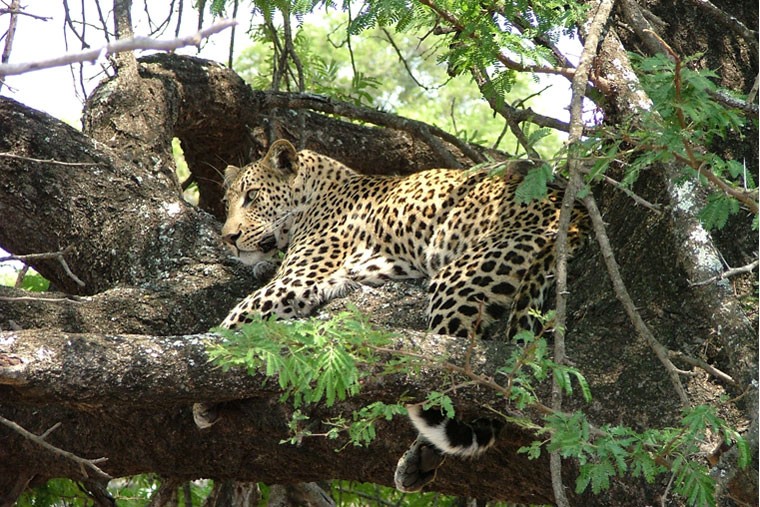
South Africa Walking Safari to Kruger & Zululand
A great holiday to South Africa with an emphasis on some great walking trails. Visit the Kruger National Park, Swaziland, the St Lucia area, the Battlefields…

8 Day Uganda Gorilla Safari from Kampala (Lodge Overland Tour)
A budget Uganda Gorilla Safari (Lodge Overland Tour) to see wild African Mountain Gorillas includes Uganda Gorilla Trekking, Murchison Falls & Chimpanzee…

9 Day Budget Masai Mara & Serengeti Safari - Tanzania & Kenya
This 9-day budget lodge safari is a Tanzania & Kenya Safari to Masai Mara, Serengeti National Park, Ngorongoro Crater & top African wildlife parks with…
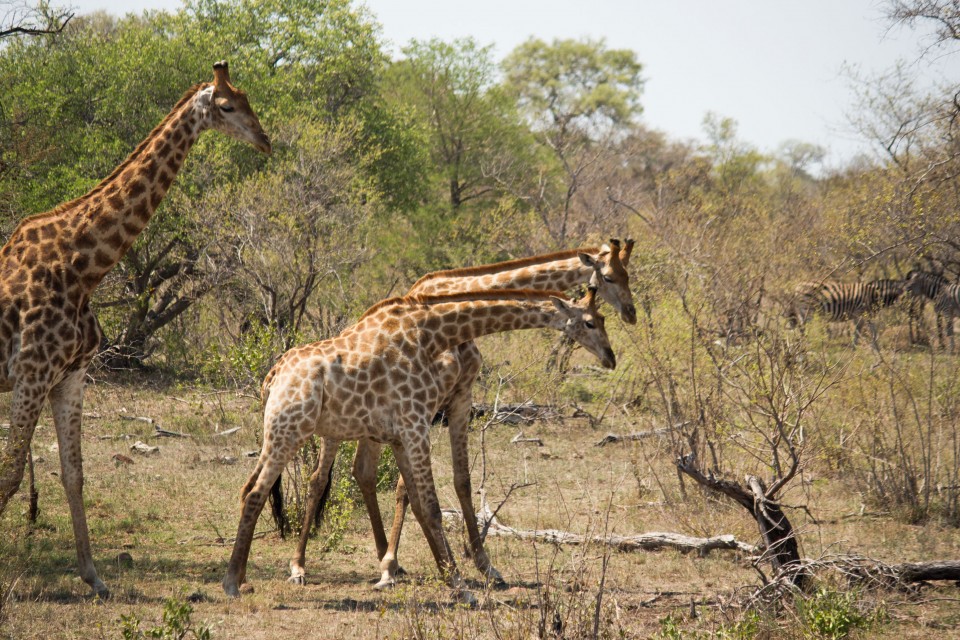
3 Day Kruger Safari & Private Reserves Camping Tour
Our budget-friendly Kruger Safari & Private Reserves Camping Tour in South Africa explores Kruger National Park and camps at private game reserves in Greater…

Best of South Africa Safari Tour - Johannesburg to Cape Town
The guided Best of South Africa Safari Tour (Johannesburg to Cape Town) is an excellent-value, small group budget lodge safari to top wildlife parks &…

Connect with us
Useful resources.
- Get Travel Insurance
- Book Flights
- Get Car Hire
- Signup for our newsletter
Popular Destinations
Latest blogs.
- How to plan an African safari on a very tight budget: the 8-step guide to safari planning
- The 10 Safest Countries in Africa to Visit (2022 Global Peace Index Rankings)
- Best Countries to Visit in Africa? Here are 15 Amazing African Countries
- South Africa Tipping Etiquette: 8 Top Tips for Tipping in South Africa

Call us toll free from US/Canada on 1-888-414-6513 , or from the UK on 0-808-189-1052 . All other countries can contact us on +27 21 791 0878 .
© 2024 African Budget Safaris | Privacy | Terms | Cookie Policy | Consent Preferences
- Cambridge Dictionary +Plus
Meaning of safari in English
Your browser doesn't support HTML5 audio
- activity holiday
- air corridor
- amenity kit
- caravanning
- high season
- phrase book
- post-holiday
- put something up
- ranger station
- tourist trap
- trailer park
You can also find related words, phrases, and synonyms in the topics:
safari | Intermediate English
Examples of safari, translations of safari.
Get a quick, free translation!

Word of the Day
put a spoke in someone's wheel
to make it difficult for someone to achieve something they had planned to do

Worse than or worst of all? How to use the words ‘worse’ and ‘worst’

Learn more with +Plus
- Recent and Recommended {{#preferredDictionaries}} {{name}} {{/preferredDictionaries}}
- Definitions Clear explanations of natural written and spoken English English Learner’s Dictionary Essential British English Essential American English
- Grammar and thesaurus Usage explanations of natural written and spoken English Grammar Thesaurus
- Pronunciation British and American pronunciations with audio English Pronunciation
- English–Chinese (Simplified) Chinese (Simplified)–English
- English–Chinese (Traditional) Chinese (Traditional)–English
- English–Dutch Dutch–English
- English–French French–English
- English–German German–English
- English–Indonesian Indonesian–English
- English–Italian Italian–English
- English–Japanese Japanese–English
- English–Norwegian Norwegian–English
- English–Polish Polish–English
- English–Portuguese Portuguese–English
- English–Spanish Spanish–English
- English–Swedish Swedish–English
- Dictionary +Plus Word Lists
- English Noun
- Intermediate Noun
- Translations
- All translations
To add safari to a word list please sign up or log in.
Add safari to one of your lists below, or create a new one.
{{message}}
Something went wrong.
There was a problem sending your report.
- Skip to primary navigation
- Skip to main content
- Skip to primary sidebar
Carnegie Museum of Natural History
One of the Four Carnegie Museums of Pittsburgh
The Meaning of Safari
Watching a gorgeous sunset over the South African terrain, I’ve never felt more connected to my life’s calling of conserving wild animals and wild places. I was half-way around the world, experiencing nature in a way that I never had before. This experience has shaped the very core of who I am, what I believe in and what I fight for.
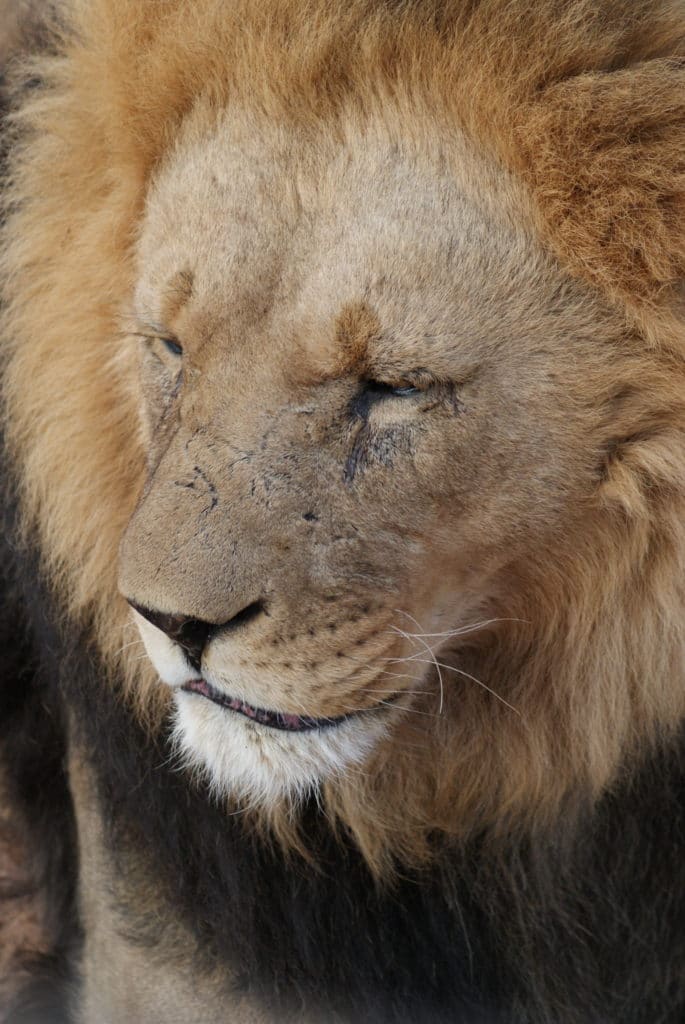
The meaning of the word ‘safari’ has changed over the last few hundred years. The term ‘safari’ originally referenced large scale game hunts, with participants often hunted Africa’s ‘big five,’ which includes the lion, leopard, elephant, rhinoceros, and Cape buffalo. These animals were on the verge of extinction by the late 1700s. Through the decades, the term has taken on new meaning. Today’s safaris focus on observing, photographing, or recording wildlife in its natural state. Safaris provide us a chance to appreciate and experience our wild spaces it in a completely different way.
In 2011, poachers attacked three rhinos at the Aquila Reserve, two of whom succumbed to their gruesome injuries. Rhino poachers seek illegal body parts, like rhino horns, to sell to the highest bidder. Poachers are only interested in adult animals with large horns, often leaving juvenile rhinos to die without a care giving parent. In response to the 2011 attack, Saving Private Rhino was born. This non-profit organization has grown over the years to be a vital resource for the rhinos of South Africa. Saving Private Rhino provides many critical resources including telephone support; rhino ‘ carer’ dispatches to reserves; transportation of orphaned rhinos to orphanages; training on orphan care; and reconstructive surgery performed by a veterinarian–all free of charge. This 24-hour service is offered to reserves in South Africa. Saving Private Rhino has also launched its first training course designed to train rangers in anti-poaching tactics with a goal of having two trained rangers working at every reserve.
But my experiences went far beyond just viewing nature. My idea of a ‘safari’ had changed forever. Aquila isn‘t just a space where you can observe wildlife; it’s a place where an entire community is working together towards a sustainable future, providing the resources and education needed to protect and conserve local wildlife. It reminds me that we all have power with our choices. And we can use our power to support organizations that contribute to sustainability, conservation and community advancement.
In Swahili, safari merely means, ‘journey.’ I visited Aquila in 2017, but a new chapter of my journey had just begun.
Leslie Wilson is the On-Site Program Manager and Veterinary Technician for Carnegie Museum of Natural History. Museum employees are encouraged to write about their experiences so they can be shared on the blog. Leslie wrote this blog specifically for our Super Science Saturday: Stuffed Animal Safari program.
- Mission & Commitments
- Directors Team
- Museum History
Get Involved
- Carnegie Discoverers
Bring a Group
- Groups of 10 or More
- Birthday Parties at the Museum
- Field Trips
- Powdermill Nature Reserve
- Powdermill Field Trips
- Powdermill Staff
- Research at Powdermill
More Information
- Image Permission Requests
- Accessibility
- Shopping Cart
- Visitor Policies

What is an African Safari
What is an African safari?
Practically speaking, an African safari is a vacation or tour to a wildlife reserve in an African country for the purposes of seeing and photographing a range of wildlife in their natural habitat, in order to observe their natural way of life. African safaris are about immersing oneself in nature and observing wildlife go about their daily life, unhindered by the human race. Meeting locals and learning about their fascinating culture is also an enlightening experience whilst on safari. But above all, a safari in Africa is about going on an adventure and not knowing what to expect next.
The Different Types of African Safaris
Luxury and mid-range luxury safaris.

Incredible elephant sightings are part of the dining experience at the luxurious Kanga Camp.Luxury safaris are offered in all the best wildlife viewing game reserves in Africa - often in private concessions, and will include top-end or mid-range luxury lodges and tented camps. These lodges and camps provide unbeatable valuable: ensuring guest privacy, world-class facilities, a personalized service, exclusive game viewing activities, and opulent accommodation. These safaris are generally fully inclusive - all your meals, local brand beverages, and a range of safari activities. The most lavish of lodges will even include private dining experiences, spa treatments, and a private butler service.
Fly-in Safaris

Scenic air transfers are how one gets around Kenya, flying low enough to admire the landscape and wildlife.In remote safari destinations such as Botswana, flying directly to a reserve and flying between different reserves, is the most feasible transportation option. It not only allows one to visit inaccessible places but often avoids driving on roads comprising of deep sand or rough gravel. Although fly-in safaris are usually more expensive and often require the use of smaller charter flights with strict luggage restrictions, they do save a lot of time - especially when you are visiting for a short period of time. These smaller planes fly below the clouds, offering incredible views of the wilderness and animals.
Walking Safaris

Walking safaris are a great way to learn about fauna and flora that is of great significance to the African bush.Nothing gets the heart pumping as fast as a walking safari does in big five country. Many lodges in Africa generally provide short guided bush walks as part of their safari offering but there are also those that focus the guest experience entirely around walking. These safaris are led by armed and highly trained guides and sometimes even a tracker. These guides offer a fountain of knowledge, sharing interesting facts about plants, trees, birds, skat, and animals. Walking safaris allow one to feel part of the bush and awaken all of your senses - appreciating the gift of sight, taste, and smell.
Mobile Camping Safaris

Experience an authentic wilderness experience at Zambezi Expeditions Camp in the iconic Mana Pools National Park.Mobile camping safaris vary in group size, some operating with as little as two travelers and others with as many as twelve. A safari of this kind requires travelers to move around a lot more than any other safari experience, winding through the wilderness on 4x4 vehicles - getting that much closer to nature. Mobile camping safaris have the lowest impact on the environment and are definitely suited to the more adventurous traveler. The camps are set up by the staff and sumptuous meals are prepared over an open fire. The more luxurious mobile safaris will run with a smaller number of guests and guests tents are decked out with comfortable beds, chairs, lighting, and warm bucket showers.
Specialist Safaris

Nothing is more tranquil than gliding through the shallow channels of the Okavango Delta in a mokoro.A specialist safari focuses on specific interests pertaining to a safari. These one of kind experiences are led by guides that have trained in this particular field, ensuring an unforgettable guest experience. Some specialist safaris are only available on a private basis or operate in small groups. Here are some of the specialist safaris on offer in Africa:
- Photographic safaris
- Birding safaris
- Horseback safaris
- Canoeing safaris
- Gorilla trekking safaris
- Wildlife tracking safaris
- Whale watching safaris
Safari Activities
Game Drives Game drives are the core component of a safari because they cover a lot more ground than any other activity. In some reserves, game drives could be a full day affair but generally game drives are offered in the morning and late afternoon for about 3 to 4 hours at a time.Game drives in private reserves offer the most exclusive game viewing opportunities, with the number of guests and vehicles limited. The safari vehicles are open-sided except for East Africa where the vehicles are top open. Safari vehicles in private concessions are permitted to go off road - allowing guides to track animals and follow them into the bush. The morning game drives are generally the best for game viewing and often the best time to sight predators. Late afternoon game drives will often see animals grazing, resting in the shade of a tree, or drinking from waterholes. Once the sun sets and temperatures drop, guests have a greater opportunity of seeing nocturnal species and possibly even witness a kill as lions favor the cooler evenings to hunt.
Bush Walks Short walks are offered at several lodges and camps as a mid-morning activity. You climb into a vehicle and drive into the bush with your armed guide. After a safety briefing, you head out on foot to discover the different fauna and flora. A bush walk is a great way to learn about the much smaller yet significant creatures of the bush, as well as animal tracking. Bush walks most certainly heighten your senses as you rely on your sight, hearing, and nose.
Boating/Mokoro/Canoeing Safaris on the water offer a different game viewing perspective, generally offering up-close views of hippos, crocodiles, aquatic birdlife, water antelope, and even elephants taking a swim. Mokoro (traditional dugout canoe) safaris are often the highlight on a safari in Botswana, gliding quietly through the shallow waters of the Delta. Boating safaris cover a lot more distance and are thoroughly enjoyed in places such as Chobe National Park, where the Chobe River is the main source of water for the wildlife. Sightings of elephants playing and swimming in the river are a usual occurrence in Chobe.Canoeing safaris are a popular choice in destinations such as Zambia and Namibia, riding the rapids and discovering wildlife along the way.
Bird Watching Bird watching is a fun activity that is possible at any of Africa’s game reserves. With as many as 500 species of birdlife to be seen in places such as the Kruger and Chobe national parks, bird lovers will have plenty to mark off their species list, some even endemic to the region. Staying in private reserves affords bird watchers the opportunity of spotting birdlife from the comfort of their lodge or camp, during game drives and bush walks, and various bird hides located in some of the game reserves. Private Birding safaris can also be arranged in some instances.
Hot Air Balloon Rides A hot air balloon safari is only possible in certain reserves across South Africa, Botswana, Namibia, Kenya, and Tanzania. Taking to the sky as the sun begins to rise is an experience you will never forget. As the sun lights up the savannah plains, lakes, and lagoons, so the bush comes to life. It’s a bird’s eye view of the region’s diverse landscape and incredible wildlife often gathered in areas unattainable by game drives. It is important to note though that balloon safaris only run if the weather conditions are good.
Scenic Flights Scenic flights have become a popular activity choice amongst visitors to Africa, often perceived to be the fastest way of seeing some of the world’s natural wonders - flying over the mighty Victoria Falls, spotting wildlife in a big five game reserve, and admiring the vastness of the Namib Desert. Flying safaris are generally private experiences conducted in smaller aircraft such as bantam microlights and helicopters. In places such as the Okavango Delta, travelers get to experience incredible views of the Delta and its intricate network of waterways during their light aircraft transfers.
Wildlife Interactions Throughout Africa, travelers will encounter several wildlife rehabilitation centers and animal orphanages that offer educational interactions, and in some cases like the Daphne Sheldrick Elephant Orphanage, visitors can even adopt an elephant. It is an opportunity for people from around the world to gain a better understanding of animals, and contribute to their protection and care within these facilities. Game reserves such as Shamwari and Phinda even offer their guests the option of actively getting involved in wildlife conservation - anti-poaching, darting, moving of animals.
Mountain Biking & Horse Riding Safaris Mountain biking like walking is a great way to get close to nature, with the exception of covering more ground than simply exploring on foot. Without the restrictions of a vehicle, mountain biking safaris are a thrilling experience and are offered as part of the safari experience at lodges and tented camps in South Africa, Kenya, Tanzania, and Zambia.It’s also the perfect way to burn off those calories from the decadent cuisine that comes with a safari. Mountain bike safaris are offered at several camps
Gorilla Trekking Often regarded as the ultimate safari experience in Africa, gorilla trekking is by permit only and is generally limited to a group of eight people. Uganda, Rwanda, and the Congo offer the opportunity to get up close to these gentle giants in their natural habitat. Trekking through a petrified forest to find endangered mountain gorillas could take as long as five hours. Once you find your assigned gorilla family, you will have an hour to admire and photograph them. The minimum distance between visitors and gorillas is seven meters but it is not uncommon for gorillas to walk up to or through the group.
Ocean Safaris An ocean safari starts and ends on one of Africa’s most pristine beaches. It’s about experiencing close encounters with various whale species and dolphins whilst out at sea on a boat. Other ocean safaris include shark cage diving off the coast of Cape Town and diving amongst coral reefs in South Africa, Mozambique, and Seychelles.
How to Plan an African Safari
Traveling to Africa is a big deal! With so many safari tours out there to choose from, pinpointing the right safari can be somewhat difficult.
A lot goes into the planning of a trip to Africa with various elements to consider, including flights, transfers, lodges, travel insurance, and activities.
Our advice is simple - use an accredited travel company that specializes in trips to Africa. There is value in knowing that you are chatting to someone who knows what they are talking about and will be there for you every step of the way. Not planning a trip to Africa correctly is easy and can be disastrous.Read on further if you want to find out how to book the perfect African safari...
Let's Get Planning
Top Destinations for an Unforgettable African Safari
Whether you travel to the eastern reaches of Africa or the south, each is diverse in landscape, wildlife, and experiences.
South Africa boasts some of Africa’s best big five game reserves, including the Kruger National Park, Madikwe Game Reserve, KwaZulu Natal, and the Eastern Cape.
Botswana is a popular safari destination known for its exclusive safari experience. Glide through the crystal clear waters of the Delta on a mokoro, discover the big five and endangered wild dog on game drives in the Moremi, cruise along rivers in a speedboat and see hippos, crocodiles and even herds of elephants up-close. There is so much to experience in this vast wilderness. Tanzania and Kenya are renowned for the world’s greatest mammal migration and offer sightings of animals in huge numbers. It is here where one can view the big five, climb mountains, or even spend some time relaxing on a tropical beach. Zambia and Zimbabwe share custody of the mighty and glorious Victoria Falls - the world’s largest curtain of falling water. But each side of the falls also offers a safari adventure of a lifetime. Game reserves such as Hwange and Mana Pools in Zimbabwe, and Lower Zambezi and Kafue in Zambia are top choices for. These parks are the essence of wild Africa - remote, home to an abundance of wildlife, and great for walking safaris. Rwanda , Uganda and the Congo offer the ultimate safari experience in Africa - the opportunity to come face to face with some of the world’s last remaining mountain gorillas. These protected parks are also home to other animal incredible species such as golden monkeys and chimpanzees.
The Cost of a Safari
The cost of a safari can vary based on several factors, however, the two biggest contributors are logistics and comfort - the use of charter flights to access remote safari destinations and operational costs such as running generators and delivery of supplies. In conclusion, the more remote the destination and the more luxurious the accommodation, the higher the cost of a safari.Read on further to gain a better understanding of the cost of a safari.
More Stories from Archive

10 Types of African Safaris: Different Ways to Experience a Safari
Customers rate Zicasso's travel referral service 4.9 on a scale of 1 to 5 based on 1548 reviews on Trustpilot
We match you with top tour companies that specialize in the trip you want, whether it's a customized private tour or a group tour.
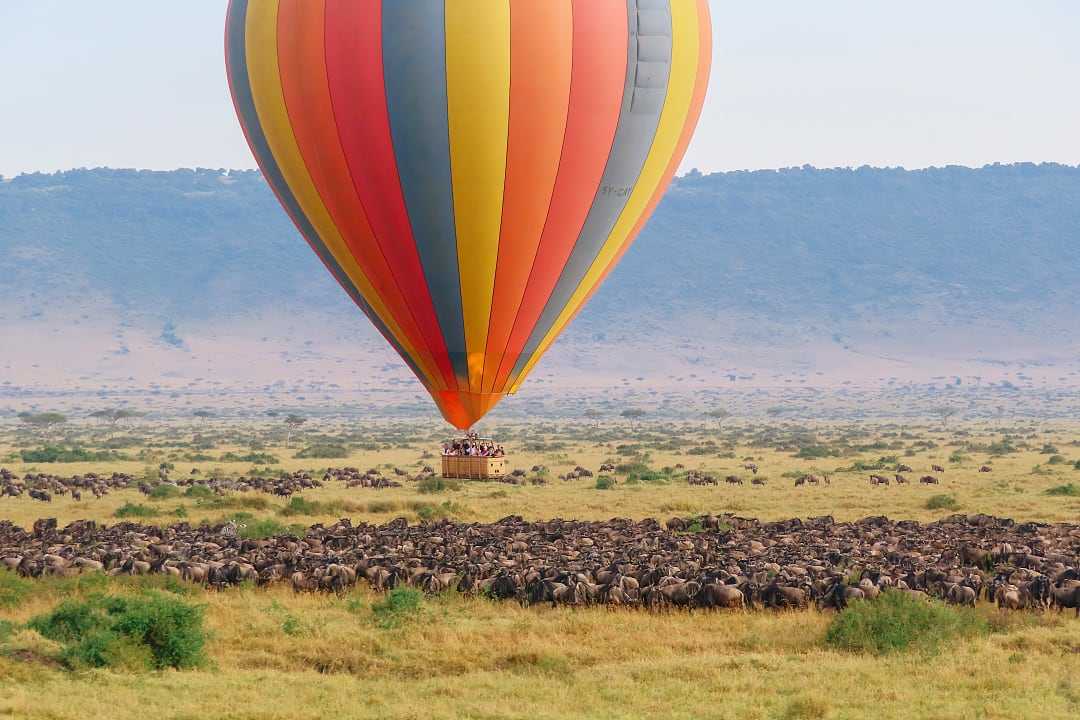
Aerial safari
There are countless ways to experience a safari, from open-vehicle game drives to guided walks and horseback riding, and we have compiled 10 types of African safaris you can choose from.
From open savannahs and forested havens to breathtaking mountain landscapes with rolling hills overlooking water channels, the scene is set for a dramatic animal encounter, no matter how you choose to safari.
Whether it's a complete experience or a combination of options, your safari is bound to be unforgettable, no matter which option you decide upon.
1. Guided Game Drives
2. walking safaris, 3. aerial safaris, 4. mountain bike safaris, 5. water safaris, 6. horseback safaris, 7. primate safaris, 8. mobile safaris, 9. photographic safaris, 10. hideout safari experiences, experience the best types of african safaris.
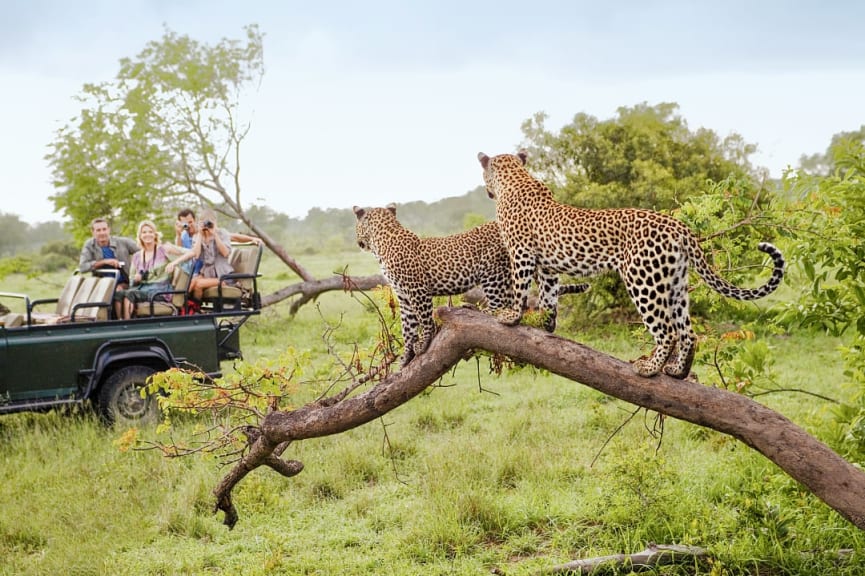
Game drive in Kruger National Park, South Africa
Stepping into an open 4x4 safari vehicle, you may get a sense that something quite unique is about to begin. The optimum viewing platform, a game drive is not only the most popular way to experience a safari, but one that allows you to traverse vast landscapes for a stunning experience in Africa.
Journey across open savannahs, through rocky outcrops, and forested hideouts, coming across a herd of elephants or a lone kudu as you quietly pass wildlife in action. Game drives are an excellent way to see the wildlife, whether on Kruger National Park safaris or Serengeti safaris .
Night drives provide an opportunity to spot nocturnal favorites such as aardvark and civet, and experience the haunting yet exhilarating sounds of the bush after dark. Guides and trackers will use spotlights to reveal wildlife in trees and on land as you navigate under a brilliant African night sky.
Best Places for Guided Game Drives: Kruger National Park, South Africa • Sabi Sands Game Reserve, South Africa • Masai Mara National Park, Kenya • Serengeti National Park, Tanzania • Chobe National Park, Botswana • Okavango Delta, Botswana • South Luangwa, Zambia
Expert Tips for Discerning Travelers
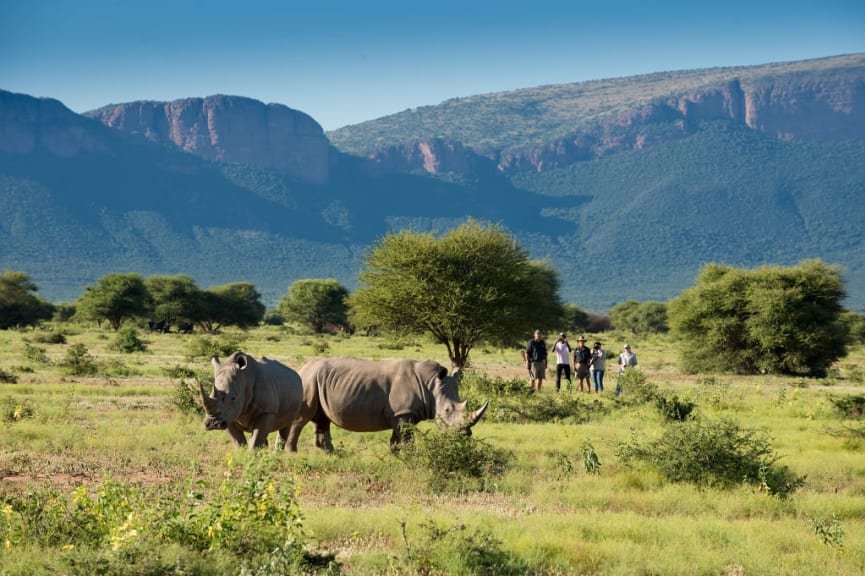
Bush walk with Marataba Safari in South Africa. Photo courtesy MORE Family Collection
A walking safari gives you a more intimate experience of the land and wildlife, guided by a trained professional who understands the terrain and animal life across the best African safari countries .
Tribal communities have lived in proximity to wildlife for millennia, with guides sharing their respect for the environment and its inhabitants with safari walkers.
Get a deeper understanding of the flora and fauna around you and enjoy up-close and personal encounters with the smaller members of the animal kingdom, such as beetles and small birds.
Best Places for Walking Safaris: Chief’s Island, Okavango Delta • Kruger National Park, South Africa • North Luangwa, Zambia • Selous Game Reserve, Tanzania • Serengeti National Park, Tanzania • Amboseli National Park, Kenya
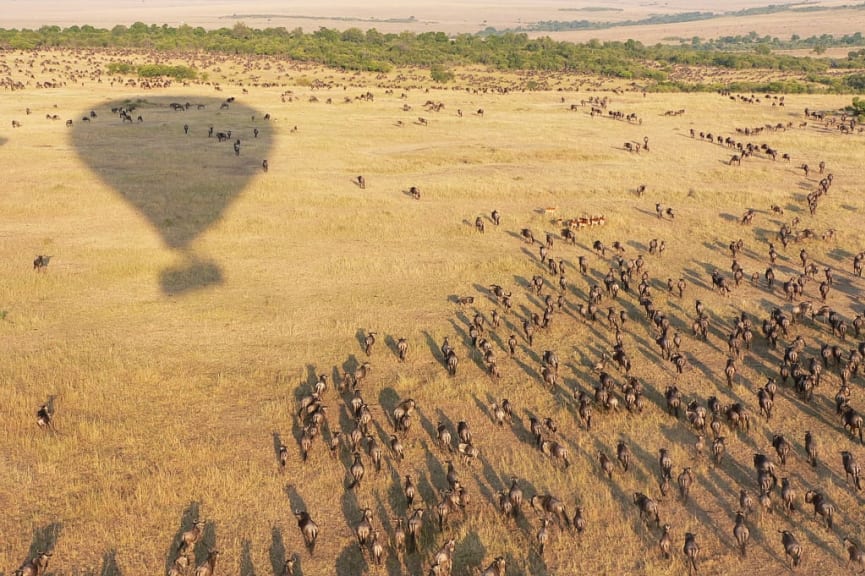
Aerial safari in Tanzania
An aerial safari gives you a macro panorama of the landscape and wildlife of any destination, the action and drama unfolding beneath you.
Such a safari could take the form of a hot-air balloon ride, microlight flight, helicopter flip, or one on a small plane conducting air-hops between destinations, each providing a view of the scale and wonder of the wilderness, no matter when you go on an African safari .
You may find herds swirling across the grasslands or plains lined with marching elephants, each sighting unique in its unfolding. A safari from the air is one of the most incredible ways to enhance such an experience, with exceptional options on Masai Mara safaris .
Best Places for Aerial Safaris: Serengeti National Park, Tanzania • Masai Mara National Park, Kenya • Okavango Delta, Botswana • Virunga National Park, Rwanda • Kafue National Park, Zambia

Biking in Kenya
Picture traversing a vast landscape on 27-inch tires as you take a mountain bike safari through nature reserves and parks, keeping an eye out for game along the way.
Terrain changes from open savannahs to rugged pathways set among lush rainforests, with opportunities to spot animals in trees and around rocky outcrops. Your qualified guide will point out, from a safe distance, a variety of wildlife.
Enjoy the freshness of the great outdoors, the satisfaction of being active, and the thrill of cycling through parks and reserves, immediately at one with the African bush.
Best Places for Mountain Bike Safaris: Northern Tuli Reserve, Botswana • Laikipia, Kenya • Lower Zambezi, Zambia • Bushmans Kloof Wilderness Reserve, South Africa • Gonarezhou-Malilangwe, Zimbabwe
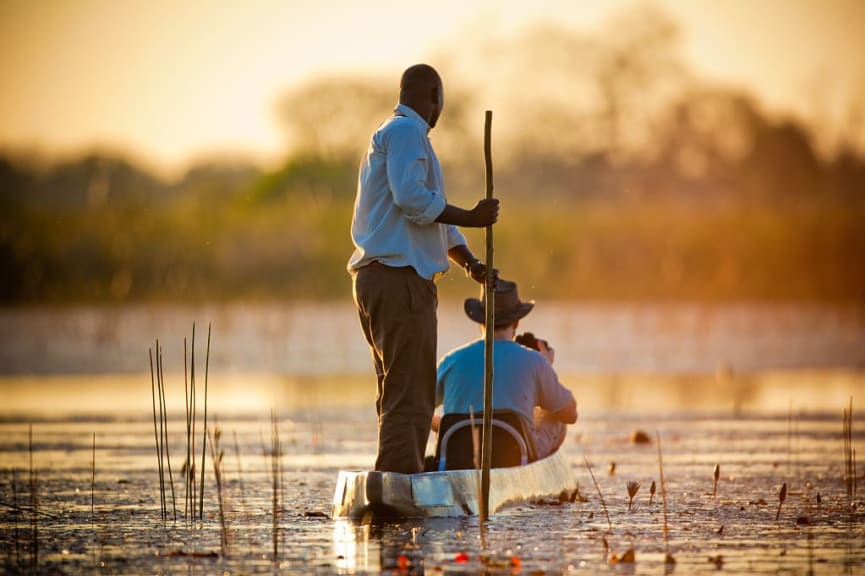
Mokoro boat safari in the Okavango Delta, Botswana
With a huge focus on water for the land’s survival, it makes sense that one of the more popular ways of experiencing a safari is on water.
With predators and prey tentatively eyeing permanent water sources, game viewing from a mokoro (dugout canoe) or small boat brings you close to the action in a unique way, even when looking for the Big Five and Little Five .
Channels, rivers, and lakes reveal wildlife beneath the surface and on land nearby, creating an immersive yet slow-paced exploration. Boat safaris are one of the best ways to experience the wilderness by waterways, especially on Okavango Delta safaris .
Best Places For Water Safaris: Okavango Delta, Botswana • Chobe Game Reserve, Botswana • Selous Game Reserve, Tanzania • Lake Manyara, Tanzania • Lake Nakuru, Kenya • Kruger National Park, South Africa • Etosha National Park, Namibia

Lewa Conservancy, Kenya
A horseback safari is one of the most unusual yet inspiring ways to experience the wilderness. Skilled and semi-skilled riders follow trails and tracks through nature reserves and forested parks where predators are a safe distance away.
Imagine coming across a tower of giraffe grazing in the trees above or leading your horse to a shaded rest spot where, once dismounted, a warm beverage awaits you.
Discover parts of a game park or reserve where vehicles may not be allowed to take advantage of snapping some wonderful wildlife shots as you quietly approach antelope, birds, and diverse and breathtaking landscapes and habitats .
Best Places for Horseback Safaris: Makalali Game Reserve, South Africa • Matlapeng Reserve, Botswana • Tuli Reserve, Botswana • Pakamisa Private Game Reserve, South Africa • Hwange National Park, Zimbabwe • Masai Mara, Kenya
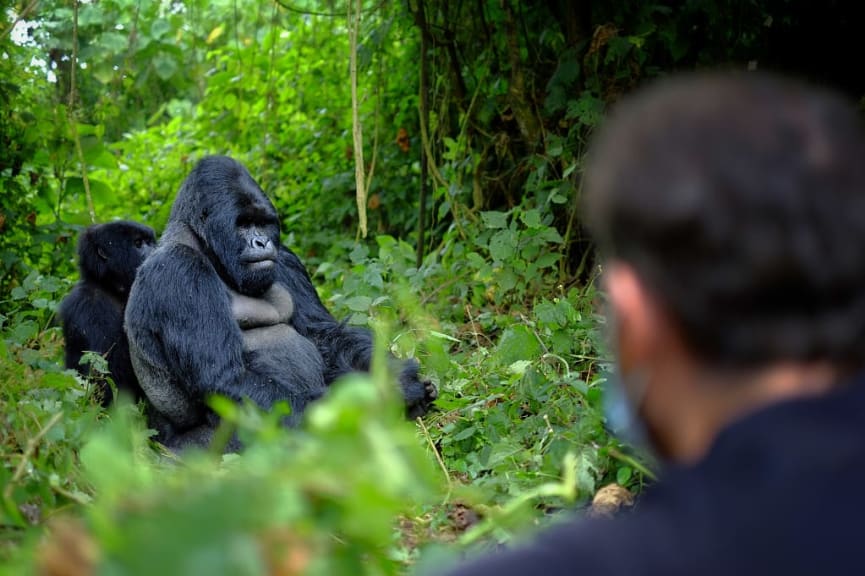
Volcanoes National Park in Rwanda
A primate safari takes you deep into the jungle or forested terrain of East Africa in search of wildlife like mountain gorillas or chimpanzees.
Discover the wonders of a guided trek through otherwise impenetrable forests, ending up on lush mountain slopes in search of primates swinging from tree to tree or chewing on plant matter. From Rwanda gorilla trekking to Uganda safaris , the encounters with primates are sensational on these expeditions.
This type of safari requires planning well ahead, with opportunities to incorporate other safari types before or after a gorilla or chimpanzee trek.
Best Places for Primate Safaris: Bwindi Impenetrable Forest, Uganda • Volcanoes National Park • Mgahinga Gorilla National Park, Uganda • Kibale Forest, Uganda • Gombe Stream National Park, Tanzania • Mahale Mountains National Park, Tanzania

Serengeti National Park, Tanzania
The beauty of a mobile safari is being able to wake up in one location, then end your day sipping a beverage of choice beneath the stars in a different spot.
Reducing a safari-goer’s carbon footprint and being able to relocate as often as your itinerary allows make mobile safaris popular.
Accommodations are comfortable and simple, easy to pack up and move, with all the mod cons necessary for this kind of experience. Gain access to more sites and sounds with a mobile camping safari.
Best Places for Mobile Safaris: Chobe Game Reserve, Botswana • Serengeti National Park, Tanzania • Masai Mara National Park, Kenya • Sabi Sands Private Game Reserve, South Africa

Game Drive Photo Vehicle in South Africa. Photo courtesy of MalaMala Camp. Photo courtesy of MalaMala Camp
Embark on a photographic-focused safari, during which time doesn’t seem to exist as you patiently wait to capture that perfect shot, the African bush your inspiration.
Professional guides help direct you to ensure you are positioned just right to get that winning picture. Staying on a siting or venturing into unique locations within parks and reserves, your time out on safari is yours to get as creative as you want.
Vehicles are fitted with special camera holders, each guest assured of optimal viewing throughout the drive. For a walking safari experience, your guide will ensure open spaces, great lighting, and perfect timing are the order of the day. How you want to experience your photographic safari is one of the many reasons to plan your trip with a safari travel specialist .
Best Places for Photographic Safaris: Okavango Delta, Botswana • Tsavo West, Kenya • Kruger National Park, South Africa • Sabi Sands, South Africa • Amboseli National Park, Kenya • Timbavati Game Reserve, South Africa • Ngorongoro Crater, Tanzania

Etosha National Park, Namibia
This may seem a strange way to conduct a safari, but viewing animals from the safety and comfort of a hideout offers a unique perspective on game viewing.
Whether coming upon a hidden locale or strategically located structure, sometimes slightly underground, hides offer seating and windows to the show unfolding before you. Unseen, you have the chance to spot without being spotted, including when exploring the best places to visit in Africa on safari .
Some have you placed at eye level with game at a watering hole, while others may see you set high up in a tree, a bird’s-eye view of your surroundings offering an opportunity to spot wildlife far and wide.
Best Places for a Hide Safari Experience: Kruger National Park, South Africa • Sabi Sands, South Africa • Timbavati Game Reserve, South Africa • Madikwe Game Reserve, South Africa • South Luangwa, Zambia • Etosha National Park, Namibia

With a variety of ways to experience an African safari, the choices may seem impossible. However, depending on time and preferences, options are available as stand-alone adventures or a combination of a few. Imagine a few days on a guided game drive followed by a walking safari expedition or primate discovery.
To discover a wealth of information and inspiration, visit our African safari travel guide and take a look at our African safaris . One of our expert safari specialists will be on hand to assist you when you are ready to book your specific safari style.
Life-Enriching Travel Designed Just for You
Trips curated by the world’s top destination experts
Concierge-level service leading up to and during your trip
Unique, exclusive experiences and insider access
Help Me Plan My Trip
Get Top Travel Specialists to Help Plan Your Trip
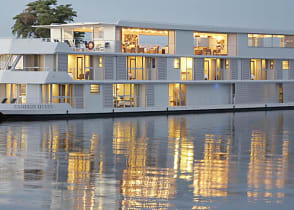
The History of Safari - How it All Began Throughout the 20th century, the safari has been popularized in film and literature through grand tales of adventure, romance and thrills. But just how long has this activity been going on? What was going on safari like 100 years ago? Read on to learn about where it all started … First, the word safari originated from the word “safar”, which is an Arabic verb that roughly translates to mean “to make a journey.’” From there, you get the noun “safariya,” or journey and then to safari which is actually a Swahili synonym of the Arabic word. Clearly, in this original definition, you do not get connotations of tents, backpacks, hiking and Land Rovers that are currently associated with the concept of safari. Rather, in its original context, it referred to the long distances people would have to traverse for trade routes and so forth.
The earliest safaris recorded were primarily focused around the trading industry. With the Arabic and African cultures so closely connected during our early in human history, there would often be large caravans of traders traveling across vast landscapes to bring their wares from one city to the next. According to The History of Safari, Travel Africa, in the 18th century, trading was a profitable and successful business as many prized items -- and unfortunately, even people -- were sold and used for barter.
According to Gemma Pitcher in Tanzania’s Safari History, European safari caravans were large-scale operations that involved a huge contingent of staff and crew along with supplies and weapons. Some of these trade routes were rather treacherous, so skillful bartering and negotiating also played a crucial role in getting from point A to point B, especially when dealing with trading slaves.
Fortunately, the safari that was associated with slave trade ended before the turn of the 20th century, changing the purpose of safaris from a business focus to a fun adventure or exploration. According to People Behind the Names, African Wildlife & Conservation, early naturalists and explorers like William John Burchell, Thomas Ayres and Gustav Adolf Fischer not only redefined the purpose of the safari, but were instrumental in identifying several species of animals. Their legacy is the great work they did during their exploratory travels, and of course, the animals that now carry their names:
• Burchell’s Coucal, Courser, Sandgrouse, Starling and Zebra • Ayres’ Hawk-Eagle and Cisticola • Fischer’s Lovebird, Sparrow-Lark and Turaco
Unfortunately, along with these great naturalists and men of science came the hunters, who revealed a more negative side of human nature -- the side that wants to rule and dominate. In some cases, the safari become associated with the “hunt”, that is, conquering the big unattainable wild beast and returning from the hunt with trophies ranging from hides, skins and heads, to an entire beast. Of great renown were hunters like William Cornwallis Harris, who not only hunted big game, but documented the hunts so that everyone would be aware of his courageous adventures into the African wilderness.
Despite his fame for hunting, Cornwallis was also a keen observer of nature, garnering credit for his discovery of the sable antelope (aka Harris Buck). Oddly, his writings and watercolor drawings of the mother continent created a new sense of awareness and appreciation for the wildlife of Africa. Another great hunter/explorer was Frederick Selous, whose safari exploits in East Africa consisted of shooting elephants and collecting specimens for museums in Europe.
Ironically, it’s because of men like Seleous and Harris that the conservation movement ignited. This movement would ultimately sanction saving these pillaged areas of Africa and the native wildlife, allowing them to continue to exist unspoiled for future generations and leading up to today’s photographic safaris.
Eyes on Africa , an African safari company, boasts an extremely knowledgeable team of staff members, who are passionate about every aspect of travel to Africa, including its wildlife and safari destinations. When you're ready to plan your African safari, a holiday in Africa, or if you just have questions, please feel free to contact us toll free at 800-457-9575 or visit our web site at http://www.eyesonafrica.net/contactus.htm and complete an information request form.

African Safari Terms: What You Should Know Before You Go
If you’re planning on going on an African safari, or have been on safari and felt like you were missing something? Well, hopefully you’ve enjoyed your time in the bush, but chances are you’ve been wondering what all of those native African words and phrases mean!
In African Safari Terms what is a Wild Camp?
Wild camping usually done in a tent can be done in a variety of places, including National Parks and Wildlife reserves, back country areas close to cities or towns, and on privately owned land. The benefits of wild camping include experiencing nature and wildlife undisturbed, gaining independence from conveniences such as campsites. Learning about “Leave No Trace,”and developing wilderness skills. Some wild camps allow visitors to stay for extended periods in order to connect with local wildlife and the local culture. Wild camping can also be known as camping where you are not supposed to be. It is also referred to as stealth camping.
What is the “Bush” in Safari?
The “bush” refers to the natural environment, where animals live and roam free. A wide phrase for sparsely inhabited natural regions characterized by brush and woods.
What is a Bush Walk?
A bush walk is a type of safari where you explore the area by foot. Bush walks are nature hikes that take place in a forest or other natural area. They can be short walks of a few kilometers or long walks of many kilometers. Bush walks offer a chance to see nature and wildlife up close and can be a great way to get some exercise.
What is a Bush Breakfast
Bush Breakfast is an morning meal that is served outdoors, sometime under a canopy where safari guests can learn about the area and the tourism opportunities available. Bush breakfast is a meal that includes eggs, sausage, yogurt, granola, cereal, fruit, nuts and homemade bread.
What is the Big five?
The Big Five of Africa is a hunting term to name the five most difficult and most dangerous animals to hunt. While adventurous photo safari goers hope for a change to photography the Big Five, (Elephant, lion, leopard, cape buffalo, and rhino). Your guide knows that the African bush has so many more wonders to share, many of which can be missed because they are so small, and perhaps insignificant to some. The Ugly Five are the unfortunate African animals that do not meet the unrealistic beauty standards set by the Big Five.
What is a Balloon Safaris
imagine softly floating in the air traveling where wind blows you. A photo journey from above, hovering over the savanna in a balloon. Many places in Africa, offer balloon ride, including Kenya, Tanzania, and Namibia, you may encounter the wilderness and wildlife in the wonderful early rays of the sun. The Balloon Safari is a hot air balloon ride that offers scenic rides over some of the most beautiful landscapes in Africa.
What is the “Great Migration” of Animals on Safari?
The Great Wildebeest Migration, also known as the Great Migration, is a remarkable event. Every year, over two million animals migrate from Tanzania’s Serengeti to Kenya’s Masai Mara. The herd is mostly made up of wildebeest, although gazelles and zebras are also present.
What is Kopje?
A “kopje” is a type of rock formation that may be seen in areas like Tanzania’s Serengeti. A mound made mostly of granite and gneiss rises from the flat plain or Savannah. The picturesque pile is also known as an inselberg, and its name is pronounced “copy.” Because kopjes attract animals, it’s a fantastic spot to photography wildlife.
What Are the Maasai People?
The Maasai are an ethnic group inhabiting southern Kenya and northern Tanzania. They survive mostly on the milk supplied by the cattle they raise, which forage in the plains. Their regular diet consists of a combination of calf blood and milk, with the odd serving of oatmeal. They are among the best known of African tribes due to their distinctive customs and dress.
What is a Night Drive?
Night drives are similar to Game Drives except they are done after the sun goes down. They are the perfect opportunity to see nocturnal animals. Night drives can be exciting, as you a chance to see predators at night, during active hunting hours.
What is Sun Downer?
A sun downer is ‘happy hour’ in the African bush at sunset. Your photo adventure will be spiced up at camp with a sun downer to round off your afternoon experience.
What is a Tusker?
A Tusker is slang for elephant in Africa. They are the largest land animals on the continent and can weigh up to two tons. Tuskers are known for their large tusks, which can grow up to six feet long. Tusker is also a beer brand in Kenya.
African Vocabulary for Conservancy
There are many African words and expressions that could be used for a conservancy. Some words and expressions that come to mind are:
- Ubuntu: A Zulu word that roughly translates to “I am because we are.” It is often used to describe the interconnections of all life and the importance of community.
- Sustainability: A key concept in African cultures, sustainability refers to the ability to maintain something over a long period of time.
Diurnal Animals, Wildlife Terms
Diurnal animals are animals that are active during the day and sleep at night. This is in contrast to nocturnal animals, which are active at night and sleep during the day. Diurnal animals are most active during the day.
Safari Game Drive
A game drive is a safari term for a guided tour of the wildlife in a designated area. Game drives are typically conducted in open-air vehicles so that visitors can have an unobstructed view of the animals. Game Drives usually happen in the mornings and evenings as that is when majority of the animals are active.
Mark my Territory
African slang for going the washroom in the outdoors.
National Park
National parks are managed by the government as a part of their conservation efforts. Visitors are not allowed to go hunting or fishing inside a national park. There are usually stricter rules to follow in national parks are well. at some of the parks you not allowed out of the vehicle.
What is a Night Drive
Night drives are a type of safari that takes place after the sun goes down. They are like daytime safaris, except you have a higher chance of seeing nocturnal animals. Night drives can be exciting, as you have a chance to see predators at night.
What is a Nocturnal Animal
Nocturnal animals are animals that are active at night. There is a good possibility of seeing nocturnal creatures on your night game drive.
What is a Safari Guide Called?
As Safari Guides (Rangers), who are they? ‘A person who advises others, especially on matters of animal behaviour on an expedition to study animals in their natural habitat,’ according to the dictionary.
What is a Ranger or Safari Guides
Ranger or African guide, is the trained expert that will not only track wild animals so that you maximise your wildlife photo opportunities, but also ensure your safety and enthral you with their knowledge and stories of the bush.
What is a Savannah
The Savannah is a grassland with a few trees and plants strewn around. There are only two seasons in this ecosystem: rainy and dry.
What is a Self-Drive Safari
Self-Drive Safaris are a great way to see some of the best wildlife reserves and parks in Africa. Guests are able to drive themselves around the reserve in their own car, making their own game drives and stops at any time they wish. You can decide where you want to go and how long you want to spend at a certain place, without having to worry about other people or a schedule. A self-drive safari is cheaper than an organized ride and children of any age can participate without restrictions.
A self-drive safari is a great way to spend a day with the kids.
What is a Tse Tse Fly
The Tse Tse Fly is a type of fly that is found in Africa and is known for spreading the disease Trypanosomiasis, also known as sleeping sickness. The Tse Tse Fly can also spread other diseases such as yellow fever, malaria and West Nile virus.
A fly that is attracted to dark colors like black and dark blue. Read our article on What to Wear on an African Safari
What is a Tented Camp
Similar to a lodge, there are permanent and semi-permanent camps. Typically consists of safari tents, a lounge, a food tent, and, on occasion, a pool.
What does Territory Refer to?
In the context of African safaris , territory refers to the areas that different animals frequent and call their home. For example, lions are known as territorial animals and will protect their area at all costs. Additionally, territory may refer to a specific geographical region or country depending on the context. These are just some examples given by the passage itself.
What is a Ugali
A porridge produced from the manioc plant’s maize or cassava. The porridge is accompanied with fish, meat, or vegetables. You will very certainly come across an Ugali on your safari, especially if you are visiting one of the East African nations like as Tanzania.
What is a Walking Safari
A walking safari is an exhilarating experience in which individuals go on a slow-paced, guided hikes with the primary goal of exploring various animal species across the bush. The slower speed and lower perspective of being on foot bring to light the minor nuances that are often ignored on game drives.
Conclusion on African Safari Lingo
Safaris are an amazing way to travel and discover a new region of the globe. You’ll be able to see the creatures in their native habitats whether you travel off the beaten road on a private jeep safari or arrange a guided trip.
The more you know before you travel, like with many things in life, the smoother your journey will be. Make sure you’re well-prepared with the proper equipment and understand how to act in the wilderness. Then go out and see the incredible wildlife of Africa for yourself!
Bob Wild is a professional photographer and the former owner of African Photo Safari, having led guided photo safaris to numerous destinations including Namibia in western Africa. He owns Who Said Photography and continues to help introduce newcomers to the joys of photography.

Safaris aren't the only tourist attraction in Africa. From cruises to wine tasting, here's what else you can do
A frica is blessed with some of the rarest and most beautiful animals in the world — a fact that entices tourists to book safaris year-round.
But safaris only scratch the surface of what the continent has to offer.
From wine tours to vibrant coastal cities, other experiences await those who are willing to go beyond game drives and delve deeper into the core of the continent.
Mountains, dunes and rivers
For those who love hiking, Africa is blessed with many peaks — from Morocco's Mount Toubkal to the continent's highest peak, Mount Kilimanjaro in Tanzania.
But there's also Mount Nyangani in Zimbabwe, which has a skywalk atop the Mutarazi Falls, the country's highest waterfall.
South Africa's Table Mountain can be climbed in a matter of hours, but adrenaline junkies may prefer to bungie jump from Johannesburg's Soweto Towers , or the Bloukrans Bridge along the country's famous "Garden Route."
Africa is ideal for travelers who crave adventure, said Zina Bencheikh, managing director for Europe, the Middle East and Africa at Intrepid Travel.
She recommends Madagascar's Tsingy de Bemaraha National Park, which has two geological zones called the "Small Tsingy" and "Big Tsingy," which in the local language of Malagasy, refers to a place "where one cannot walk barefoot."
"Big Tsingy Trek is not your usual hike!" she said, describing it as a "labyrinth of limestone formations that resemble a forest made of rock."
In Namibia, travelers can climb the iconic Dune 45 to admire the sand dunes of the Sossusvlei, explore the eerie white clay pan of Deadvlei , or hike through the picturesque Sesriem Canyon.
At Victoria Falls, along the border of Zambia and Zimbabwe, travelers can whitewater raft, bungee jump or swim at the Devil's Pool, which is on Zambia's side of the falls. Similar adventures can be found in Jinja, Uganda, where the River Nile begins.
Hot air balloons are a popular and adventurous way to explore too, with a bird's eye view of the berber villages of Morocco to Kenya's Masai Mara.
Explore the beach
African beach towns combine beauty and culture, in places like Seychelles, Kenya, Tanzania, South Africa, Mozambique, Mauritius, Zanzibar, Ghana, Namibia and Egypt.
Mombasa, a coastal city in Kenya, is one example.
"Here, you'll experience African, Indian and Arab cultures in one place. Fort Jesus is one of Mombasa's notable sites and was built by the Portuguese in 1593. In less than 200 years, the fort changed hands nine times," said Luciemarie Swanepoel, owner of African Sky of Diamonds Tours & Safaris.
She recommends visiting Zanzibar to wander the Stone Town's labyrinthine alleys along with Kenya's Swahili Coast, the historical Gede ruins, and the UNESCO-named Mijikenda Kaya Forests .
"Madagascar … is another island gem, with beaches like Nosy Be and Ile Sainte Marie boasting palm-fringed coasts and vibrant coastal villages," said Swanepoel.
Durban and Cape Town are two of the best beach destinations in South Africa, she said, adding that travelers can kitesurf, snorkel, kayak or search for dugongs and whales there.
Go on a cruise
From budget-friendly houseboats to luxurious all-inclusive boutique lake cruises, Africa has a range of unique boating experiences.
Cruises along the Nile, Zambezi and Chobe rivers, as well as a cruise along Rwanda's Lake Kivu, come highly recommended, as water journeys can offer a spectacular viewing platform for wildlife.
"During a river cruise, you may spot a herd of elephants wading through shimmering water, witness great buffalo gathering along the water's edge, and even observe crocodiles stealthily slicing through pools. Hundreds of hippos also wallow in the river with just their nostrils poking out," says Kate Powell, general manager of the houseboat company Zambezi Queen Collection.
Travelers can also cruise between villages, fish, and bask in the tranquil waters.
"One can explore the Manambolo River on a pirogue, or wooden dugout canoe, under the shadow of towering rock cliffs [or] stop to explore a cave and the eerie tombs of the Vazimba, said to be the earliest inhabitants of Madagascar," said Intrepid's Bencheikh.
In addition to being a popular stop for world cruises, East and South Africa have their own ocean cruise routes which follow the coastlines and visit offshore islands. Silversea, Norwegian Cruise Line and MSC have cruises departing from Africa.
The best places — and best times — to take a safari
Maritime journeys in Africa allow visitors to experience the continent's wildlife, cultures and landscapes from a unique vantage point, said Kevin Bubolz, Norwegian's vice president for Continental Europe, Middle East and Africa.
"In Port Elizabeth, the Penguin Island Cruise excursion is a standout experience. You'll journey to the world's largest colony of African penguins in their natural habitat," he said. "If you're lucky, you might also catch a glimpse of playful humpback and bottle-nose dolphins."
Countries like Morocco, Namibia and Ethiopia have established wine regions. But South Africa is the continent's crown jewel.
"South Africa is renowned for its world-class wine regions, with the Western Cape being the heart of the industry," said Wrenelle Stander, CEO of Wesgro, Cape Town's tourism and trade agency.
"The areas around Stellenbosch, Franschhoek and Paarl comprise the famous Cape Winelands, where visitors can tour historic estates, taste award-winning wines, and learn about the winemaking process."
Not only is Stellenbosch one of the best places for wine tours, it's also a culinary hot spot, known for its innovative food scene. Elmarie Rabe, the marketing manager at Visit Stellenbosch, advises travelers to select wineries that are committed to sustainable and organic practices.
"Also consider the traveling distance between farms, as Stellenbosch stretches over 60 square kilometers," she said.
The best time to visit is during the harvest season from late January to March, when the vineyards are in full swing. But every season has its own charm, she added.
"Spring offers lush landscapes and ideal weather, while winter is perfect for enjoying bold red wines by the fireplace. Summer provides sunny days perfect for outdoor wine tasting," Rabe said.

I went on a 2-week safari in South Africa's famous Kruger National Park for just $50 a day
- I went on an epic two-week safari in South Africa's famous Kruger National Park for about $50 a day.
- I camped beneath the stars and saw elephants right from my tent.
- Driving our own car, camping, and preparing our own food saved us money.

The idea of a South African safari often conjures up images of five-star lodges and luxury game drives — but a holiday in the bush doesn't have to be out of reach for travelers on a tighter budget.
According to a data analysis from Go2Africa , the average traveler heads on South African safaris with a medium-high budget, meaning they spend $5,500 to $6,000 on a trip, an increase from last year.
But, on a recent trip, I found that I was able to have an incredible two-week safari trip in Kruger National Park for about $50 a day.
Here's how I did it and how travelers can save money when planning their safari.
I saved by buying an annual pass
The biggest savings at Kruger National Park can come from buying a Wild Card, an annual pass that gives you a year of access to 80+ parks in southern Africa, including Kruger.
The Wild Card is discounted for South Africans but it cost me 3,780 rands, or about $200, as a foreigner.
Without a Wild Card, I would've had to pay over 486 rands a day to visit Kruger, meaning this pass pays for itself in just over a week.
Overall, my pass came to about 270 rands a day for the two-week trip.
We also stayed in one of Kruger's many rest camps
One of the most immersive ways to experience Kruger is by camping in the South African bush. We saw elephants near our camp and woke up to the sounds of warthogs and hyenas in the distance.
We live in South Africa , so it was easy enough to bring our own camping gear, though travelers can rent a tent, sleeping bags, chairs, and cooking basics from nearby rental companies for a few thousand rands for two weeks.
Kruger National Park has a range of rest camps for different budgets and preferences, whether you prefer to use your own tent or stay in a bungalow with your own kitchen and bathroom.
Related stories
Prices also vary depending on the season, so it's wise to avoid really busy months, like September and December. I found that around mid-January to mid-March, two people can camp at Punda Maria, one of Kruger's cheapest camping options, for just 285 rands a night. During high season, prices go up by about 100 rands per night.
My husband and I visited during a less busy season. We camped at Maroela Satellite Camp and Crocodile Bridge Rest Camp for 331 to 349 rands a night.
Cooking our own food saved us money …
We chose to prepare our own meals and braai (a type of South African barbecue) beneath the stars.
Fortunately, most campsites have plug points, braai stands, shared bathrooms, shared kitchens, and shops selling everything you need to braai.
The park also has restaurants and coffee shops scattered throughout it, which is helpful for anyone who wants to purchase food and drinks without leaving the property.
But there's nothing quite like braaiing beneath the stars, watching for the occasional hyena along the fence line.
… and so did doing a self-driving safari
If you don't have your own car, you can rent a sedan for just over 4,000 rands for two weeks. Fortunately, though, there are enough tarred roads in Kruger that you don't need a special 4x4 to enjoy the park.
We ended up self-driving our own car in Kruger National Park, which allowed us to choose our own adventure and be our own guide.
Rest camps have sighting boards on which visitors pin their major animal sightings from that day and the previous day. This makes it easy to follow trends and choose where to search first. There's also an app where visitors post their sightings.
On our last self-drive safari in Kruger, we saw cheetahs and all the Big Five (leopard, elephant, rhino, lion, and African buffalo).
Overall, our trip was affordable and dreamy
We saved money throughout our trip and managed to go on a two-week safari in Kruger National Park for just under $50 a day per person.
This price includes two Wild Cards, petrol for our vehicle, and our camping fees and expenses — and our trip was well worth it.
Watch: A single trail takes hikers to 10 waterfalls near Portland, Oregon — and you can walk it in less than a day
- Main content
- My View My View
- Following Following
- Saved Saved
South Africa's ANC leans towards unity government but meets resistance
- Medium Text
- ANC lost majority in last week's election
- Talking to five parties including DA, EFF
- President Ramaphosa to stay in post, says ANC
- Zuma's MK party has refused to talk, it says
- DA says it won't join government with EFF or MK
MARKETS VS VOTERS

Sign up here.
Additional reporting by Alexander Winning, Bhargav Acharya, Tannur Anders, Kopano Gumbi and Joe Bavier; Writing by Estelle Shirbon; Editing by Angus MacSwan, Andrew Heavens, Emelia Sithole-Matarise and William Maclean
Our Standards: The Thomson Reuters Trust Principles. New Tab , opens new tab

Thomson Reuters
Based in Johannesburg, Nellie reports on general, economic and political news across sub-Saharan Africa. She previously spent six years in Dakar covering West and Central Africa. A U.S. national, she studied journalism and international affairs at Sciences Po, Paris. She was the recipient of Amnesty International's 2021 award for best new journalist for investigating sex abuse by aid workers in DR Congo.
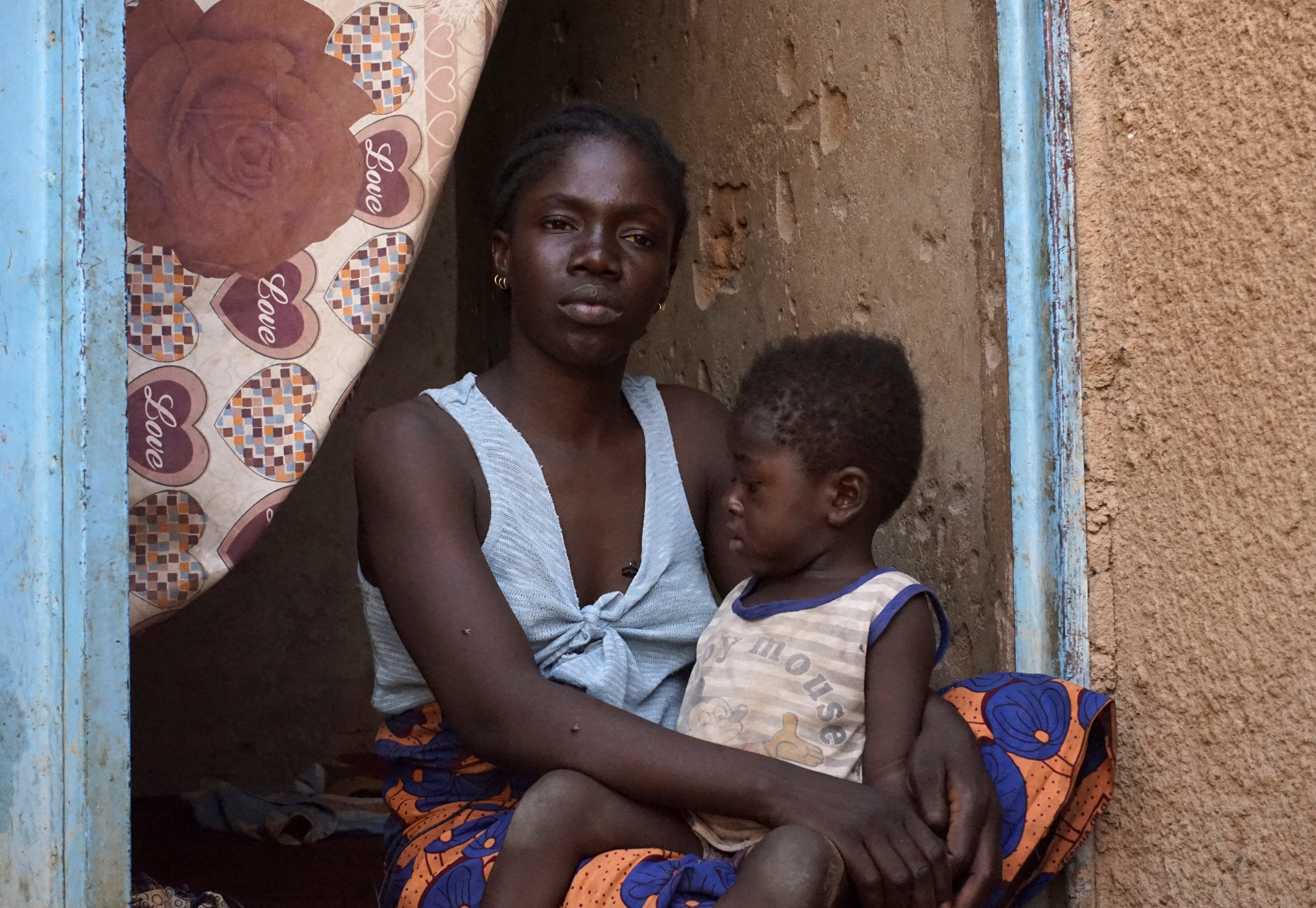
World Chevron

Blinken to travel to Middle East to press for Gaza ceasefire
U.S. Secretary of State Antony Blinken will travel to the Middle East next week, the U.S. State Department said on Friday, as Washington tries to put pressure on Israel and Hamas to accept a ceasefire proposal that President Joe Biden laid out last week.


IMAGES
VIDEO
COMMENTS
Safari. A safari ( / səˈfɑːri /; from Swahili safari 'journey' originally from Arabic Safar 'to journey') is an overland journey to observe wild animals, especially in Southeast Africa. [1] [2] [3] The so-called "Big Five" game animals of Africa - lion, leopard, rhinoceros, elephant, and Cape buffalo - particularly form an important ...
African wildlife safari companies stuff you with food, so plan on dieting when you get home. Around 20:00 marks dinner time. Sometimes, dinners are in a communal setting, or sometimes, you'll enjoy a private dinner with your party. Dinners are often served with bottomless wine or three or five-course.
This is African safari, an evocative immersion in the wild world, an intimate insight into a wilderness that hasn't been tamed. The best way to think about it is to consider the etymology of safari. It's a Swahili word meaning "journey" and journey is the only adequate descriptive for the experience. It's a journey that connects you ...
Today's safari is a sightseeing trip to a national park in Africa with the primary goal of seeing wildlife. Safaris used to be planned with the intention of hunting big game. The traditional Big Five of Africa—the elephant, lion, rhino, African buffalo, and leopard—are connected to the continent's hunting customs.
The meaning of SAFARI is the caravan and equipment of a hunting expedition especially in eastern Africa; also : such a hunting expedition. How to use safari in a sentence.
The word "safari" itself comes from Swahili - the main language of the people of East Africa. It means "journey, trip" and goes back to the Arabic word "safar" with the same meaning. In Swahili-speaking countries, the term refers to any journey. There is even a common phrase, safari njema! It is a wish for a good and pleasant journey.
A SAFARI is an exciting and adventurous way of seeing the 'real Africa' because it enables you to view a variety of wildlife in their natural habitat. As a result, going on a safari gives you an authentic experience of Africa. Safaris can involve walking through the wilderness, driving in 4×4 vehicles or by flying in light air craft.
An African safari is all this and so much more. You'll be immersed in the wilderness, connecting with all your senses. The journey has already started. Keep reading as this page provides all the essential information about a safari. Hint: it's nothing like a zoo. In Africa, you're going into the wild. An introduction to safari. Safari ...
Key takeaway: The word "safari" originates from the Swahili language and means "journey" or "travel". It has evolved over time to encompass a broader range of activities, including wildlife viewing, photography, and eco-tourism, and is now symbolic of the connection between humans and the natural world in Africa.
Green means go. While every luxury safari offers unforgettable wildlife encounters, there are plenty of options to consider. High-end African trips and settings vary hugely in their atmosphere and ...
SAFARI definition: 1. an organized journey to look at, or sometimes hunt, wild animals, especially in Africa: 2. an…. Learn more.
Safari definition: a journey or expedition, for hunting, exploration, or investigation, especially in eastern Africa.. See examples of SAFARI used in a sentence.
The meaning of 'Safari'. Safari is a Swahili word that means 'journey'. It originally emerged from the Arabic noun 'safar', which means travel, journey, or trip. The verb 'to travel', when translated in Swahili, is 'Kusafiri'. In its original context, safari referred to the long travel distances people would undertake for ...
Hot Air Balloon Safari. For those looking for a truly unique experience, a hot air balloon safari may be just the thing. These safaris offer a bird's-eye view of the landscape and wildlife below, providing a different perspective than a ground-based safari. Hot air balloon safaris are typically conducted early in the morning when the air is ...
A safari is a journey. In the broadest sense, to go on safari is simply to travel. More specifically, a safari is a journey that involves going into nature to watch wild animals. On safari in Africa. The roots of the word safari are Arabic (and later Swahili), but the modern concept of safari originated in Africa.
SAFARI meaning: 1. an organized journey to look at, or sometimes hunt, wild animals, especially in Africa: 2. an…. Learn more.
The meaning of the word 'safari' has changed over the last few hundred years. The term 'safari' originally referenced large scale game hunts, with participants often hunted Africa's 'big five,' which includes the lion, leopard, elephant, rhinoceros, and Cape buffalo. These animals were on the verge of extinction by the late 1700s.
Practically speaking, an African safari is a vacation or tour to a wildlife reserve in an African country for the purposes of seeing and photographing a range of wildlife in their natural habitat, in order to observe their natural way of life. African safaris are about immersing oneself in nature and observing wildlife go about their daily life ...
This serves as your guide to key considerations when going on your first African safari. With over 25 years of experience, we are well-equipped to provide you with invaluable insights. Venturing to Africa for the first time is an indescribable journey. It is a continent overflowing with enchantment - from its breathtakingly diverse landscapes ...
10. Hideout Safari Experiences. Experience the Best Types of African Safaris. 1. Guided Game Drives. Game drive in Kruger National Park, South Africa. Stepping into an open 4x4 safari vehicle, you may get a sense that something quite unique is about to begin. The optimum viewing platform, a game drive is not only the most popular way to ...
First, the word safari originated from the word "safar", which is an Arabic verb that roughly translates to mean "to make a journey.'". From there, you get the noun "safariya," or journey and then to safari which is actually a Swahili synonym of the Arabic word. Clearly, in this original definition, you do not get connotations of ...
Green Season: This safari term is a best-kept secret and refers to a specific period in Africa that falls within the warm, rainy months.This is the perfect time to explore a country at its greenest and quietest, when nature is in its fullest bloom. Unlike the dry season, the green season is considered a low period for safari travel.
A self-drive safari is cheaper than an organized ride and children of any age can participate without restrictions. A self-drive safari is a great way to spend a day with the kids. What is a Tse Tse Fly. The Tse Tse Fly is a type of fly that is found in Africa and is known for spreading the disease Trypanosomiasis, also known as sleeping sickness.
Safari njema [ sah-FAHR-ee en-JEM-ah] Safari means "to travel," and njema means "good." Safari njema roughly means "Have a nice trip!" Simba [ SIM-bah] "Lion." Twende [ TWEHn-deh] "Let's go." Your guide may say this whenever you're heading out for your next wildlife drive, meal or lodge. Common Locations in Tanzania
Africa is blessed with some of the rarest and most beautiful animals in the world — a fact that entices tourists to book safaris year-round. But safaris only scratch the surface of what the ...
Megan Gilbert. I went on an epic two-week safari in South Africa's famous Kruger National Park for about $50 a day. I camped beneath the stars and saw elephants right from my tent. Driving our own ...
The ANC won just 40% of votes, by far its worst result since democratic elections began in 1994 after the end of apartheid and leaving it short of a majority in parliament. Some political analysts ...
Yet in a country with a painful history of codified racism - apartheid - where white South Africans make up just 7% of the population, the DA is struggling to shake off an image as a party of rich ...
A sense of the mayhem MK would bring can be found in KwaZulu-Natal, South Africa's second-most populous province, where the party seems on track to win about 46% of the votes. Keeping it out of ...
The African National Congress is leaning towards trying to form a government of national unity for South Africa, it said on Wednesday, but the second-largest party said it would not join a ...